
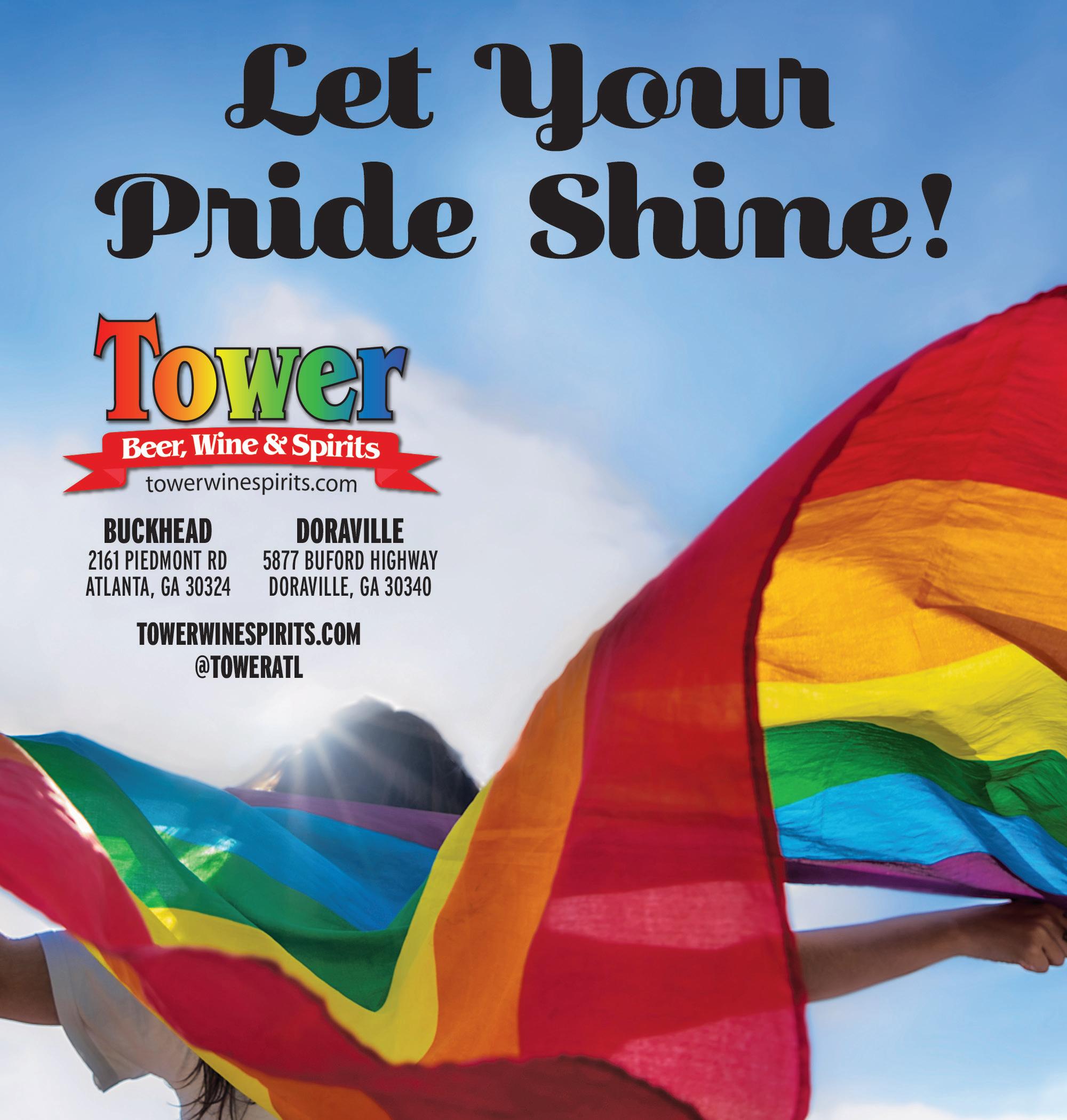
About the cover:
Cover collage image by Rob Boeger
TheGeorgiaVoice.com
PO Box 77401 • Atlanta, GA 30357
P: 404-815-6941; F: 404-963-6365



Business
Principal/Publisher: Tim Boyd tboyd@thegavoice.com
Editorial
Editor: Katie Burkholder kburkholder@thegavoice.com
Editorial Contributors:
Sukainah Abid-Kons, Eric Burkett, Melissa Carter, Syd Clark, Jim Farmer, Buck Jones, Cynthia Salinas-Cappellano, Luke Gardner, María Helena Dolan, David Holland, Jake Jonez, Lisa Keen, Adalei Stevens, Craig Washington
Production
Art Director: Rob Boeger rboeger@thegavoice.com
Sales
Sales Executive: Dixon Taylor dtaylor@thegavoice.com









Sales Executive: Jim Brams jbrams@thegavoice.com
Sales Executive & Photographer: Russell Bowen-Youngblood russ@alphabetsoupmarketing.com
Business Advisor: Lynn Pasqualetti

Financial Firm of Record: HLM Financial Group
National Advertising: Rivendell Media • 908-232-2021 sales@rivendellmedia.com
Publisher Emeritus: Chris Cash
Fine Print
All material in Georgia Voice is protected by federal copyright law and may not be reproduced without the written consent of Georgia Voice. The sexual orientation of advertisers, photographers, writers and cartoonists published herein is neither inferred nor implied. The appearance of names or pictorial representation does not necessarily indicate the sexual orientation of that person or persons. We also do not accept responsibility for claims made by advertisers.
Unsolicited editorial material is accepted by Georgia Voice, but we do not take responsibility for its return. The editors reserve the right to accept, reject, or edit any submission. Guidelines for freelance contributors are available upon request. A single copy of Georgia Voice is available from authorized distribution points. Multiple copies are available from Georgia Voice office only. Call for rates. If you are unable to reach a convenient free distribution point, you may receive a 24-issue mailed subscription for $99 per year. Checks or credit card orders can be sent to Tim Boyd, tboyd@thegavoice.com
Postmaster: Send address changes to Georgia Voice, PO Box 77401, Atlanta, GA 30357. Georgia Voice is published twice a month by Georgia Voice, LLC. Individual subscriptions are $99 per year for 24 issues. Postage paid at Atlanta, GA, and additional mailing offices.
The editorial positions of Georgia Voice are expressed in editorials and in editor’s notes. Other opinions are those of the writers and do not necessarily represent the opinion of Georgia Voice and its staff.
To submit a letter or commentary: Letters should be fewer than 400 words and commentary, for web or print, should be fewer than 750 words. Submissions may be edited for content and length, and must include a name, address, and phone number for verification. Email submissions to editor@thegavoice.com or mail to the address above.
COMING BACK WITH JOY
Jamie Fergerson, Executive Director of the Atlanta Pride Committee
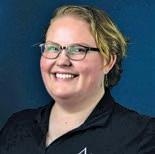

Writing the guest editorial for Atlanta Pride week sounded quite simple when Tim Boyd asked me to do it several months ago, but as Pride events drew near and I sat down to write, the task suddenly felt heavy. Procrastinating and hoping an idea would hit didn’t get the job done, so I texted two of my most trustworthy advisors — my best friend, Rod, and my board chair, Wil, both of whom are brilliant humans and skilled writers. I said, “I want to write about how the last three years have given us, individually and collectively, a chance to decide what’s most important to us and act accordingly. And about our responsibility to do that. But I want to say it with sunshine. And a Pride preview.” They agreed that it was a daunting task.
The 2022 Atlanta Pride Festival and Parade will be my eighth as the Executive Director of Atlanta Pride, but only my sixth in-person festival in the role. Our last in-person event in 2019 was wonderfully successful with high attendance and more diversity in both attendees and programming than ever before. We managed to bank enough money to set us up for what was supposed to be a spectacular celebration the next year — Atlanta Pride’s 50th anniversary. Among other things, there were going to be fireworks.
As you now know, 2020 had other plans. We found ourselves amid a pandemic and an economic and health care crisis that
disproportionately impacted LGBTQ individuals. The community banded together, and the Atlanta Pride Committee (APC) produced an online festival with entertainment and educational opportunities viewed by almost as many people as we would have expected at the in-person event. We celebrated together even though we remained physically distant to keep ourselves and each other safer and support the health care workers and first responders on the frontlines of the COVID-19 pandemic.
In many ways, 2021 was harder. Everyone wanted to gather again. We were pandemic fatigued. Divisive politics and divergent resources led to differing opinions on whether or not the world should reopen despite the pandemic and death rates as high or higher than the year before. When Atlanta Pride chose to cancel the 2021 in-person festival, we were not met with the same collective support we received in 2020 — even though the majority of Americans and Atlanta Pride attendees surveyed said they were not ready to return to festivals as normal. While most people were understanding, some people were angry. I get it. I was angry. However you felt about it, I can assure you that no one was more upset at canceling than the people who had been investing their days and lives into planning the event all year. But, as a nonprofit community organization charged with promoting the wellness of our community, we could not responsibly proceed and put lives at risk. We aren’t party promoters and our values called us to use our power in a way aligned with our mission even when some members of our community disagreed.
As we approach the 2022 Atlanta Pride Festival and Parade, I find myself holding my breath too often. How can I best lead us through a responsible event even as we are still battling high COVID-19 rates and now monkeypox, too? How do we meet our mission AND keep people safe? As Wil often reminds me, the mantle of leadership is heavy, and making hard decisions is rarely popular. And as Rod reminded me as I sat down to write, “all of the times our community got sick and tired and acted up in situations that seemed hopeless … No matter what, we just keep going and turning hopelessness into potential.” Through the advice of my friends, I’m reminded that all we can do is keep going and use our power for good.
From Milwaukee’s Black Nite Brawl to the Stonewall uprising to the ongoing AIDS epidemics to current attacks on transgender youth, voter rights, and our bodily autonomy, all we can do is use our power for good and seek joy in that struggle. As we begin Atlanta Pride week, I invite you to join us in both the work and the joy of Pride. This weekend, thousands of people will be connected to HIV testing and care. Many will receive monkeypox, COVID, or flu vaccines. People disconnected from community will find groups and faith institutions that welcome them as their whole selves. We’ll register people to vote, find fellowship in movement or sobriety, and create safer spaces for both youth and adults coming out. We’ll also dance. We’ll sing and gather, celebrating our return to an in-person reunion. We will remember that our joy is our justice and that our rainbows are a promise that we’ll always come through dark times, together.
Join us online: facebook.com/thegavoice twitter.com/thegavoice instagram.com/thegeorgiavoice youtube.com/user/GAVoice georgiavoice VOLUME 13• ISSUE 14
GUEST EDITORIAL THEGEORGIAVOICE.COM OCTOBER 7, 2022 EDITORIAL 3
IMPORTANT FACTS FOR BIKTARVY®
MOST IMPORTANT INFORMATION ABOUT BIKTARVY
BIKTARVY may cause serious side e ects, including:
Worsening of hepatitis B (HBV) infection. Your healthcare provider will test you for HBV. If you have both HIV-1 and HBV, your HBV may suddenly get worse if you stop taking BIKTARVY. Do not stop taking BIKTARVY without first talking to your healthcare provider, as they will need to check your health regularly for several months, and may give you HBV medicine.
ABOUT BIKTARVY
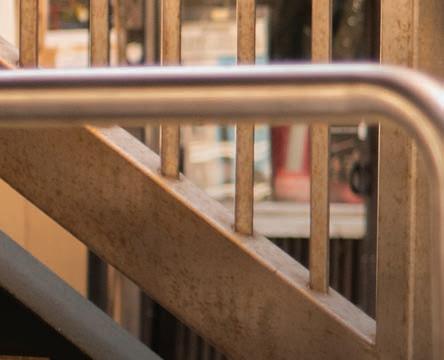
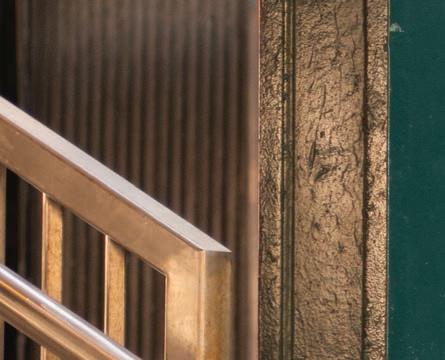

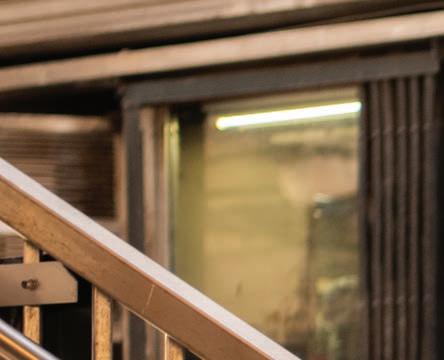
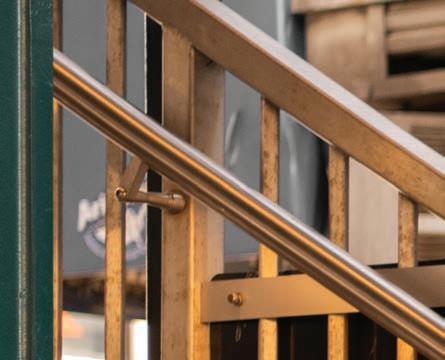
BIKTARVY is a complete, 1-pill, once-a-day prescription medicine used to treat HIV-1 in adults and children who weigh at least 55 pounds. It can either be used in people who have never taken HIV-1 medicines before, or people who are replacing their current HIV-1 medicines and whose healthcare provider determines they meet certain requirements.
BIKTARVY does not cure HIV-1 or AIDS. HIV-1 is the virus that causes AIDS.
Do NOT take BIKTARVY if you also take a medicine that contains:
dofetilide
rifampin

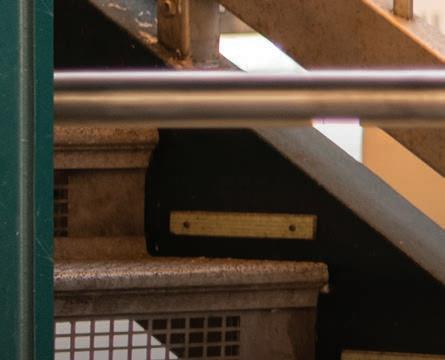
any other medicines to treat HIV-1
BEFORE TAKING BIKTARVY
Tell your healthcare provider if you:
Have or have had any kidney or liver problems, including hepatitis infection.
Have any other health problems.
Are pregnant or plan to become pregnant. It is not known if BIKTARVY can harm your unborn baby. Tell your healthcare provider if you become pregnant while taking BIKTARVY.
Are breastfeeding (nursing) or plan to breastfeed. Do not breastfeed. HIV-1 can be passed to the baby in breast milk.
Tell your healthcare provider about all the medicines you take:
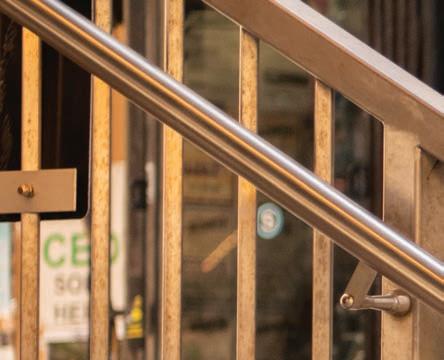
Keep a list that includes all prescription and over-the-counter medicines, antacids, laxatives, vitamins, and herbal supplements, and show it to your healthcare provider and pharmacist.
BIKTARVY and other medicines may a ect each other. Ask your healthcare provider and pharmacist about medicines that interact with BIKTARVY, and ask if it is safe to take BIKTARVY with all your other medicines.
POSSIBLE SIDE EFFECTS OF BIKTARVY
BIKTARVY may cause serious side e ects, including:
Those in the “Most Important Information About BIKTARVY” section.



Changes in your immune system. Your immune system may get stronger and begin to fight infections that may have been hidden in your body. Tell your healthcare provider if you have any new symptoms after you start taking BIKTARVY.
Kidney problems, including kidney failure. Your healthcare provider should do blood and urine tests to check your kidneys. If you develop new or worse kidney problems, they may tell you to stop taking BIKTARVY.
Too much lactic acid in your blood (lactic acidosis), which is a serious but rare medical emergency that can lead to death. Tell your healthcare provider right away if you get these symptoms: weakness or being more tired than usual, unusual muscle pain, being short of breath or fast breathing, stomach pain with nausea and vomiting, cold or blue hands and feet, feel dizzy or lightheaded, or a fast or abnormal heartbeat.
Severe liver problems, which in rare cases can lead to death. Tell your healthcare provider right away if you get these symptoms: skin or the white part of your eyes turns yellow, dark “tea-colored” urine, lightcolored stools, loss of appetite for several days or longer, nausea, or stomach-area pain.
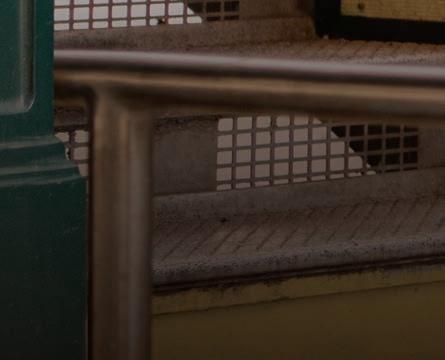


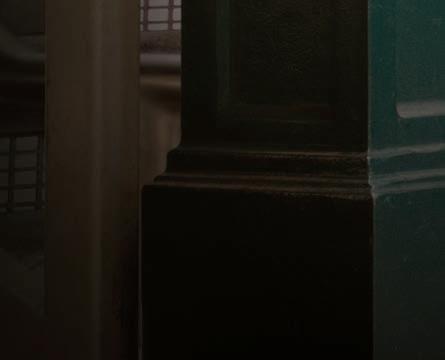


The most common side e ects of BIKTARVY in clinical studies were diarrhea (6%), nausea (6%), and headache (5%).
These are not all the possible side e ects of BIKTARVY. Tell your healthcare provider right away if you have any new symptoms while taking BIKTARVY.
You are encouraged to report negative side e ects of prescription drugs to the FDA. Visit www.FDA.gov/medwatch or call 1-800-FDA-1088. Your healthcare provider will need to do tests to monitor your health before and during treatment with BIKTARVY.
HOW TO TAKE BIKTARVY
Take BIKTARVY
GET MORE INFORMATION
1 time each day with or without food.
This is only a brief summary of important information about BIKTARVY. Talk to your healthcare provider or pharmacist to learn more. Go to BIKTARVY.com or call 1-800-GILEAD-5 If you need help paying for your medicine, visit BIKTARVY.com for program information.
This is only a brief summary of important information about BIKTARVY and does not replace talking to your healthcare provider about your condition and your treatment. (bik-TAR-vee) BIKTARVY, the BIKTARVY Logo, GILEAD, the GILEAD Logo, GSI, and KEEP ASPIRING are trademarks of Gilead Sciences, Inc., or its related companies. Version date: February 2021 © 2022 Gilead Sciences, Inc. All rights reserved. US-BVYC-0085 02/22 US_BVYC_0085_BIKTARVY_B_10x10-5_GeorgiaVoice-Dimitri_r1v2jl.indd All Pages



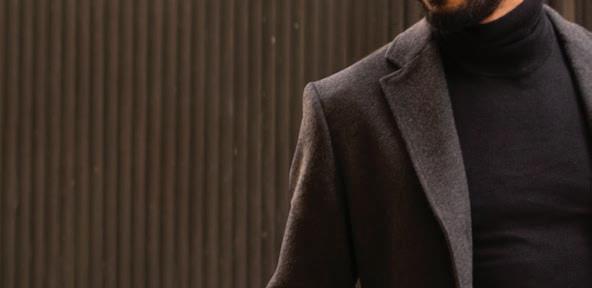


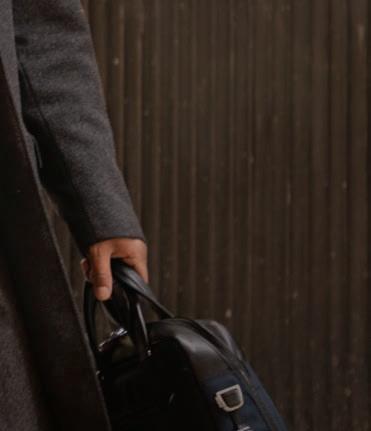

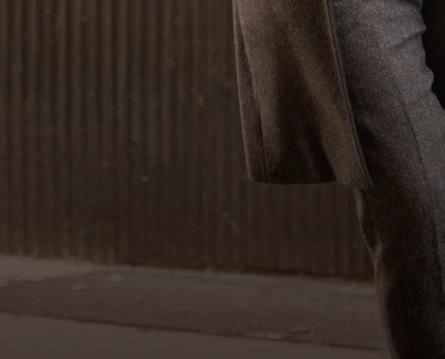





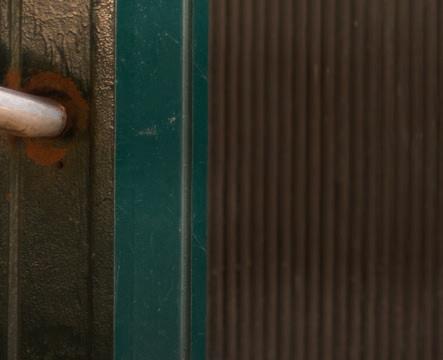




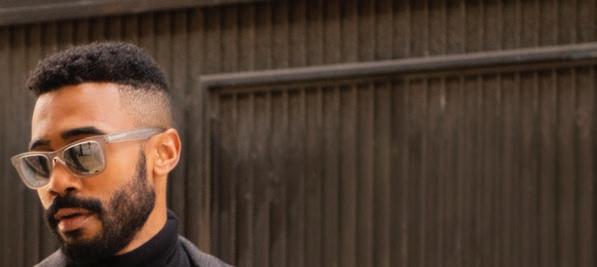






KEEP ASPIRING. IQVIA NPA Weekly, 04/19/2019 through 05/28/2021. #1 PRESCRIBED HIV TREATMENT * BIKTARVY® is a complete, 1-pill, once-a-day prescription medicine used to treat HIV-1 in certain adults. BIKTARVY does not cure HIV-1 or AIDS. Ask your healthcare provider if BIKTARVY is right for you. Because HIV doesn’t change who you are. ONE SMALL PILL, ONCE A DAY Pill shown not actual size (15 mm x 8 mm) | Featured patient compensated by Gilead. Please see Important Facts about BIKTARVY, including important warnings, on the previous page and visit BIKTARVY.com. Scan to see Dimitri’s story. DIMITRI LIVING WITH HIV SINCE 2018 REAL BIKTARVY PATIENT 6/30/22 12:22 PM
Staff reports
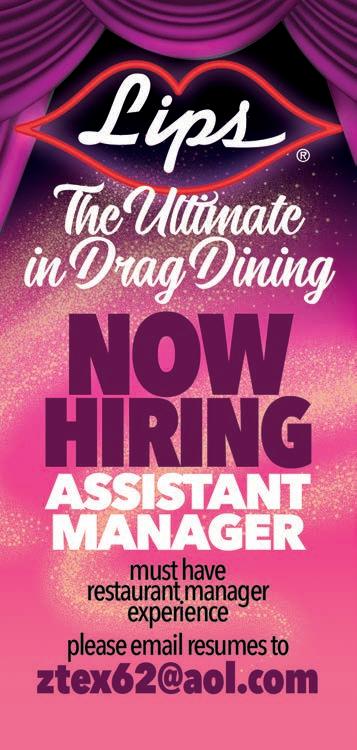
Read these stories and more online at thegavoice.com
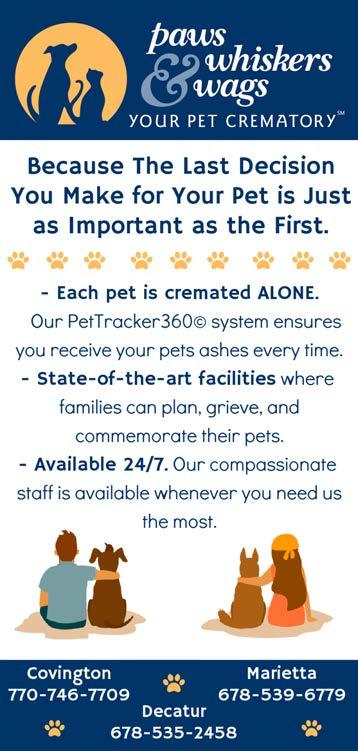
Rep. Pocan Introduces Legislation to Create National LGBTQ History Museum

Rep. Mark Pocan (D-Wis.) has introduced legislation that would set up the process to create a National Museum of American LGBTQ History & Culture, potentially as an official site within the Smithsonian Institution in Washington, D.C.
Pocan, one of nine openly gay members of the U.S. House and co-chair of the LGBTQ Equality Caucus, said in a statement the measures are an effort to preserve LGBTQ history “as our community faces unprecedented attacks and attempts to erase our history.” The pair of bills is H.R.9070 and H.R.9071.
“It is vital to remember our collective past – particularly when certain states seek to constrain and repeal existing rights by passing bills that harm LGBTQ youth and our community at large,” Pocan said. “Let’s tell these stories, and honor the many contributions the LGBTQ community has made to this nation with a museum in Washington, D.C.”
The first bill, according to a news statement, would create an eight-member commission of individuals with expertise in museum planning or LGBTQ research and culture “to look into the viability of establishing such a facility in the nation’s Capital.”
Among other things, the commission would be charged with recommending a plan on action for museum, including fundraising for the museum, and submitting to Congress a plan for construction of the museum, the statement says.
The bill would also instruct the commission to address whether the museum should be part of the Smithsonian Institution, based in the nation’s capital and the world’s largest museum and research complex, per the news statement. The full study, the statement says, would have to be completed in 18 months.
The second bill, according to a news statement, would be eligible for consideration by Congress after the commission completes
its work and issues its recommendations and allow for formal creation of the museum. More than 50 lawmakers, including all nine openly gay members of the U.S. House, cosponsor the legislation.
Members of Congress Call for Gender-Neutral Travel Documents
California Congressman Adam Schiff and 18 other House Democrats on Tuesday sent a letter to the State Department and the Department of Homeland Security that encourages them to make the “X” gender marker available for all U.S. passport applications and Trusted Travelers programs.
A spokesperson for Schiff told the Washington Blade in an email:
“The letter was inspired by a constituent who reached out to our office trying to get an emergency passport appointment with an ‘X’ gender marker — right now you can only get rush passport service with the ‘X’ gender marker at one passport agency in D.C., so if they had gone through the L.A. passport agency, they only would have been able to get a passport with the M or F gender marker. Our office was able to resolve the case successfully, but it inspired our team to figure out a legislative solution that will help LGBTQI+ individuals access these services in the future.”
Secretary of State Antony Blinken in March
2021 announced passports with an “X” gender marker will be available starting April 11.
Dana Zzyym, an intersex U.S. Navy veteran who identifies as non-binary, in 2015 filed a federal lawsuit against the State Department after it denied their application for a passport with an “X” gender marker. Zzyym last October received the first gender-neutral American passport.
In Tuesday’s letter, the House members noted that while State Department and the Department of Homeland Security made history by expanding the gender marker options available for U.S. passports and TSA PreCheck applications, creating a new “X” marker for individuals who identify as unspecified or another gender identity.
The members and concerned LGBTQ and intersex advocacy groups who endorsed the letter are asking the State Department and the Department of Homeland Security to ensure:
• Solidified and accelerated implementation of the “X” gender marker option for passport cards, emergency passports printed at embassies and consulates, Consular Reports of Birth Abroad (CRBAs) and on Trusted Traveler Programs forms
• A public date by which the “X” gender marker will be available for applicants for all passport services and application forms
6 NEWS OCTOBER 7, 2022 THEGEORGIAVOICE.COM
NEWS BRIEFS
Rep. Mark Pocan (D-Wis.) has introduced legislation seeking to create an LGBTQ history museum. PHOTO BY WASHINGTON BLADE/MICHAEL KEY

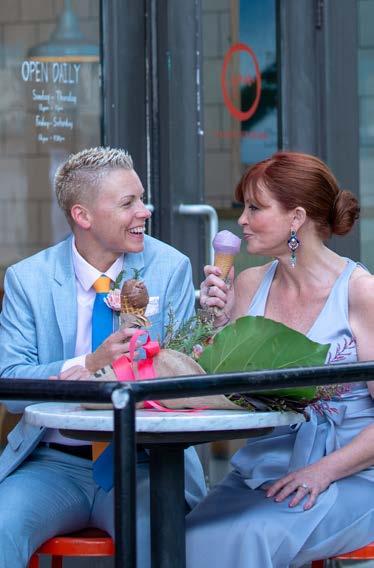


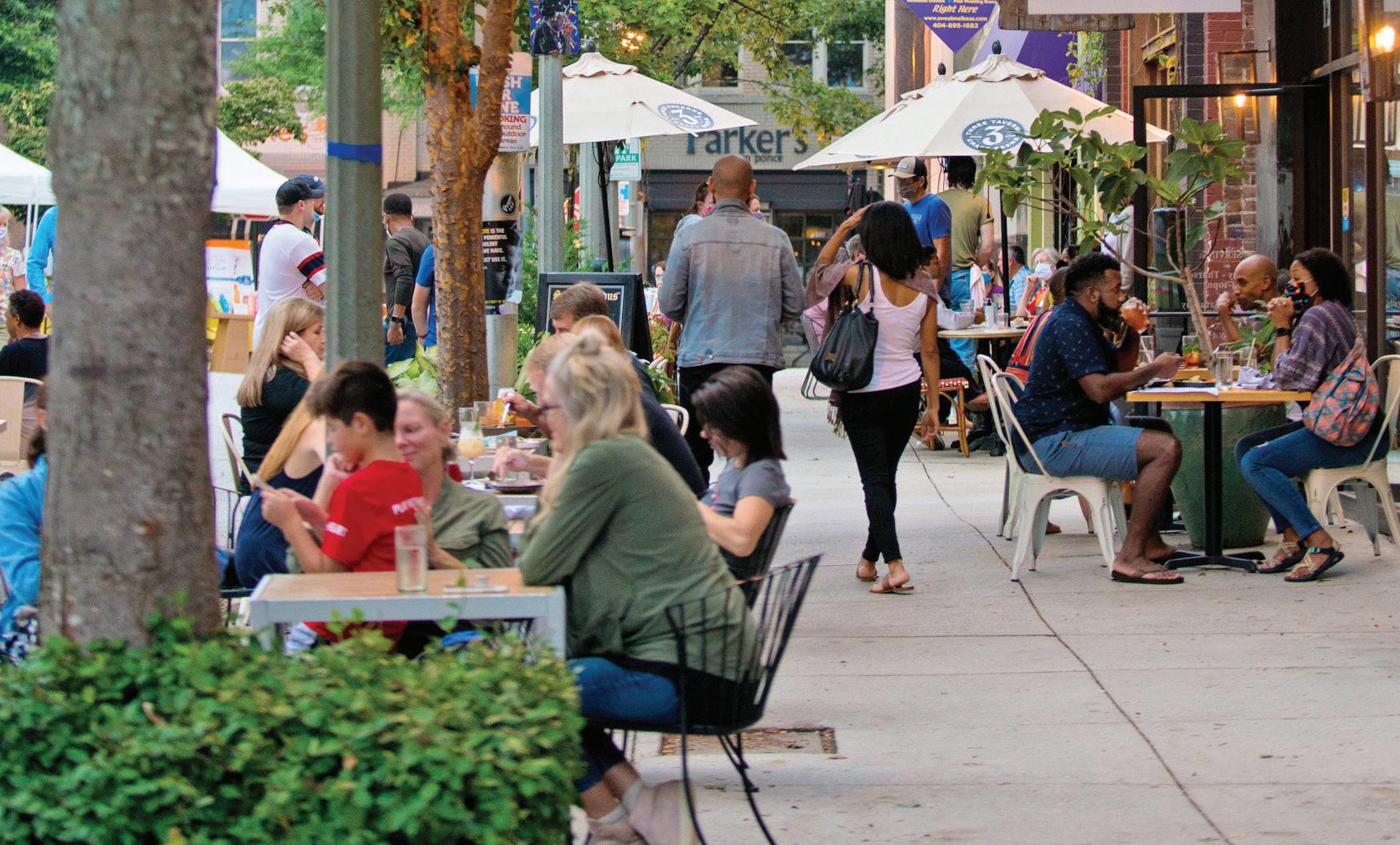
“Best of Atlanta” picks for pasta, oysters, Indian street food, tapas, sushi and more. IBERIAN PIG MAKE IT A STAY! Book a room downtown – steps away from local shops, restaurants, live music and MARTA access. HAMPTON INN & SUITES • 116 Clairemont Ave. COURTYARD BY MARRIOTT • 130 Clairemont Ave. Buzz-worthy cocktails and local craft brews. COURTYARD by MARRIOTT EAST COURT SQUARE CELEBRATE with PRIDE in DECATUR VISITORS CENTER 113 Clairemont Ave. Decatur 30030 visitdecaturga.com JENI’S SPLENDID ICE CREAMS
Is This the End of Monkeypox?
David P. Holland, MD, MHS
The news on monkeypox over the past month has been very positive: Numbers of new diagnoses have dropped significantly, vaccines ae easily available (at least in Metro Atlanta), and Tpoxx (the treatment for sever monkeypox) has become much more widely available. Taken together, there is definitely room for optimism, but we aren’t done yet. Now is not the time to back off our efforts; instead, it’s time to press forward even harder in an effort to actually eliminate monkeypox from the United States.
Numbers of monkeypox diagnoses are indeed declining both locally and nationally, but not to zero — in fact, they have mostly leveled off. Coupled with a reduced demand for vaccine, this low-level persistence of the disease means that reaching a state of elimination will mean more work, not less. However, by continuing to accelerate the response instead of slowing it down, we can push the case rate even lower to the point where the epidemic cannot sustain itself.
Vaccination remains the single most powerful tool we have to prevent new cases. Of course, as the number of cases decreases, demand for vaccine decreases as well, so the challenge becomes generating new demand. Doing so requires bringing the vaccine to the people instead the other way around. Pop-up vaccination sites at venues serving communities most likely to encounter monkeypox are one of the best ways to reach people, but these activities require more resources and staff. It is essential that we maintain or increase funding for monkeypox vaccine efforts until the epidemic is ended.
Fortunately, we know that vaccines work. A recent report from the CDC showed a 14-fold reduction in monkeypox incidence among people who had received at least one dose of the vaccine. This is excellent news in that it indicates that the vaccine actually
“Numbers of monkeypox diagnoses are indeed declining both locally and nationally, but not to zero — in fact, they have mostly leveled off. Coupled with a reduced demand for vaccine, this low-level persistence of the disease means that reaching a state of elimination will mean more work, not less. However, by continuing to accelerate the response instead of slowing it down, we can push the case rate even lower to the point where the epidemic cannot sustain itself.”
does prevent monkeypox. However, many people reading the report may be under the mistaken impression than a single dose is enough. This is not true — two doses are needed to get full protection, so definitely go back and get your second shot.

That said, some Black and Brown individuals have experienced dark spots (hyperpigmentation) at the site of intradermal vaccination on their forearm, and they may be reluctant to get a second dose for fear of having another spot or making the old one worse. This is definitely a significant problem, but there are ways around it.
First of all, it’s possible to get the vaccine at a
site other than the forearm. The upper back or the shoulder are also acceptable locations, and while hyperpigmentation is not less likely at these sites, they are usually covered with clothing. This might make them both less noticeable and also protect them from the sun, which is important to make them eventually resolve. More tips on dealing with this problem can be found on the Fulton County Board of Health’s website at fultoncountyga. gov/monkeypoxoutbreak.
IF you haven’t received a monkeypox vaccine, please check out the website above to determine if you are among the groups that would benefit from the vaccine. If you are, we encourage you to get vaccinated.
— David P. Holland, MD, MHS
The vaccine is safe, effective, and free, and we can work with you to find the best administration site for you. They are available at your local health department; contact them directly or go to gta-vras. powerappsportals.us/en-US/ to set up an appointment.
We can’t stop now. Although the end is in sight, we must increase our efforts until we get to zero.
David Holland is an Associate Professor at the Department of Medicine, Division of Infectious Diseases at Emory University and the Chief Clinical Officer for the Fulton County Board of Health.
8 NEWS OCTOBER 7, 2022 THEGEORGIAVOICE.COM HEALTH NEWS
PHOTO BY SHUTTERSTOCK.COM / ANGELLODECO
Know the when, where, and how. Then vote.

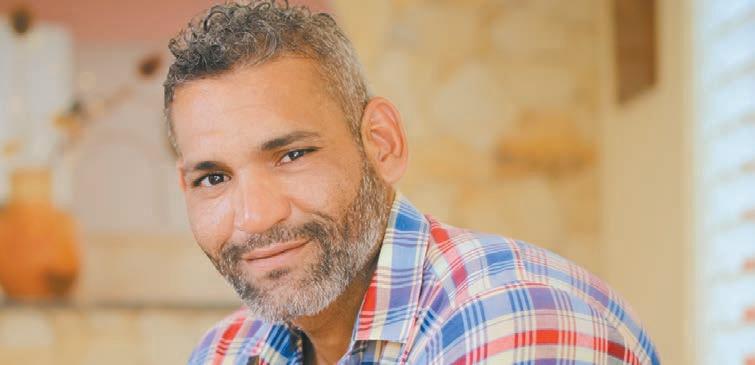
Voting is your most important right. It gives you the power to decide what our future looks like. But you have to be in the know to vote. Election laws and voting places can change. Thatʼs why AARP Georgia has collected all the most up-to-date election information to make sure that the voices of voters 50-plus are heard on November 8. Make sure you know how to register to vote, where to vote in person, what the rules are for absentee or early voting, and all the key voting deadlines. Get the latest voting information for Georgia at a aarp.org/GAvotes

Georgia facebook.com/AARPGeorgia @AARPGA aarp.org/GAPaid for by AARP
The Eagle Returns in Time for Pride
Jim Farmer
Richard Ramey was almost ready to call it quits. The owner of the Atlanta Eagle had been trying to find a new home for the nightclub for two years, scouring Midtown looking at location after location with no luck.
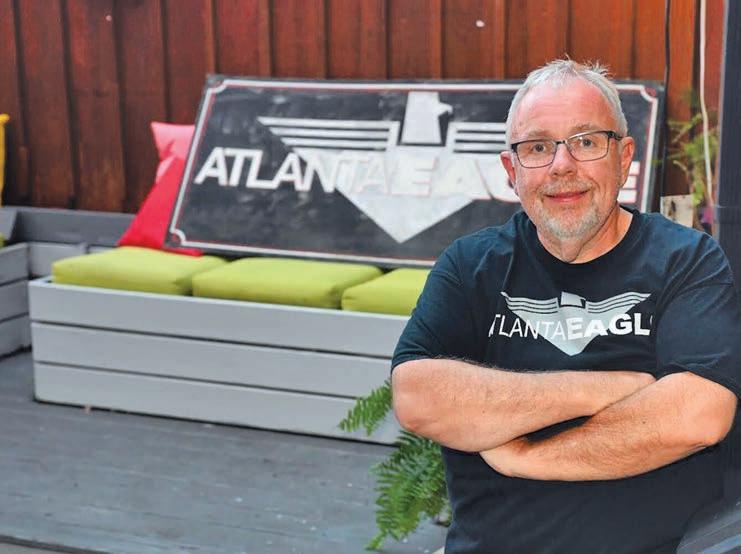
“It was taking a toll on me,” he told Georgia Voice. “It was like hitting brick walls.”
Then, at what he deems “the perfect time,” he got an unexpected phone call — while he was on vacation — that led to his new location at 1492 Piedmont Road in Ansley Square, the previous site of Midtown Moon.
The phone call was from the new owners of that establishment, HV Entertainment out of Houston, who were interested in working with Ramey. They had heard he had been looking at the home of the recently closed bar/ restaurant The Highlander and met with him before any deal was struck, saying that they were specifically looking for their location at 1492 Piedmont Road to be re-branded. “The location is very intriguing, and I wanted it,” Ramey said. “I jumped on it fast.”
The Atlanta Eagle’s new home will be open October 7 for Atlanta Pride weekend. Ramey announced the news via Facebook Live on September 8.
He says he is ecstatic about the new location, especially for the parking it allows.
“I have always enjoyed the property,” Ramey said. “Here you can walk and leave your car and come to the Eagle. At the [old] location you couldn’t.”
The building where the Atlanta Eagle was located was designated as a historic landmark by former Mayor Keisha Lance Bottoms last year. Ramey and the Atlanta Eagle did not own the property, though, and when the landlord did not invite them back, they had to start looking for a new locale.
Richard Ramey COURTESY PHOTO
“I don’t like change, but it can be a good thing,” Ramey said.
The Atlanta Eagle officially closed at the end of November 2020 after COVID-19 ate into business, but Ramey had known for a while they had to move from 306 Ponce De Leon Avenue. He publicly said that the bar would be opening at a new location in 2021, but had no idea it would take until now to find a new site.
The establishment drew national attention when it was raided back in 2009 and eight employees were arrested. After court cases that followed, the City of Atlanta paid almost two million dollars to the victims. The case also led to retraining within the Atlanta Police Department and LGBTQ liaisons.
While he is glad to have a new home, Ramey is not happy that another Atlanta LGBTQ establishment has shut its doors. Midtown Moon closed September 24 after facing eviction and filing bankruptcy earlier this spring.
“I have been very sensitive about that topic,” Ramey said. “It’s devastating when we lose a space. Some people for three years called Midtown Moon their home. I get it. I have called the Atlanta Eagle my home for 35 years. I was a customer the first 10 years before I bought it. I want those people to know they are welcome and have a home. Luckily, we did not lose the space to someone else. It’s still part of the gay community. I am sad to see any business go under. It’s important to preserve as many of them as we can.”
A lot of people do not know it, but when Ramey bought the Atlanta Eagle alongside Robby Kelly 25 years ago, the estate of original owner Jay Evans declared bankruptcy after he passed away and the bar was set to close in a week. They were able to keep the establishment afloat, though. One of the founding members of Southern Bears, Ramey knew he wanted to be a place that was welcoming.
“Fat and hairy men were looked down on back then,” he said. “It was important for
us to have a safe space. That is why it’s so important to me.”
All the organizations that used to call Atlanta Eagle home and host events there, such as Onyx, Panther L/L, and Southern Bears, will be returning.
“It’s all about community for me,” Ramey said.
He and his team are already starting renovations. There will be at least three phases, the first of which is getting the new space open. Phase Two will entail getting the legendary Atlanta Eagle dance floor open upstairs as part of the entertainment level, and the third is connecting to the Beltline.
Expecting huge crowds for the reopening weekend, Ramey will have a block party Pride weekend, with DJs in the parking lot. He’ll also have a presence in the Pride parade.
The new Atlanta Eagle will also welcome drag. Drag legend Charlie Brown will be part of a new Saturday Night Cabaret, starting October 8 and running from 9pm to 11pm.
Ramey promises the new location will look at lot different from Midtown Moon, and he is trying hard to replicate certain elements of the beloved old location.
“It will be a new space you can call home,” he said. “It’s going to be great for the community.”
10 NEWS OCTOBER 7, 2022 THEGEORGIAVOICE.COM
LOCAL NEWS
“I don’t like change, but it can be a good thing.”
— Richard Ramey
Featuring work made over the past two decades, this exhibition is the first museum survey dedicated to Deana Lawson. Working primarily in photography, Lawson investigates and challenges conventional representations of Black identities and bodies. Her work evokes a range of photographic histories and styles, including family albums, studio portraiture, and staged tableaux; she also employs documentary pictures and appropriated images.


HIGH MUSEUM OF ART ATLANTA | HIGH.ORG | OCTOBER 7, 2022–FEBRUARY 19, 2023 Deana Lawson is co-organized by ICA/Boston and MoMA PS1 and organized by Eva Respini, Deputy Director for Curatorial Affairs and Barbara Lee Chief Curator, ICA/Boston, and Peter Eleey, Curator-at-Large, UCCA Center for Contemporary Art, Beijing and Shanghai, with Anni Pullagura, Curatorial Assistant, ICA/Boston. PREMIER EXHIBITION SERIES SPONSOR PREMIER EXHIBITION SERIES SUPPORTERS ACT Foundation, Inc. Sarah and Jim Kennedy Louise Sams and Jerome Grilhot BENEFACTOR EXHIBITION SERIES SUPPORTERS Robin and Hilton Howell MAJOR SUPPORT PROVIDED BY
Deana
Lawson (American, born 1979), Hair Advertisement, 2005, pigment print, collection of the artist. Photo courtesy of the artist, Sikkema Jenkins & Co., New York, and David Kordansky, Los Angeles. © Deana Lawson.
Trans Voters Risk Disenfranchisement in Midterm Elections, Report Says
Eric Burkett, Bay Area Reporter courtesy of the National LGBTQ Media Association
Read the full article online at thegavoice.com. The battle over voting rights in the United States has been a long and contentious one, with proponents of tighter regulations — typically Republicans — arguing that increasing identification requirements helps to ensure more secure, fraud-free elections.
The arguments in favor of those regulations generally look like this: allowing people to cast their ballots without a state-issued photo ID, such as a driver’s license or, in the case of Texas, a concealed gun carry permit, means that anyone can vote in someone else’s name, therefore undermining the security of elections in general. It’s an argument that’s gained even greater traction among Donald Trump supporters since the former president lost the 2020 election but falsely continues to insist the election was stolen from him.
Since that acrimonious presidential election, reported Reuters, various states have put in place more than 30 laws restricting access to voting, ranging from tighter voter ID laws to laws further limiting access to mail-in ballots. These efforts have led to greater disagreements between Democrats, who typically favor easier access to the ballot for voters, and Republicans, who continue to push a narrative of widespread voter fraud though there isn’t evidence to support those claims. Even Trump’s former attorney general, William Barr, declared this summer in an interview with the Associated Press that the Justice Department found no evidence of widespread voter fraud that could change the outcome of the 2020 election.
Democrats argue that tighter restrictions are really just an effort to restrict those who go to the polls and that more stringent ID laws are targeted at voters who traditionally vote
Democratic: people of color who are less likely, for a number of reasons, to even have a photo ID.
Another group, however, finds itself affected by these restrictions as well, despite its dramatically lower numbers. Transgender Americans, of whom an estimated 878,300 will be eligible to vote in this November’s election, face enormous struggles to gain access to state-issued photo identification in many states, according to LGBTQ advocates.
“Forty-two states conduct their elections primarily in person at polling places, as opposed to fully by mail,” states a report by the Williams Institute, an LGBTQ think tank based at UCLA School of Law.
Further, more than “697,800 voting-eligible transgender Americans live in these states. An estimated 43 percent of these individuals (296,700) lack identity documents that correctly reflect their name or gender.”
The report, titled “The Potential Impact of Voter Identification Laws on Transgender Voters in the 2022 General Election,” was issued earlier this month.
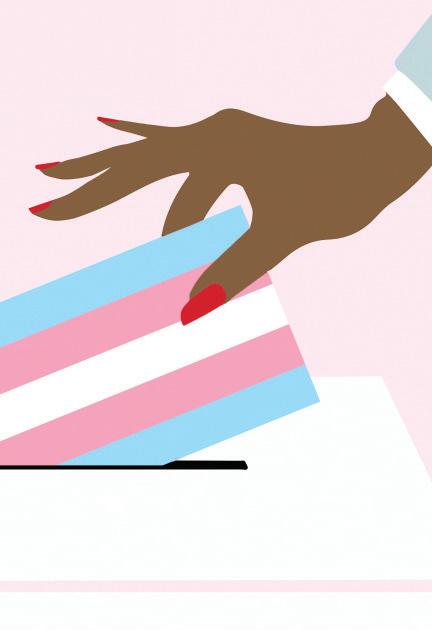
And, while many of those transgender voters might actually have photo ID, what they don’t have is photo ID that accurately reflects their correct gender identity. In a great many of those cases, obtaining that ID is a huge challenge, particularly as the states in which they live make it harder for them to get that ID.
“These eligible voters could face substantial barriers and potential disenfranchisement in the November 2022 general election,” the report states.
Fixing that problem is no easy task.
“Recently there have been some changes to those policies and they have definitely been made with trans people in mind,” Kathryn O’Neill, lead author of the study, told the Bay Area Reporter. “In places like California, there are positive changes. But there are some states that have made it fully impossible to change your gender on birth certificates.”
Around 414,000 voting-eligible transgender Americans reside in the 31 states that both primarily conduct their elections in person at the polls, and have a voter ID law, according to O’Neill’s report. “Nearly half of these, or 203,700 individuals, do not have an ID that correctly reflects their name and/or gender,” the report states.
Almost 65,000 of those voting-eligible trans individuals live in states with the country’s strictest voter ID regulations, and those people could find themselves up against serious “barriers and potential disenfranchisement in the November 2022 general election,” the report states.
Numerous states don’t permit gender marker changes on birth certificates while others require proof of gender-affirming surgery or a court order. Furthermore, meeting all the requirements to update their identification can be costly. For a population “more likely to report living at or near poverty than the U.S. general population,” according to the report, the costs of court orders, obtaining letters from doctors, and simply the costs of IDs themselves, these requirements are beyond their economic means.
But those aren’t the only challenges transgender voters in those states face.
“A lot of where problems arise is from interactions with a poll worker,” said O’Neill. That, coupled with the fact that as many as 46 percent of transgender people in the U.S. report having no ID with their correct name and gender, place trans voters at a tremendous disadvantage. The burden for determining whether someone meets requirements to vote typically falls on poll workers.
One of the ways around this is the institution of a coordinated, national voting policy, with the same voting requirement for voters in all 50 states. Barring that, revising voter ID laws in states with heavier restrictions to allow for more access to the polls among traditionally disenfranchised populations is another possibility. Making it easier for transgender people to obtain ID that properly reflects their gender identity, too, would make a huge difference, the report concluded.
“The first thing to do is start early and get an ID,” said O’Neill. “Those processes take a long time. You also want to look up your state’s policies. If you don’t have an ID they want, you’re out of luck.”
12 NEWS OCTOBER 7, 2022 THEGEORGIAVOICE.COM
IMAGE COURTESY OF GLAAD
NATIONAL NEWS
Supreme Court Opens, LGBTQ ‘303 Creative’
Argument Regarding Free Speech Scheduled
Lisa Keen
Read the full article online at thegavoice.com.
The U.S. Supreme Court sometimes makes significant moves long before it hears arguments in a case. Such is true in a blockbuster LGBTQ case pending before the court in its newly opened 2022-23 session.
In the appeal, 303 Creative v. Elenis, the antiLGBTQ group Alliance Defending Freedom asked the court to decide whether a business could claim a religious exemption to a state law prohibiting discrimination based on sexual orientation in public accommodations. The court declined to answer that question but, instead, accepted the appeal to answer a different question: whether a business could claim a Free Speech right to discriminate.
“This is a case about commercial conduct, not speech,” said Mary Bonauto, GLAD civil rights project director and lead author of a brief urging the court to rule that the Free Speech clause does not exempt businesses from complying with public accommodation laws.
By examining the Free Speech claim, the court is setting up its eventual decision to have “far broader implications” than a religious exemption to civil rights laws, said ACLU attorney Amanda Shanor at a Federalist Society preview September 21. And as Kelsi Corkran, Supreme Court Director at the Institute for Constitutional Advocacy and Protection, said at a Georgetown Law preview, the narrowing of the question will enable the court to decide whether any business can simply articulate “any reason” to refuse serving customers because of their sexual orientation, race, gender, or other protected status.
“If there is a Free Speech right to selectively choose her customers based on the messages [the web designer] wants to endorse,” said
Corkran, “I assume that would apply to any protected characteristic. I think it would apply to a white supremacist who doesn’t want to provide services to people of color.”
That was the assessment of several legal experts on a number of different panels examining the 2022-23 Supreme Court docket. The new session began October 3, and most panels identified the LGBTQ public accommodations case as one of the session’s four major conflicts. Others include voting rights, gerrymandering, and affirmative action.
So far, 303 Creative is also among several LGBTQ-related cases the Supreme Court might take up this session:
303 Creative v. Elenis — This case, which has been accepted for argument (probably in December), could allow any business in the public marketplace (hotels, restaurants, bakeries, web designers, etc.) to refuse service to a customer by claiming to have some personal objection to treating that customer the same as all others. While this case is based on a desire to refuse web design services to same-sex couples, it could undermine civil rights for the wide range of people protected by
anti-discrimination laws. It pits a one-person web design company against Colorado laws (represented by state Attorney General Aubrey Elenis). The appeal seems a strange one for the court to have accepted, in that no same-sex couple has sought the web designer’s services. As longtime marriage equality attorney Evan Wolfson puts it, the case “doesn’t even present a true case or controversy and ought not to be before the Court.” The fact that the court has taken the appeal suggests the 6-3 conservative majority has decided to aggressively pursue the right-wing agenda.
Boston College Law School Professor Kent Greenwood, at an American Constitution Society preview, said he believes the court will rule for the web artist.
Klein v. Oregon: This is a copycat case on a repeat appeal, and the Supreme Court has not yet indicated whether it will take it up. In Klein v. Oregon, the Oregon Court of Appeals ruled that a baker could not cite her religious beliefs in order to violate a state law that prohibits discrimination based on sexual orientation in public accommodations.
The U.S. Supreme Court vacated that state decision in 2019 and asked the lower court to
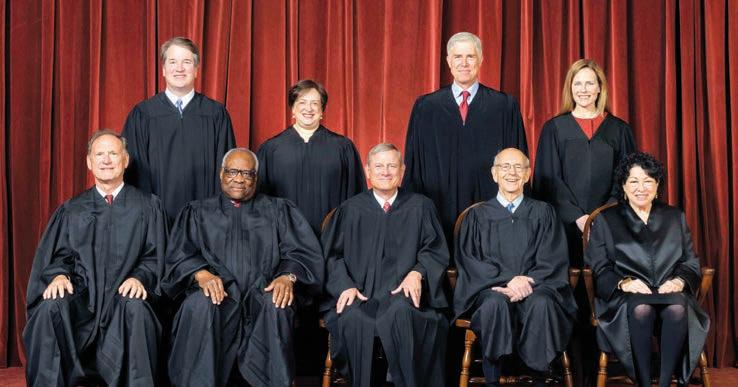
reconsider the case “in light of” Masterpiece Cakeshop v. Colorado. Oregon did and came back with the same decision: A baker could not claim a Free Exercise of religion right to violate a state law against discrimination in public accommodations.
Florida v. NetChoice: In this case, Florida appeals to defend its newly passed law that stops social media from “censoring users based on viewpoint.” LGBTQ groups say that social media groups should be able to ban hate speech because, “Without adequate content moderation policies, digital forums and apps can become breeding grounds for homophobia, bullying (cyber and otherwise), harassment, and misinformation.” The 11th Circuit U.S. Court of Appeals ruled the Florida law violated the First Amendment rights of the social media companies. It cited such Supreme Court precedents as Hurley v. Irish-American Gay, establishing the right of a St. Patrick’s Day parade organizer to ban participation by LGBTQ groups. The Supreme Court has not yet indicated whether it will hear the appeal, but several panelists at preview conferences said the believe there’s a good likelihood it will.
NetChoice v. Texas: Texas and Florida are often dancing together these days and have done so here, with Texas also passing a law to stop social media from banning certain “viewpoints.” This case is still in procedural motions in lower courts, with the latest — a Fifth Circuit order — that allows the law to take effect while the legal challenge winds its way through the courts. NetChoice asked the Supreme Court to vacate the Fifth Circuit’s order and, in an apparent 6 to 3 vote, the court granted that request, keeping the Texas law null for now. Justice’s Samuel Alito, Clarence Thomas, and Neil Gorsuch dissented. The case on the merits of the legal challenge will now proceed.
The Supreme
Court PHOTO VIA SUPREMECOURT.GOV NATIONAL NEWS THEGEORGIAVOICE.COM OCTOBER 7, 2022 NEWS 13
Trans and Nonbinary Atlanta Support Group Offers Community and a Safe Space
Sukainah Abid-Kons
“It was started to create a space where folks could see more examples of nonbinary people hitting these milestones of adulthood, like getting married, having children, and buying a house.”
This is how Sylvan Tomlin describes Nonbinary & Genderqueer Atlanta, a support group for individuals who identify as transgender or otherwise outside the gender binary.
Tomlin, who is one of the organizers of the group, said that the peer-led group gives trans, nonbinary, and genderqueer adults a space each week to support each other, share wins, and cultivate a community.
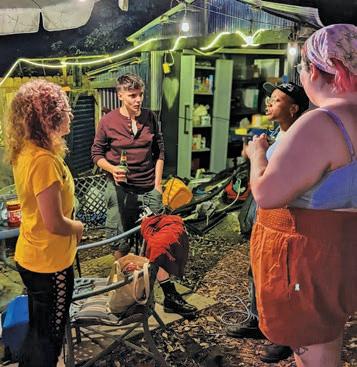
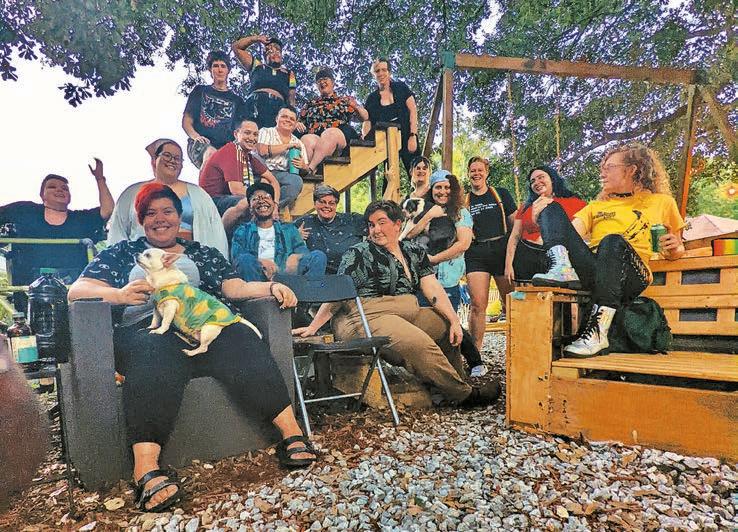
Even in 2022, being a transgender, nonbinary, or gender-nonconforming individual comes with many challenges. Transgender and gender-nonconforming individuals are at higher risk for depression and anxiety, conservative legislation has been disproportionately targeting the rights of transgender people, and data has shown increases in anti-trans hate crimes in recent years.
Founded in 2018, the support group has been “bringing adults outside of the binary together in a safe & affirming space,” according to its Instagram bio, and providing a free resource to Atlantans who exist outside of the gender binary.
Tomlin said that while there are certainly ways that people both in the LGBTQ community and out of it could better support the trans, nonbinary, and genderqueer community, many people have become more accepting over the past few years.
Tomlin described a social landscape where
the trans, nonbinary, and genderqueer community wasn’t always accepted into the LGBTQ community and where cis/het individuals felt that accepting diversity in sexuality was enough.
“I think we’re getting into a place where that is falling out of fashion,” Tomlin said.
Even with this progress, internal and external support is still wanted and needed by this community.
The group’s founder, Jenny Bishop, was interested in creating a community where people could see representation of transgender, nonbinary, or gendernonconforming individuals achieving milestones of adulthood. Bishop had the idea when, in the process of starting a family, they realized that they didn’t know where to start. Tomlin pointed out that, because we don’t see representation of people who are
trans or identify outside the gender binary in the media, lots of people haven’t seen the examples of those like them simply going through normal experiences, such as having a child, that are easier for cis people to see.
“It’s also sort of grounded in the context that, as trans people, more than doctors, more than psychiatrists, we are experts in our own mental and medical health care,” Tomlin added. “There is no greater resource than each other.”
Tomlin also said that many trans and nonbinary people just want a place to hang out and chat: “I think a thing that a lot of people are aching for is […] a place for trans people to just exist and just be outside of their homes that aren’t centered around alcohol and nightlife.”
The groups also allow trans and nonbinary people to share helpful resources and
Founded in 2018, the support group has been “bringing adults outside of the binary together in a safe & affirming space.”
information with each other, such as doctors and clinics that can prescribe or offer hormone therapy and treatments. Even in a city as large as Atlanta, the health care needs of the community are scarcely met; Tomlin said that Atlanta only has about nine doctors that write prescriptions for hormones.
Tomlin said that, despite the various circumstances that continue to make the support group a sought-after resource for trans and nonbinary Atlantans, there are so many positives that come out of the group’s meetings.
“My favorite moments are when I hear that members of the group went and hung out outside of a group meeting,” said Tomlin.
The group has helped create a diverse and supportive community that trans and nonbinary Atlantans can rely on. “We span race and age,” Tomlin said, “and it’s obvious that it’s not something that just appeals to young white people.”
If you are interested in learning more about Nonbinary & Genderqueer Atl, you can check out their Instagram @nonbinary. genderqueer.atl and Facebook page
“Nonbinary and Genderqueer Atlanta”
14 COMMUNITY OCTOBER 7, 2022 THEGEORGIAVOICE.COM
COMMUNITY
Nonbinary & Genderqueer Atlanta support group COURTESY PHOTOS
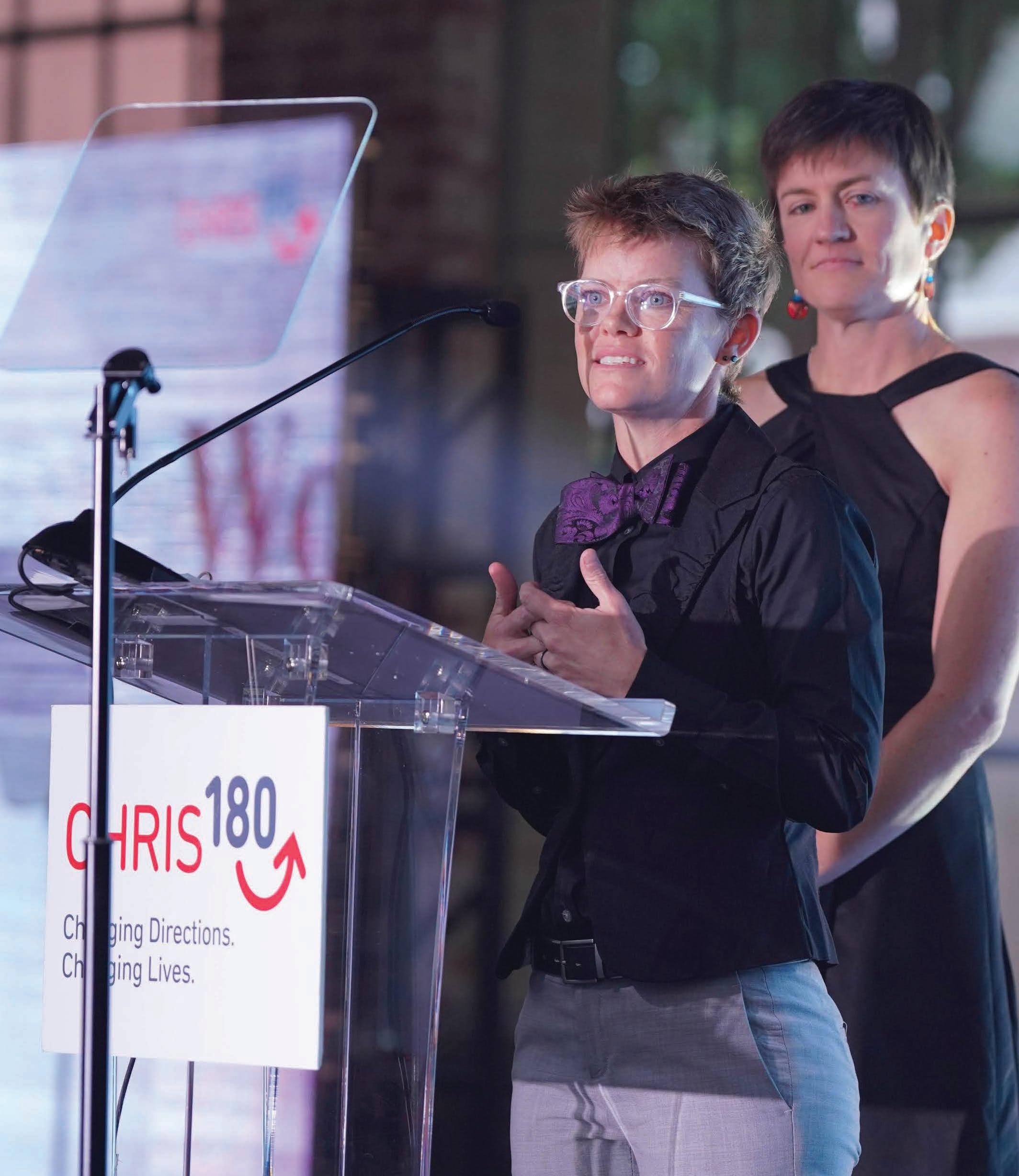
With CHRIS 180, we are living out our values, building a beautiful family, embracing children who need loving community, enabling the growth of healthy, emotionally intelligent children and most importantly--living out our dreams of becoming parents. —Nora & Candace Give at CHRIS180.org Safe Housing • Community • Training •
Chris Cash on Legacy of ‘Southern Voice’ and Induction into the LGBTQ Journalists Hall of Fame
Katie Burkholder
Chris Cash, the founder and Publisher Emerita of Georgia Voice, was inducted into the LGBTQ Journalists Hall of Fame earlier last month.
Cash was chosen for the honor largely for her work with Southern Voice as the original founder, publisher, and executive editor from 1988 to 1997. Along with being the predecessor to Georgia Voice, which was founded by Cash, Laura Douglas-Brown, and Tim Boyd in 2010, SoVo would come to be known as an integral part of Atlanta’s — and the Southeast’s — LGBTQ history.
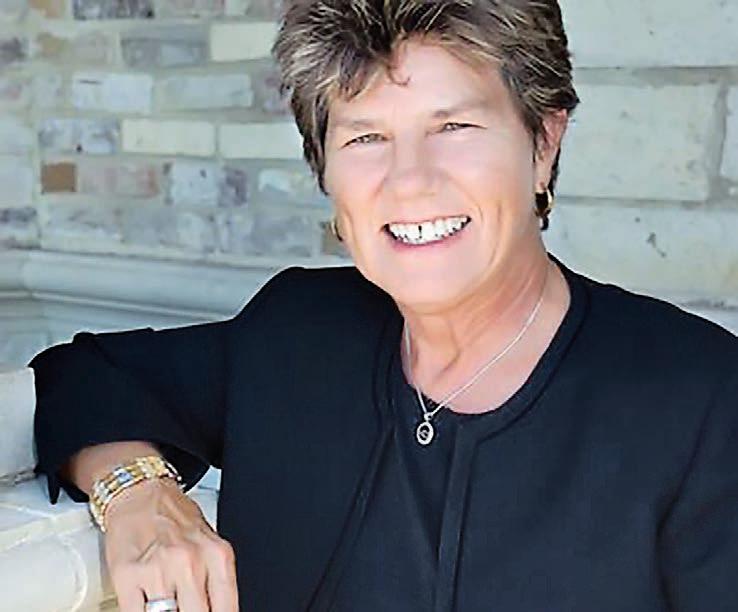
We sat down with Cash to discuss the history and legacy of SoVo, her own career, and the “unbelievable” honor of being cemented into history as an outstanding LGBTQ journalist.
Quotes have been edited for clarity. Read the full interview online at thegavoice.com.
You were given this honor mostly for your work with Southern Voice. Did you ever think, when you were founding the paper, that it would leave the legacy that it has? It never crossed my mind because I was completely caught up with the daily challenges of meeting deadlines and meeting payroll — that was a big, big issue in the beginning. Something always, without fail, would happen at the last minute; we would sign on a new advertiser or an advertiser would decide to pay six months in advance, just out of the blue, and we’d be okay.
I didn’t think that those were coincidences. It felt like, to me, that the universe and the community wanted us to survive and succeed. Otherwise, where would this stuff come from?
I did realize very quickly what a lifeline the newspaper was to our readers, particularly in Atlanta ... there was no other real [LGBTQ]
newspaper in the entire South. Support came really swift and strong. There were so many people that believed in us and wanted us to succeed. We used a lot of volunteers in the very beginning when we couldn’t afford to pay people. None of this would’ve happened without those people and the LGBTQ business community who were the first to jump on board and help us. Did I know that it would have the impact it had? Absolutely not.
When founding SoVo, what was your goal? What need were you trying to fill in Atlanta and Georgia?
In Atlanta, at that time — I got the idea in April of ’87, we launched in March of ’88 — there was Etcetera Magazine, and they did have some news pages, but it wasn’t extensive enough for either local or national news for my liking.
I was on the steering committee for the ’87 March on Washington for Atlanta.
When I was the editor of the newsletter for the Atlanta Committee for the March on Washington, I came across all these bona fide LGBTQ newspapers across the country: the Washington Blade, Philadelphia Gay News, Bay Area Reporter. I thought, ‘Why don’t we have a paper like that? We need to have a paper like that.’ Atlanta is the home, the seat of the Civil Rights movement — not to compare, not to say they’re exactly the same, but what we were struggling for was equal rights. It really didn’t make sense to me.
In April of 1987, I literally woke up one morning and sat up in bed, and I said out loud, ‘I am going to start an LGBTQ newspaper for Atlanta.’ For almost a decade before then, I had toyed with the idea of starting some kind of publication. I thought of starting a women’s magazine, a women’s sports newspaper. All of these different trains of thought and ideas all came together on that
April morning; by then I was involved with the March on Washington committee and doing the newsletter. I’ve always been drawn to print media, ever since I was a teenager.
What was the political landscape like at that time?
Reagan was still president, and he had still yet to mention the words AIDS or HIV. You need to understand that we were a community in crisis at the time. Everybody knew someone who was dead or was dying from AIDS. That was very personal for a lot of us, and for a lot of the community it was the primary focus — and for good reason. The ’87 March on Washington created this tsunami of activism across the country; Atlanta was no exception. The Bowers v. Hardwick decision in ’86 that upheld Georgia sodomy law was another galvanizing event … Our first five years were so full of activists and news that we could barely keep up. It was a thrilling time. I feel guilty sometimes to say I miss those times, but I do miss those times because we were a pretty frickin’ united community at that time.
To shift to the present, how does it feel to now be considered a Hall of Famer among LGBTQ journalists?
[It feels] pretty unbelievable. I’m thrilled to be in the company of some truly outstanding journalists and writers … This recognition of my work has brought me a sense of peace that I didn’t even know that I needed. What it says is, ‘What you did mattered, it really mattered.’
16 COMMUNITY OCTOBER 7, 2022 THEGEORGIAVOICE.COM
Chris Cash COURTESY PHOTO
COMMUNITY
“In April of 1987, I literally woke up one morning and sat up in bed, and I said out loud, ‘I am going to start an LGBTQ newspaper for Atlanta.’”
At Avita, our team treats every patient the way we want to be treated. We’ll make sure you get the medications you need, when you need them. We work to get you the best price and will even deliver your meds nationwide! Avita has supported the LGBTQ+ community for nearly 20 years and wants to be your pharmacy partner for life.
Scan the QR code to learn more and transfer to Avita.

Avita
is your
LGBTQ+
friendly pharmacy
Have you been searching for a pharmacy
that
understands your needs?
Atlanta AIDS Walk May Be Over, but Fundraising Continues
Katie Burkholder
This year’s 31st annual AIDS Walk and Music Fest raised hundreds of thousands of dollars for several of Atlanta’s integral HIV/ AIDS organizations — and the fundraising isn’t over yet.

The event, which happened September 24 in Piedmont Park, included a 5k run/walk as well as performances from “Love & HipHop: Miami” star Trina and multiplatinum Grammy nominee Wale. The fundraiser, held by the AIDS Healthcare Foundation (AHF), saw an increase in participants, teams, and fundraising, according to Imara Canady, the National Director of Communications and
Community Engagement for AHF.
“We are continuing to see the event grow in number in terms of actual attendees and participants,” he said. “We’re also really excited that we’re really seeing a lot of impacted communities out at Piedmont Park giving the awareness and education and people really having a good time as we bring about awareness and raise critical funds for these organizations that are really in the trenches doing this work … It’s just a lot of excitement to see that people are still very much connected to the work that needs to be done to address the issue of HIV and AIDS in our community and to uplift these organizations in a tangible way.”
According to Canady, almost $500,000 had been raised at the time of the interview. These funds will go to 11 different nonprofit organizations working around HIV prevention and treatment, advocacy, and education and awareness: AID Atlanta, AHF, A Vision for Hope, Atlanta Harm Reduction Coalition, Center for Black Women’s Wellness, Georgia Equality, Jerusalem House, NAESM, Positive Impact Healthcare Centers, Recovery Consultants of Atlanta, and THRIVE SS.
Funds raised are crucial to supporting the everyday upkeep of these organizations.
“As nonprofits, they may apply for and
garner grant funds, but oftentimes those funds are for restricted programmatic pieces of the work,” Canady said. “You can’t do the programmatic pieces of the work without dollars that allot for brick and mortar [and] staffing to fulfill those programmatic needs. Through this support, it allows the Atlanta community to ensure that these organizations can stay alive and thrive.”
The fundraising continues through October 31. All money raised until then will be matched dollar for dollar by AHF. You can donate, learn more about each of the benefiting organizations, and find volunteer opportunities at aidswalkatlanta.org.
The 31st annual Atlanta AIDS Walk PHOTOS BY RUSSELL BOWEN-YOUNGBLOOD
18 COMMUNITY OCTOBER 7, 2022 THEGEORGIAVOICE.COM
COMMUNITY

WHO ARE YOUR GRAND MARSHALS?
Katie Burkholder
For the first time in two years, Atlanta Pride is back in person from October 7 through 9. This means the return of the festival, vendor market, live music and entertainment, and of course, the Atlanta Pride Parade.
As in years past, Grand Marshals nominated by Atlanta’s LGBTQ community and chosen by Atlanta Pride Committee (APC) members will be honored during the parade, which steps off on Sunday, October 9 at noon. Seven Grand Marshals were announced last year, but because there was no in-person celebration, they will march in the parade this year.
So, if you need a refresher on who this year’s (and also last’s) Grand Marshals are, look no further. Meet the seven people and organizations that are making a difference in Atlanta’s LGBTQ community.
GERALD BOSTOCK
Bostock is a name easily recognized not only in Georgia, but across the country. That’s because he garnered national attention when he sued Clayton County for discrimination
— and won, changing the course of LGBTQ U.S. history.
In 2013, Bostock was fired from his job overseeing the Court Appointed Special Advocates Program in Clayton County after his supervisor learned he had joined the Hotlanta Softball League, a gay recreational softball organization. The stated reason for termination: conduct unbecoming a Clayton County Employee. As he has stated from the beginning, “no one should go to work fearful of losing their job because of who they are, who they love, or how they identify.”
The lawsuit was filed in 2016, and two years later Bostock petitioned the Supreme Court to hear his case after lower courts ruled against him.
In a 6-3 ruling, the Supreme Court decided that Title VII of the Civil Rights Act of 1964 bans employment discrimination based on sexual orientation and gender identity, thus setting the precedent for LGBTQ discrimination protections in federal law.
“When somebody was finally able to put up the first page and only part of that, and I saw the very first few words, I pretty much went
into shock,” Bostock told the Washington Blade during a telephone interview after the decision, referring to the part of the ruling he read on SCOTUSblog shortly after its release. “I was like, ‘Oh my Gosh, we did it.”
VALERIA CANTOS LUCIO
Cantos is an Assistant Professor at the Division of Infectious Diseases at Emory University and an attending physician at Grady Memorial Hospital, Emory University Hospital, and the Grady Infectious Disease Clinic.
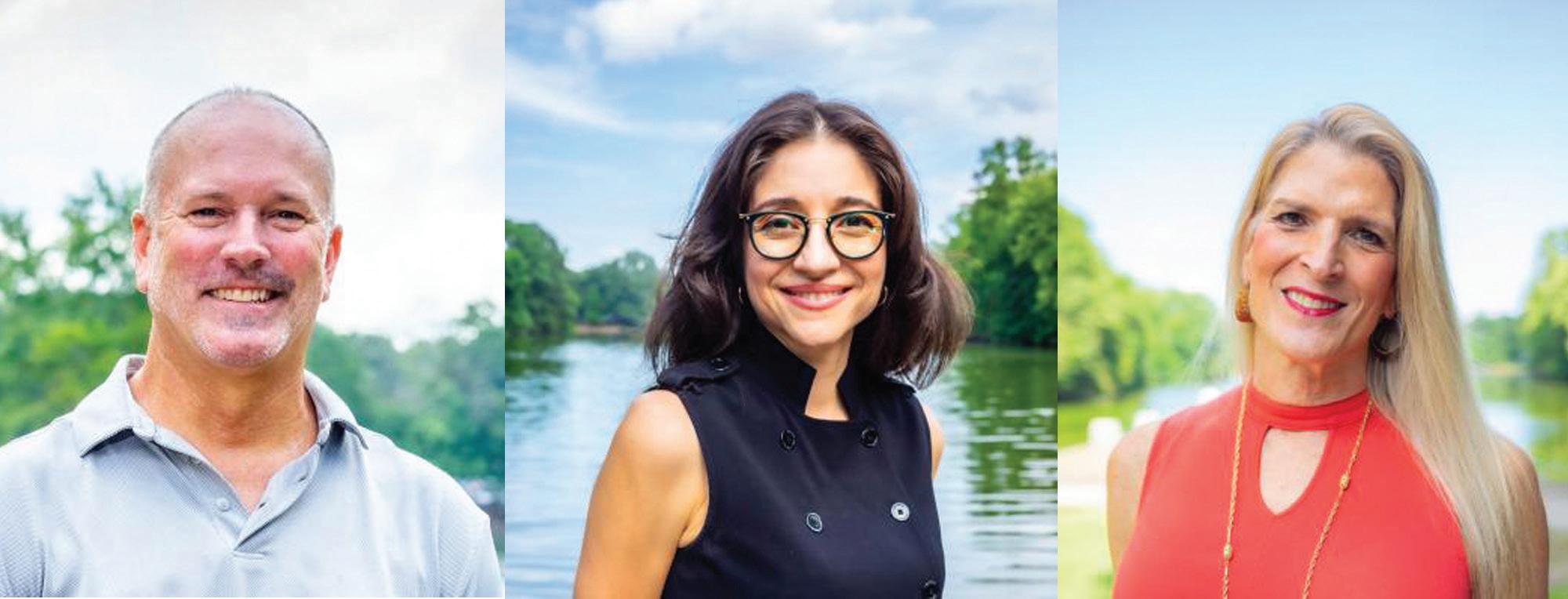
Originally from Ecuador, where she completed medical school, Cantos moved to Atlanta for her Internal Medicine residency and Infectious Diseases Fellowship at Emory. Now, her research focuses on HIV prevention in ethnic minorities, with a special focus on the Latino community. She is interested in developing and implementing innovative and culturally responsive strategies to deliver HIV prevention services and overcome systemic barriers to health care access.
She also prioritizes optimizing representation of the Latino population in medical research.
This year, she was one of the authors of a study exploring a framework for inspiring confidence in the COVID-19 vaccine among African American and Latino communities.
GABRIELLE CLAIBORNE
Claiborne is bringing transgender inclusion to the workplace as the co-founder of Transformation Journeys Worldwide, an inclusion training and consulting firm with a trans focus. She helps organizations transform their environments into fully trans-, gender nonconforming-, and nonbinary-inclusive cultures. The firm was recognized as the Out Georgia Business Alliance’s (OGBA) 2018 Small Business of the Year.
Claiborne is a multihyphenate business leader and LGBTQ activist. She serves as Co-Chair of the National LGBTQ Chamber of Commerce’s Transgender and Gender Expansive Initiative, Co-Chair of the Trans Affairs Committee on the City of Atlanta’s LGBTQ Mayoral Advisory Council, Inclusion chair and Board Secretary of the OGBA, Chair of the OGBA’s TGNC360 Workplace Initiative, and Advisory Board
From left: Gerald Bostock, Valeria Cantos Lucio, and Gabrielle Claiborne PHOTOS COURTESY OF THE ATLANTA PRIDE COMMITTEE
20 PRIDE OCTOBER 7, 2022 THEGEORGIAVOICE.COM
PRIDE CONTINUES ON PAGE 22
PrEP
FREE HIV TESTING

AT-HOME
DRIVE-THRU
PIHCga.org 3350 Breckinridge Blvd Ste 200A Duluth, GA 30096 470-361-2724 523 Church St, Ste B Decatur, GA 30030 678-365-4300 DECATUR DULUTH
PrEP is a low-cost daily pill that is 99% effective against HIV. Call 678-365-4300 to be connected with a PIHC PrEP Coordinator or find a PrEP provider near you.
Learn your HIV status privately in the comfort of your home. Call a PIHC Prevention Specialist at 678-365-4300 to have your free at-home test delivered. Or, order online at: PIHCga.org/athometesting
Walk-in or drive-up HIV testing is available at PIHC’s Decatur and Duluth locations.
Member of Out Front Theatre Group. She is also a TEDx speaker and published author.
PAUL CONROY AND OUT FRONT THEATRE COMPANY
Everyone familiar with Atlanta’s LGBTQ arts scene knows Out Front Theatre. Since its inception in 2016, the theater has existed to tell LGBTQ stories and serve artistic excellence to the LGBTQ communities of Atlanta and beyond. They produce outstanding theatrical experiences focusing on LGBTQ voices.
Conroy is the founder and producing artistic director of Out Front Theatre. He is also a member of the Mayor’s LGBTQ Advisory Board.
Policing Alternatives and Diversion Initiative PAD was created from the work and vision of Atlantans who were directly impacted by policing and incarceration in order to take a new approach to community safety and
wellness. PAD employs a twofold strategy to divert individuals away from the criminal justice system: diversion for individuals who have been detained by law enforcement and are otherwise subject to arrest; and ATL311 Community Referrals for individuals who have been referred by community members through the City of Atlanta 311 nonemergency services line.
Learn more about PAD on page 44.
ELAINE HENDRIX HONORARY GRAND MARSHAL
On September 20, 2022, a surprise addition was made to this year’s Grand Marshals: Elaine Hendrix. You may recognize Hendrix from her many iconic roles, including Meredith Blake in “The Parent Trap” and Alexis Carrington in the current reboot of “Dynasty.” She is a longtime ally and advocate for the LGBTQ community and was honored by the Human Rights Campaign with their 2022 Ally for Equality Award for her work with PFLAG,
the National Center for Human and Civil Rights, ACLU, Gay Straight Alliance, OutFest, the Trevor Project, and Northwest Arkansas’ Equality Crew.
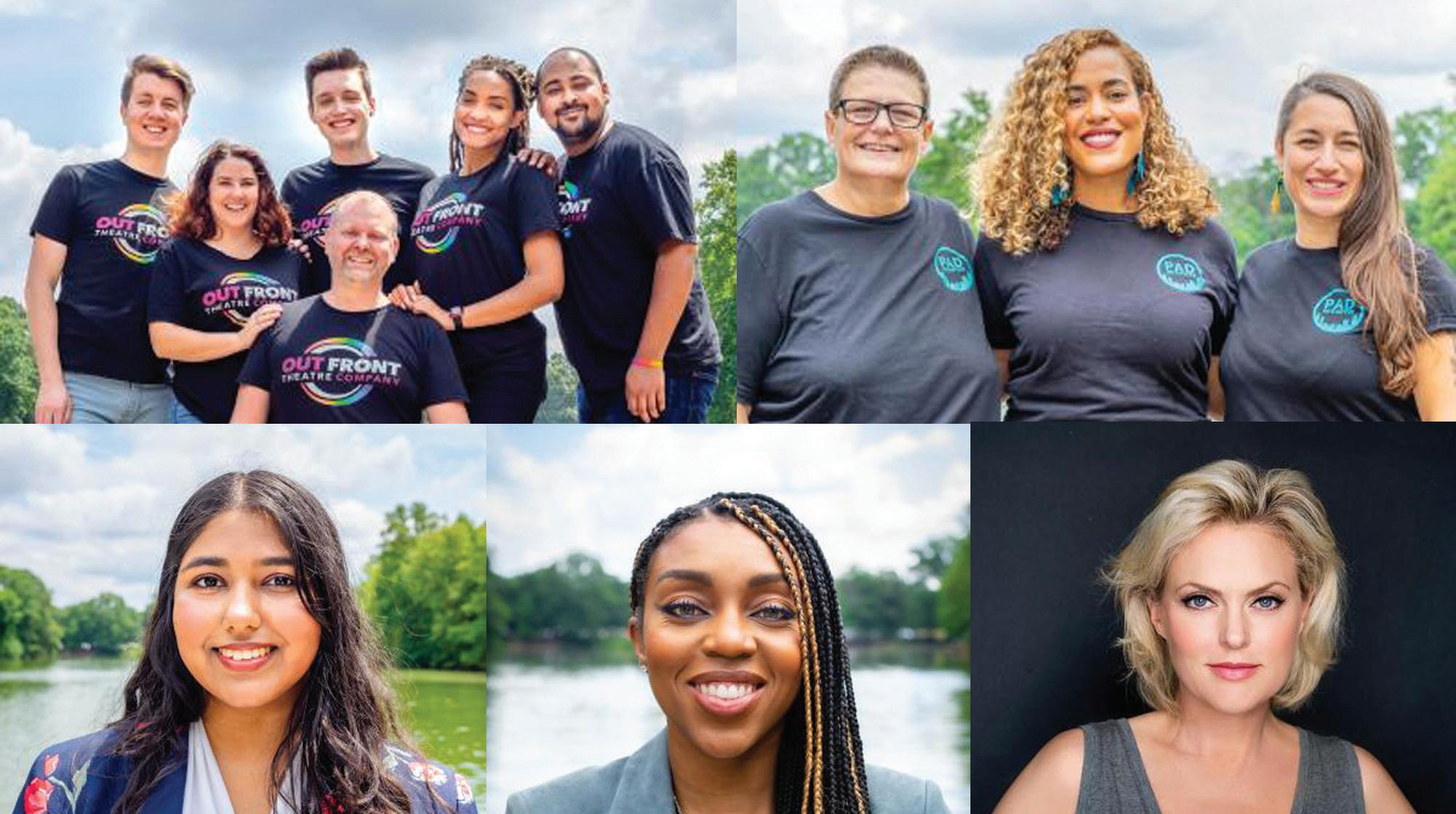
RENEE MONTGOMERY
Montgomery is an icon on and off the court. She graduated from UConn as a two-time All-American in 2009 and played on the undefeated team that went on to win a national championship that year. She was drafted fourth in the WNBA and won two WNBA championships while also being named an All-Star and sixth Woman of the Year in her 11-year professional career.
She retired in 2021 and is now part owner and vice president of the WNBA Atlanta Dream, making it both the only WNBA team with a former player co-owner and majority LGBTQ-owned (Suzanne Abair, one of the other two owners, is also LGBTQ). The team was owned by the anti-LGBTQ former U.S. Senator Kelly Loeffler before the WNBA and the NBA board of governors unanimously
approved the sale last year.
Montgomery also serves as a sports analyst for NBA/ESPN and hosts her own weekly podcast, “Montgomery & Co.”
RHEA WUNSCH
Wunsch is a 20-year-old student at Georgia State University studying public policy with a concentration in public management and governance, a minor in Women’s, Gender, and Sexuality Studies, and a certificate in social action. She was named as a Grand Marshal for her activism and community organizing. She organized for Stacey Abrams’ gubernatorial campaign and works with organizations such as March for Our Lives.
Earlier this year, Wunsch traveled to D.C. to lobby with March for Our Lives for universal background checks and the Protecting Our Kids Act, which made changes to federal firearms laws to establish new criminal offenses and expand the types of weapons and devices that are subject to regulation.
Clockwise from top left: Out Front Theatre Company, PAD, Elaine Hendrix, Renee Montgomery, and Rhea Wunsch PHOTOS COURTESY OF THE ATLANTA PRIDE COMMITTEE
PRIDE CONTINUED FROM PAGE 20 22 PRIDE OCTOBER 7, 2022 THEGEORGIAVOICE.COM

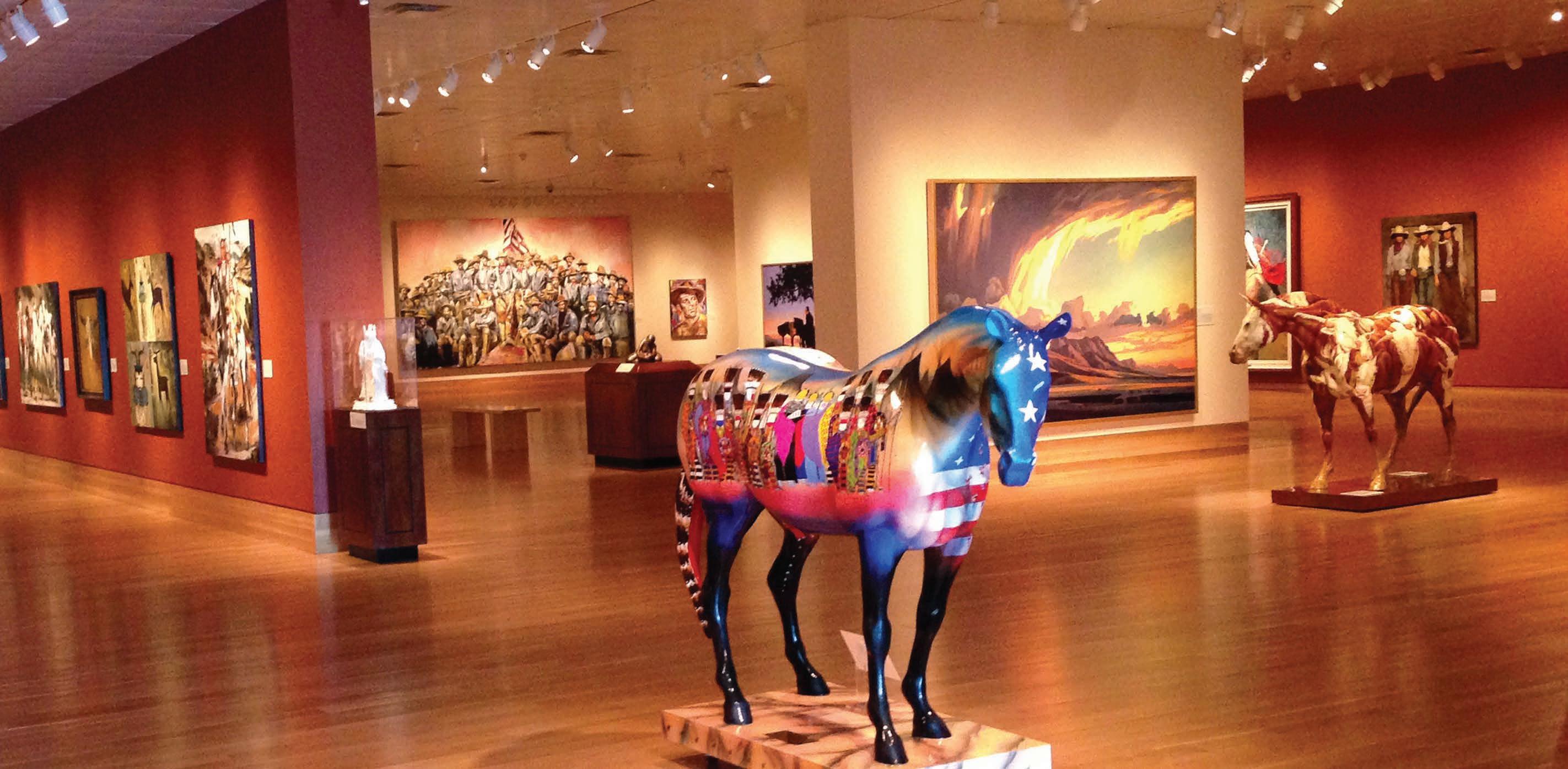
ATLANTA PRIDE EVENTS AT A GLANCE
Katie Burkholder
Happy Pride Atlanta! This weekend is chock full of events happening round the clock –there’s truly something for everyone!
FRIDAY, OCTOBER 7
Atlanta Presents Cocktails with Queens
6PM TO 10PM
THE HIDEAWAY
Featuring Frankie Coma, Saliva Godiva, Cistofer, Simply Nina, and Linda TM and music by DJ Devon Rex.
High Museum Pre-Pride Kiki
6PM TO 10PM
HIGH MUSEUM
Drink and draw with figure model JayBella Bankz and enjoy performances from Jarvis Hammer, Ivy Fischer, and Canzara and music from Ree de la Vega. Tickets at high.org.

Pride on the Square
6pm to 8pm
Colony Square
Kick off Atlanta Pride in The Plaza with emcee Brigitte Bidet. Experience thrilling live performances from some of Atlanta’s best drag queens bringing you the most famous hits from top musical icons. Keep the party going with special swag, drinks, and additional fun surprises as the DJ Yvonne Monet spins the latest tunes and greatest hits! This event is free, no ticketing required. Guests are encouraged to bring lawn chairs and blankets.
Pride Kickoff at Georgia Aquarium
7PM TO 11PM
GEORGIA AQUARIUM
Experience a variety of music from three different DJs scattered throughout different areas of the Aquarium. International superstar Guy Scheiman will headline the event with support from DJ Mark Dennis and introducing fierce new talent DJ Alexis Curshe. Attendees have the option to select General Admission tickets which
EVENT SPOTLIGHT
FRIDAY, OCTOBER 7
Fat Slut (ATL Pride!) with Silky Nutmeg Ganache, 10pm, Venkman’s
Enjoy performances from Silky Nutmeg Ganache from “RuPaul’s Drag Race,” Meatball, Nicole Paige Brooks, Big Dipper, Pinche Queen, JayBella Bankz, Ocean Kelly, and Taylor ALXNDR, plus music from DJ Rubella Spread. The meet and greet with Silky starts at 9pm, show starts at 10pm. Tickets at the link in Wussy Mag’s Instagram bio, @wussymag. (Photo via Facebook)
includes 2 drink tickets valid for a mixed drink, beer, wine or soft drink. Tickets at georgiaaquarium.org.
Pride at The Eagle
8PM
THE EAGLE’S NEW LOCATION (1492 Piedmont Ave NE)
The “RuPaul’s Celebrity Drag Race” viewing party begins downstairs (no cover) at 8pm.
The Eagle’s Cabaret begins upstairs ($5) begins at 9pm, followed by Reborn with DJ
Rob Moore at 11pm.
Pride Kickoff After Party
9PM TO 3AM
THE HERETIC
Featuring Joe Gauthreaux and Stan Jackson. Tickets at hereticatlanta.com.
Purple Disco Machine
10PM TO 3AM
DISTRICT ATLANTA
Tickets at collectivpresents.com.
Fantasy Girls Cabaret
8PM
FUTURE ATLANTA
Featuring special guest Brooke Lynn Hytes. Tickets at future-atlanta.com.
Chapel Beauty Pride Kickoff
9:30PM
NONI’S
Enjoy performances from Ivy Fischer,
24 PRIDE OCTOBER 7, 2022 THEGEORGIAVOICE.COM
PRIDE
CONTINUES ON PAGE 26
At the core of our purpose—to build better lives and communities—are the values that guide us to be intentional about diversity, equity, and inclusion. We do the work every day to diversify our leadership, empower all teammates, and fight for the opportunities we all deserve. Because we believe a culture where we can live and contribute our authentic selves is a stronger one.
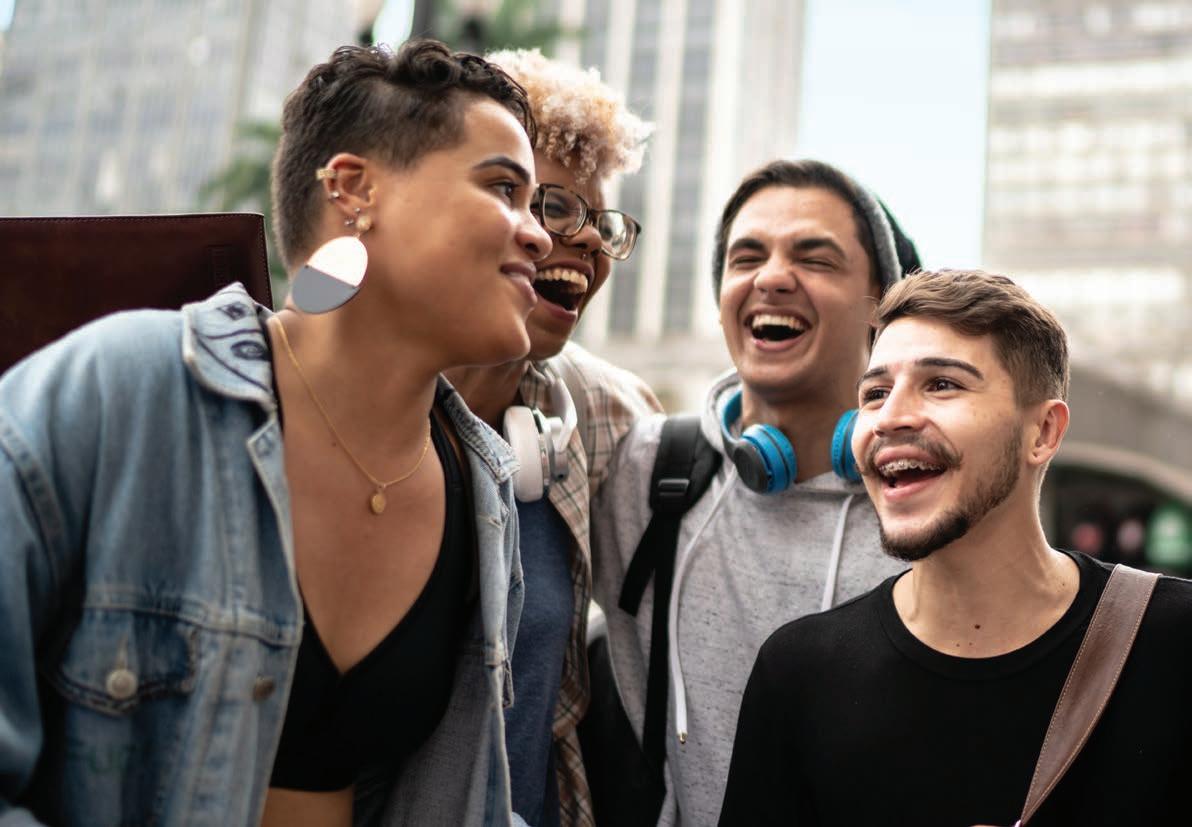
Truist.com Truist Bank, Member FDIC. © 2022 Truist Financial Corporation. Truist, the Truist logo and Truist Purple are service marks of Truist Financial Corporation.
A purpose for all people.
Minty, Canzara Szn, Miss He the Queen, Hailey from Third Period, and special guest Drunk Text, plus music from Wav Maker. $7-$10 cover.
Underground Circuit
10PM
FUTURE ATLANTA
Featuring Sam Gee. Tickets at futureatlanta.com.
XION
3AM
FUTURE ATLANTA
Featuring Millennial. Tickets at futureatlanta.com.
SATURDAY, OCTOBER 8
Pride at The Eagle
2PM
THE EAGLE’S NEW LOCATION (1492 Piedmont Ave NE)
The T Dance/Lot Party with DJ Seth Breezy begins downstairs (no cover) at 2pm. Upstairs ($5 cover), the Eagle’s Cabaret begins at 9pm followed by Rise with DJ Neon and the Glowbear at 11pm.
Queen Butch Pride Saturday: Thirst Tea
2PM TO 8PM
THE HERETIC
Featuring Hex Hector, DJ Holographic, and Vicki Powell. Tickets at queenbutchevents.com.
Fantasy Girls Cabaret
8PM
FUTURE ATLANTA
Featuring special guest Latrice Royale. Tickets at future-atlanta.com.
Deep South PRIDE
8PM
FUTURE ATLANTA
Featuring The Carry Nation, Sindri, and Vicki Powell. Tickets at universe.com/ deepsouthpride.
Heretic Pride
9PM TO 3AM
THE HERETIC Featuring DJ Paulo Fragoso and Mike Pope. Tickets at hereticatlanta.com.
EVENT SPOTLIGHT
SATURDAY, OCTOBER 8
Bottom’s Up! Brunch with Gia Gunn, 10:30am, City Winery

Enjoy a boozy brunch with performances by Gia Gunn, Nicole Paige Brooks, EllaSaurus Rex, Alissah Brooks, and more. Tickets at citywinery.com. (Photo via Facebook)
Pride Kiki with Aquaria: A Dance Party 9PM TO 2AM VENKMAN’S
“RuPaul’s Drag Race” winner Aquaria comes to Atlanta, DJing alongside Esme and Ree de la Vega. Get your tickets at the link is Wussy Mag’s Instagram bio, @wussymag.
Sugar Shack: A Queer Dance Party 9PM TO 2AM 529
Enjoy performances from JayBella Bankz, SZN ALXNDR, Taylor ALXNDR, and Tuna Fiasco and music from DJs JSPORT and Divoli S’vere. Proof of vaccination or negative COVID test required. Tickets at sfqp.info/sugarshack22.
All Black Party
10PM TO 3AM PARADISE LOUNGE
This party is curated for women 30 years and older who love women. Dance the night away and enjoy hits from the ‘80s, ‘90s, and 2000s as well as current chartbusters from world renowned DJ Bombshell Boogie. All-black attire required for entry. Tickets at Eventbrite.com or pay at the door.
SUNDAY, OCTOBER 9
HRC Atlanta Pride Brunch
10:30AM TO 2PM
EMPIRE STATE SOUTH
Now in its 19th year, the HRC Atlanta Pride Brunch is a staple of Atlanta Pride Weekend. We invite you to join us this
October 9th to celebrate Pride from one of the best vantage points to view the Atlanta Pride Parade! All tickets to the event include delicious Southern brunch prepared by Empire State South, unlimited beverages, and an annual HRC membership or membership renewal. Tickets at act.hrc.org/ page/110897/event/1.
DILF Atlanta Pride Out & Proud Tea Dance
3PM TO 8PM
THE HERETIC
Featuring DJ James Anthony. Tickets at thedilfparty.com.
Meat Up Sunday Night Hustle
5PM TO MIDNIGHT
THE HIDEAWAY
Music by DJ Rob Reum, $6 Absolut cocktails, and no cover!
Undefined: The Andro Fashion Show
8PM
UNDERGROUND ATLANTA
Atlanta’s hottest LGBTQ and androgynous models are taking over the runway for one night only! It’s not just a fashion show: it’s a fashion, art, and music experience with live performances from Cocolman Star, Sedric Perry, Raven Iman, Sunni Dread, Flame, and more — all hosted by Kia Barnes! Tickets at Eventbrite.com.
DILF Atlanta Pride Proud AF
9PM TO 3AM
THE HERETIC
Featuring DJ T’Don and DJ Alex Ramos. Tickets at thedilfparty.com.
Queen Butch Pride Sunday: The Last Ball
9PM TO 3AM
FUTURE ATLANTA
Featuring Derrick Carter from Chicago and William Francis from New York City. Tickets at queenbutchevents.com.
Cruise Control with DJ Mister 11PM
THE EAGLE’S NEW LOCATION (1492 Piedmont Ave NE)
$5 cover.
Xion 3AM FUTURE ATLANTA
Featuring Alex Lo. Tickets at future-atlanta.com.
26 PRIDE OCTOBER 7, 2022 THEGEORGIAVOICE.COM
PRIDE
CONTINUED FROM PAGE 24
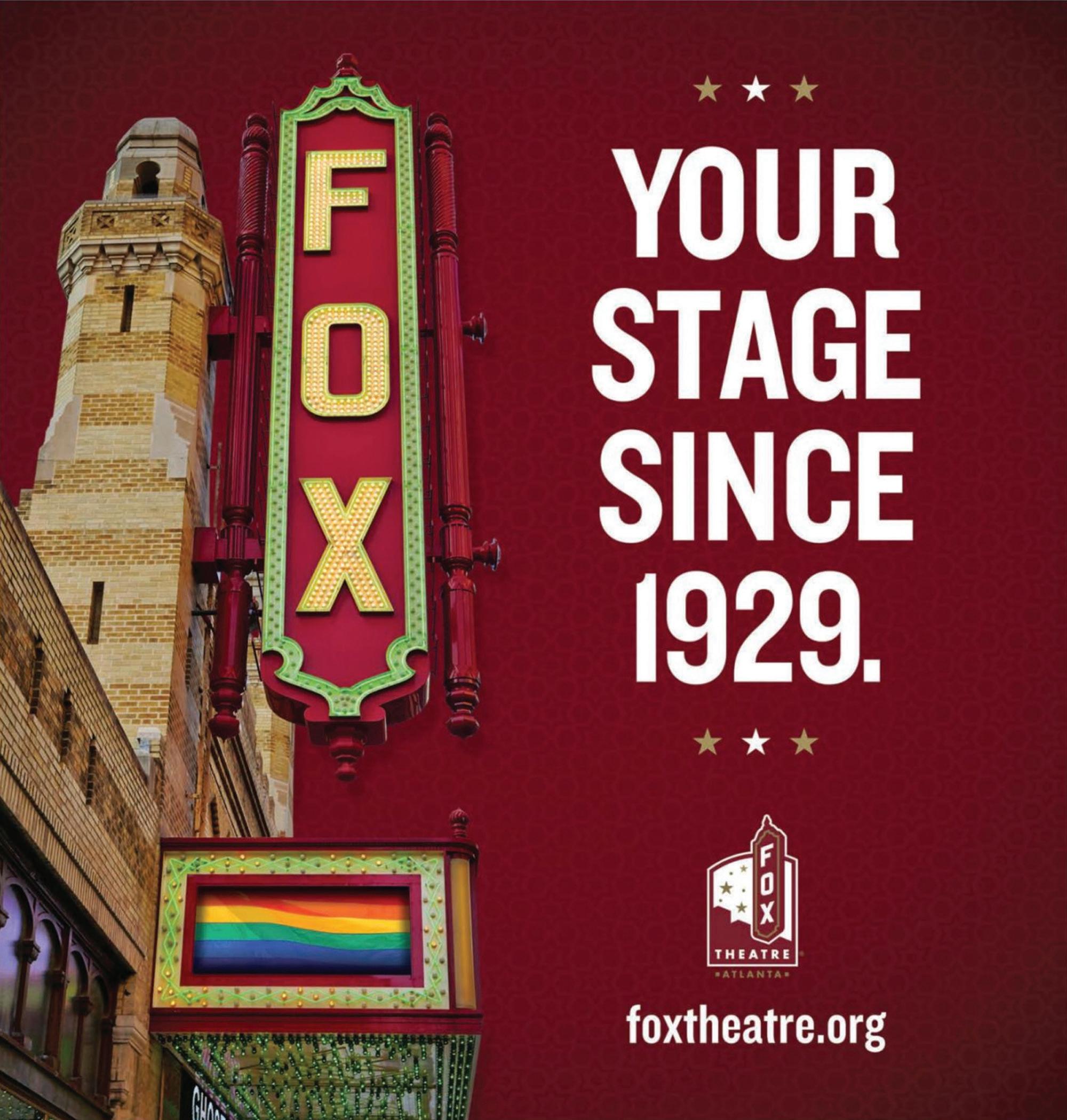



puccini nov 5 - 13, 2022 cobb energy performing arts centre ATLANTAOPERA.ORG | 404.881.8885 2022-23 Season PRIDE NIGHTS ALL TUES MAINSTAGE PERFORMANCES 25% OFF WITH CODE PRIDE25 *offer not valid on previously purchased tickets




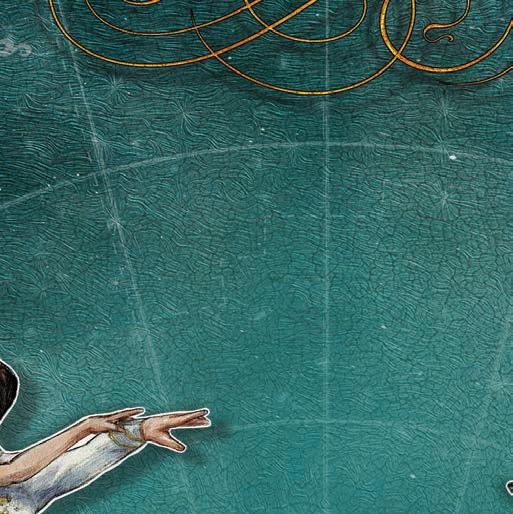


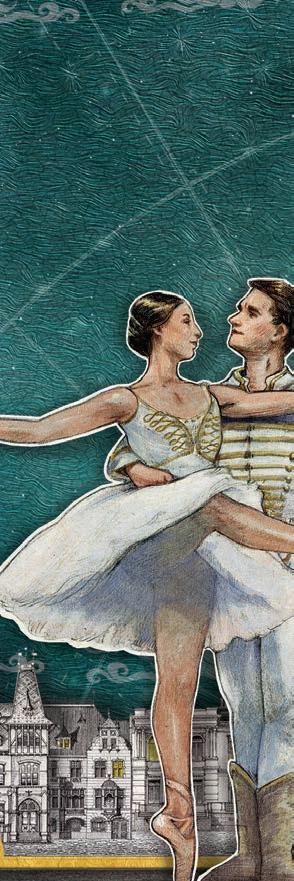















The Carlos Family in Honor of Thalia N. Carlos Presents Add a little Magic to your Holidays! Sponsored by Character Illustrations by T. Dylan Moore December 9–26, 2022 | Groups of 10+, email groupsales@atlantaballet.com For tickets, visit atlantaballet.com or call at 800.982.2787. “...One of the most entertaining [Nutcrackers] out there...” — e Washington Post “Audiences can return year a er year and make new discoveries.” —ArtsATL Atlanta Ballet is supported by
ATLANTA PRIDE SHOPPING GUIDE
Katie Burkholder
Get your Pride on, Atlanta! Wear your rainbow heart on your sleeve with Pride merch that is sure to make you the star of the weekend.
A. Queen Elizabeth Rainbow Outfit Tote Bag
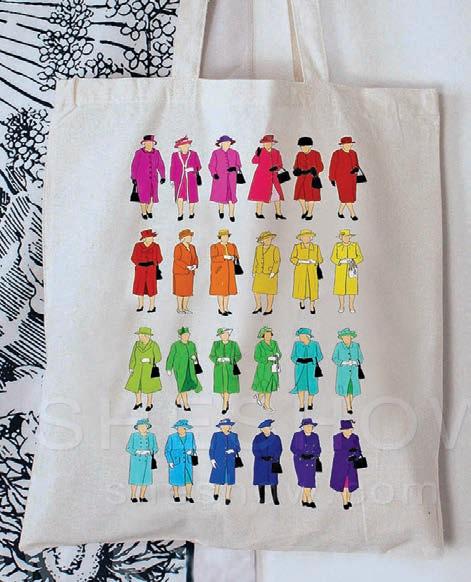
Honor Queen Elizabeth’s passing, her impeccable fashion, and Pride with this adorable tote bag. Comes in both black and white. $26, sheshow.com.
B. Y’all Means All Unisex T-shirt

Because in the South, we believe in LGBTQ inclusion, equality, and community! Comes in blue and grey and sizes up to 5XL. $29, shop.hrc.org.
C. Illuminator Tank Top – Laser Love
This sleek, cyber-inspired graphic tank top is a stylish rendition of the classic Pride rainbow, making it perfect to don either at the festival during the day or a circuit party at night. $49, Boy Next Door Menswear; 1447 Piedmont Ave NE; boynextdoormenswear.com.

D. ATL Pride Throw Blanket
If you’re hosting guests this weekend, then your house has to be decked out, too! This soft silk touch throw blanket adds the perfect LGBTQ Georgian touch to any home. $40, atlprideshop.com.
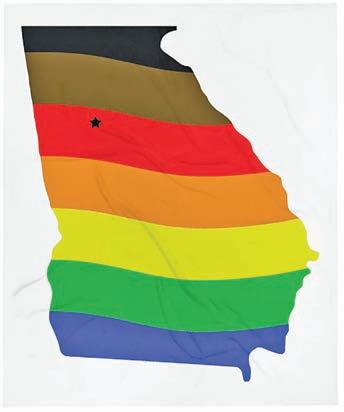
E. Say Gay Necklace
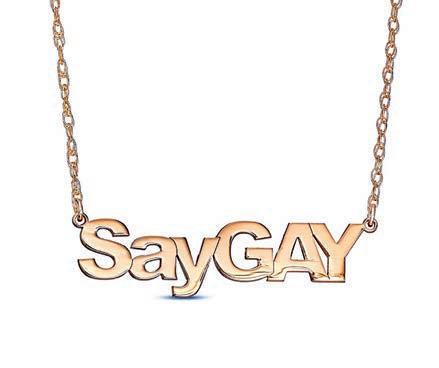
When homophobes say Don’t Say Gay, say “no way!” with this gorgeous 24k gold plated necklace. $145, banter.com.
F. BodyMark Pride Pack
Have the perfect Pride outfit but just looking for the finishing touch? Look no further – complete your look with some DIY temporary tattoos! BIC’s BodyMark Pride Pack includes 11 skinsafe temporary tattoo markers and 10 Pride-themed stencils so you can show off your true colors. $37.99, amazon.com.
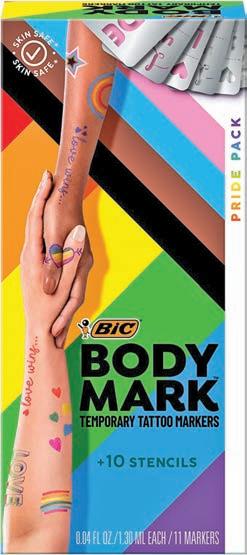
G. Pride Butterflies Meggings
Let everyone see your Pride with this bold print – take off the soft crotch cup and let them see a lot more! With multiple pockets, a loop in the back to carry a shirt or towel, and an inner drawstring to keep ‘em snug, these meggings are the perfect option for strutting around Piedmont Park this weekend. $88, matadormeggings.com.

30 PRIDE OCTOBER 7, 2022 THEGEORGIAVOICE.COM
PRIDE A B C D E F G
BOYNEXTDOORMENSWEAR.COM SINCE 1980 MOVING JANUARY 2023 1000 PIEDMONT AVE ATLANTA, GA 30309 CURRENTLY 1447 PIEDMONT AVE ATLANTA, GA 30309 BND


Let Our Family Take Care of Yours Perfect Care Nursing can help ensure your loved ones receive the top-notch care they deserve. We offer private, in-home care with 24-hour services in and around metro Atlanta. 404-482-8410 Registered Nurses • Licensed Practical Nurses • Certified Nursing Assistants Visit PerfectCareNursing.com or contact us today for a free no-obligation phone consultation.
MEMORIES OF PRIDES PAST
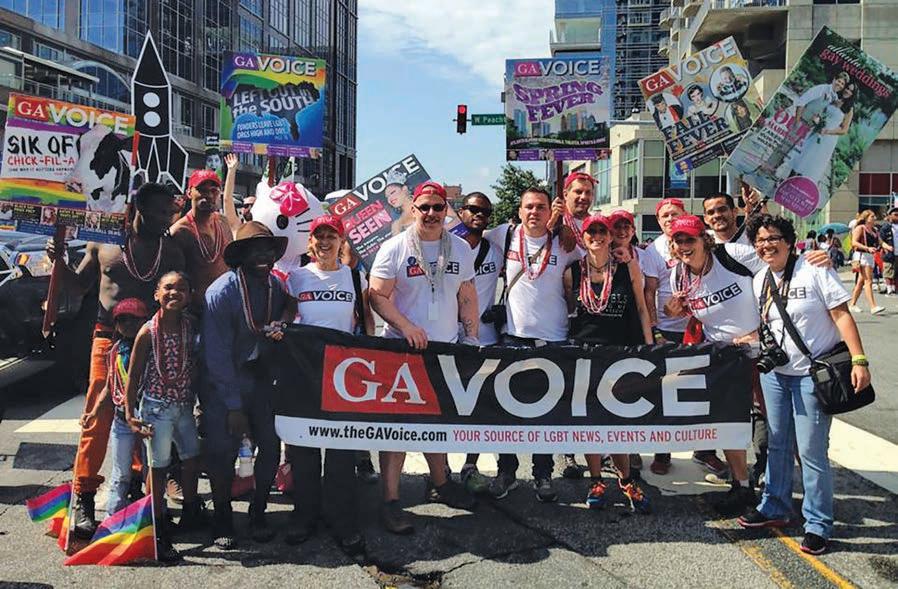
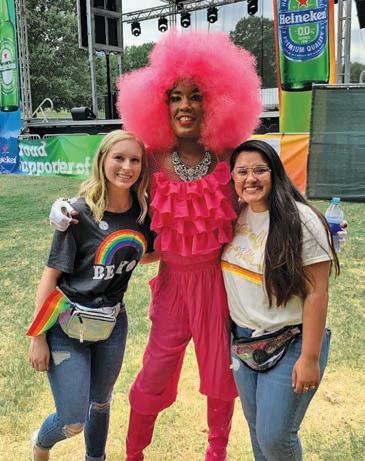
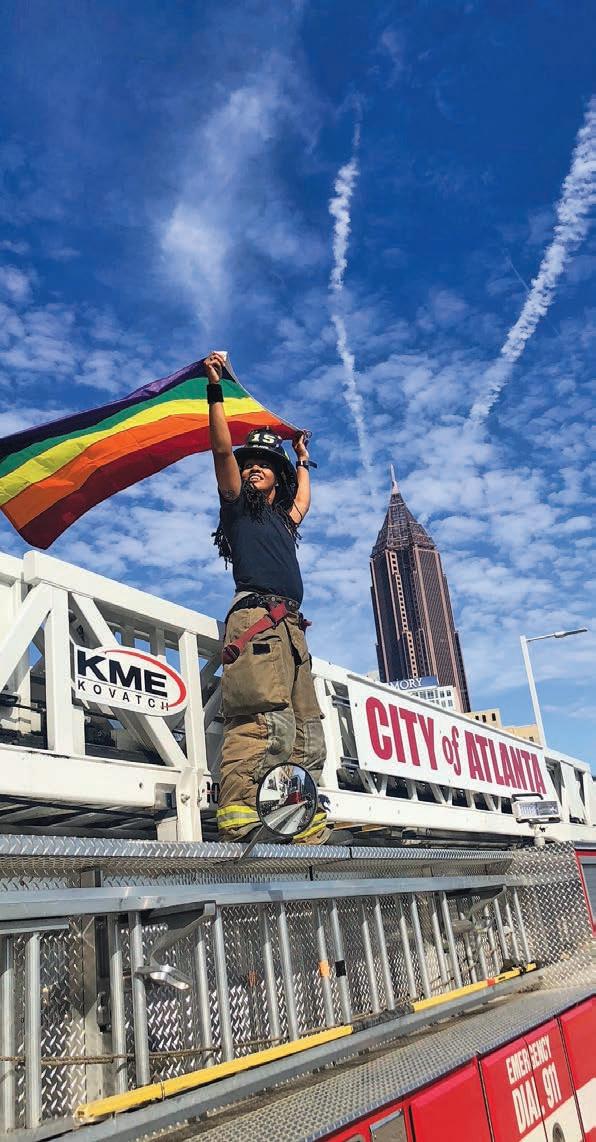


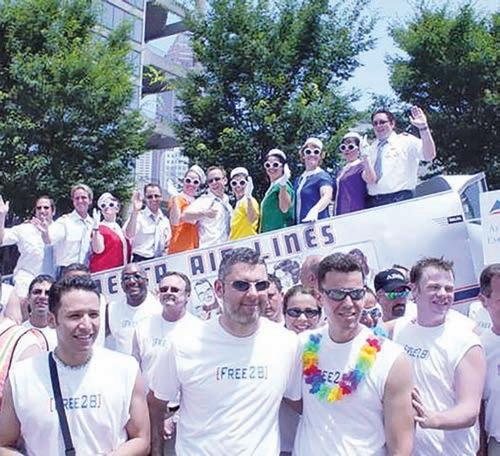
34 PRIDE OCTOBER 7, 2022 THEGEORGIAVOICE.COM
PRIDE 2003: DELTA’S FIRST PRIDE FLOAT - KELLY GIBBS SUBMITTED PHOTOS 2008: MELISSA CARTER 2019: EMILY BURNS2019: ATLANTA FIRE RESCUE STATION 15 - NANCY TAO 2019: EMILY BURNS 2014: GEORGIA VOICE

PRIDE PARADE & MARCHES AT A GLANCE
Atlanta Pride
All Atlanta Pride marches begin at the Charles Allen Gate and continue down 10th Street toward Peachtree Street where they turn right, then right again on 14th Street, ending at the 14th Street Gate.

The Parade steps off from the Atlanta Civic Center MARTA Station and continues down Peachtree Street before turning right onto 10th Street and ending a block from the Charles Allen Gate.
ANNUAL TRANS MARCH
SATURDAY, OCTOBER 8
MEET TIME: 1:15PM
STEP OFF: 1:45PM
The Annual Trans March celebrates and promotes visibility of the trans community. All trans people and allies are welcome.
ANNUAL BI AND PAN MARCH
SATURDAY, OCTOBER 8
MEET TIME: 3:00PM
STEP OFF: 3:30PM
The Annual Bi and Pan March celebrates the bisexual and pansexual communities. Bi, pan, and allied people of all gender identities and expressions are welcome.
ANNUAL DYKE MARCH
SATURDAY, OCTOBER 8
MEET TIME: 4:30PM
STEP OFF: 5:00PM
The Annual Dyke March celebrates and empowers women, femmes, and their allies. Open to all women loving women (trans-
inclusive) of any race, culture, orientation, ability, health, socioeconomic level, family structure, faith, or age.
ATLANTA PRIDE PARADE
SUNDAY, OCTOBER 9
ASSEMBLY BEGINS AT 9:30AM
STEP OFF: NOON
The Atlanta Pride Parade is the biggest event of the festival. Drawing over 100,000 people along the streets of Midtown Atlanta! See you there!!!
36 PRIDE OCTOBER 7, 2022 THEGEORGIAVOICE.COM
PRIDE



AARP RETURNS TO ATLANTA PRIDE
Luke Gardner
AARP is returning to Atlanta Pride this year with a scaled-down experience due to pandemic-related planning concerns.
At this year’s pride, AARP will have a presence and hopes to include a 360-degree photo experience. However, they will include fewer of the events and accommodations they have become known for, referred to by some as “Gray Pride.”
“This year the volunteers felt we need to be involved without a huge experience,” Hillary Thomas, AARP Georgia Associate State Director of Advocacy and Outreach, told Georgia Voice. “AARP didn’t start having inperson activities until spring. It takes a lot for [Gray Pride] to happen. We wanted to make certain we were fully prepared for the next time it could happen.”
GRAY PRIDE
AARP, a nonprofit aimed at increasing the quality of life for people 50 and over, sponsors several pride parades and organizations nationwide, including Atlanta’s Black Pride. AARP started its annual presence at Atlanta Pride around eight years ago. Older Pride attendees expressed to AARP staff that the event would be more enjoyable and accessible for them if they had access to seating, a cooled room, and water.
By providing water and renting a cooled building in the park, AARP’s space quickly became a hit. When they added a DJ, the space transformed into a dance party that grew each passing year. Over the years, AARP has hosted several education events as a part of Gray Pride, including talks on caregiving, fraud, voting access, and prescription drug pricing.
In 2020 and 2021, AARP hosted a series of virtual events, including workshops, storysharing sessions, dance parties, and concerts.
THE NEEDS OF OLDER
LGBTQ+ PEOPLE
Thomas, a member of the Atlanta Mayor’s LGBTQ Advisory Board, expressed the importance of creating space for LGBTQ people over 50 and addressing their needs.
In some cases, decisions regarding an older person’s care and postmortem arrangements might be left in the hands of homophobic or transphobic family members. This means some older trans people could be subjected to having people who deadname them be the ones left in charge of their wardrobe, hormone access, and the name on their tombstone.
“If we are fortunate enough, we will age, and we need to make sure there is
something for us as we age,” Thomas said. “Imagine someone with dementia losing the ability to communicate, knowing they are a woman and maybe not having the ability [to say], ‘I’m angry because I’m not supposed to wear [clothing that gives them gender dysphoria].’”
In other cases, people in care facilities may go back into the closet to avoid being judged by their peers or even their caregivers or health care providers. Thomas gave the example of an older gentleman in a care home who was uncomfortable coming out because he thought his peers would treat him differently.
In one discussion, a man living with HIV said doctors told him that he wouldn’t live and suggested he spend his retirement money. He did, only to find himself decades
later over 60 and without the money.
Thomas said that when she began working with older LGBTQ people, there was a common perception among care facility staff that older people don’t have sex and therefore couldn’t be gay or bisexual.
Besides that misconception, the concerns and experiences of older LGBTQ+ people might often be overlooked because of a lack of representation or a hesitation to confront aging and mortality.

Thomas hopes to have Gray Pride return in its full glory next year to continue telling these stories and working toward solutions.
To learn about upcoming events, visit aarp. org/atlanta.
40 PRIDE OCTOBER 7, 2022 THEGEORGIAVOICE.COM
PHOTO VIA AARP.ORG
PRIDE
A

Nathalie Stutzmann
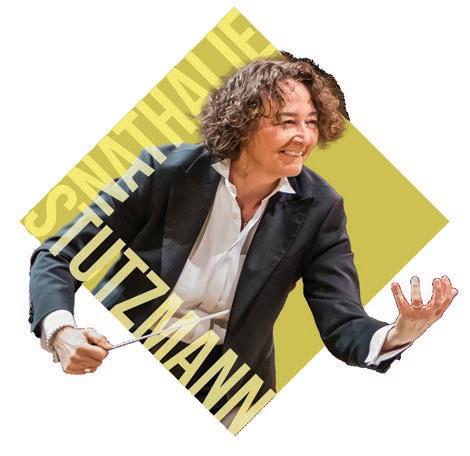
OCT
BRAHMS:
FRANCK:
SCHOENBERG:
Tom Borrow Plays Beethoven

JAN
IVES:
BEETHOVEN:
Kazem
RACHMANINOV:
CHOPIN/Stravinsky:
SIBELIUS:
MEMBERSHIP BENEFITS:


Four exclusive events paired with ASO concerts. Food, drink and concert ticket included
Four additional complimentary tickets to select Delta Classical Series concerts.
20% discount on additional select Delta Classical performances.
Complimentary access to the 2022/23 Behind the Curtain virtual concert series.
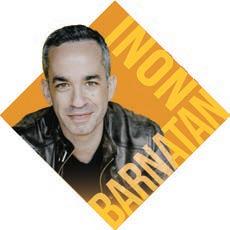
Pre-sale access to Symphony Hall Live, outdoor and special concerts.

LERA
WAGNER:
VAUGHAN
Lucas
THEGEORGIAVOICE.COM OCTOBER 7, 2022 ADS 41 aso.org/ unison $175
Conducts Lush Romantics
14 | Fri: 8pm
Symphony No. 3
Le chasseur maudit
Verklärte Nacht Inon Barnatan Plays Rachmaninov NOV 19 | Sat: 8pm OUTI TARKIAINEN: Midnight Sun Variations
Rhapsody on a Theme by Paganini
Nocturne and Grand Waltz
Symphony No. 5 John Storgårds, conductor Inon Barnatan, piano
15 | Sun: 3pm
Symphony No. 2
Piano Concerto No. 4
Abdullah, conductor Tom Borrow, piano A Sea Symphony APR 29 | Sat: 8pm
AUERBACH: Icarus
“Dawn” and “Siegfried’s Rhine Journey” from Götterdämmerung
WILLIAMS: A Sea Symphony Nicholas Carter, conductor Nicole Cabell, soprano
Meachem, baritone ASO Chorus
new way to Symphony! A Group for LGBTQ+ & Friends 2022/23 MEMBER EVENTS
Sophia Dashing
TO RELEASE NEW SINGLE THAT IS ‘SAUCY, SASSY, AND FIERCE’
Sukainah Abid-Kons
After the success of her last single, “way i,” which has more than 220,000 streams, singer-songwriter Sophia Dashing will release her newest single, “Lonely” on October 7, the day before the young up-andcoming musical artist takes the Atlanta Pride Festival stage for the first time on October 8.
“To be able to dive in deep like that and to perform in front of an audience that’s a community to me, that feels amazing,” Dashing told Georgia Voice.
Dashing, who was supposed to perform at Pride in 2021, has been busy building her music career over the past two years. The singer-songwriter, who is an Atlanta native, has been using her hometown’s music scene as an opportunity to evolve her music and grow her fan base.
“Getting to meet other artists in Atlanta and getting to network here has really helped grow my audience and helped with the evolution [of my music],” Dashing said.
As a bisexual artist, Dashing says that she has used her music as a way of capturing her experiences: “Fans can that expect that from me, always, an authentic experience
from me and my sexuality.”
Regarding her upcoming single, “Lonely,” Dashing said it delves into the experience of catching feelings again after being single and the intensity of falling for someone for the first time in a long time.
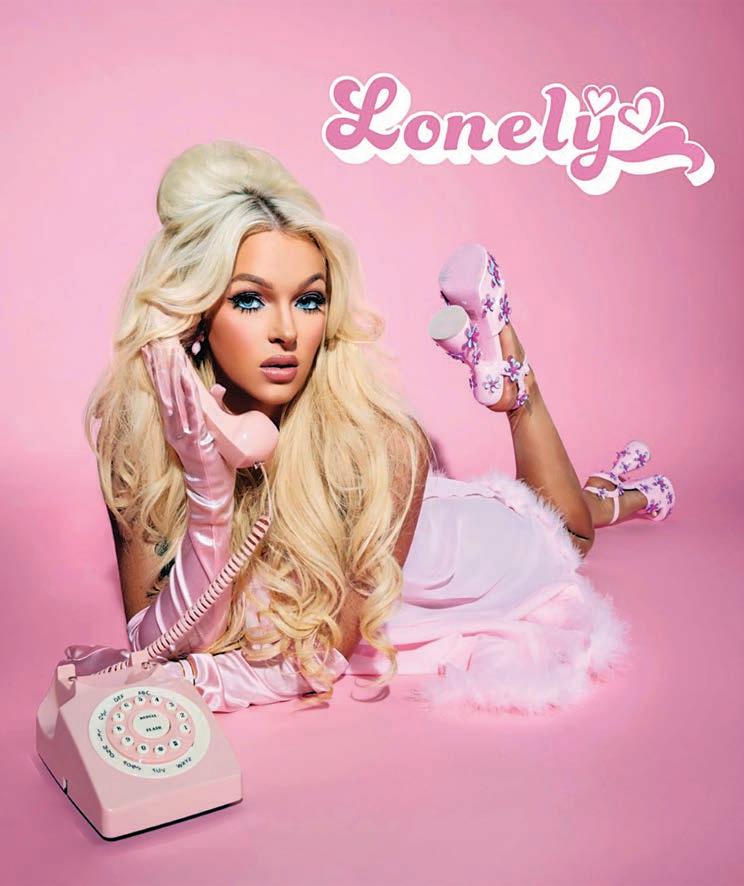
The singer-songwriter said that she wrote the song based on her own experience with this exact situation.
“I was single for while, so when I did meet someone that kind of sparked my interest, I just wanted to dive in,” she said. “This person just triggered a lot of feelings coming up in me, and this song is a perfect translation of what happened.”
Dashing said the single also touches on themes of self-love and romance and has an upbeat sound.
“[It’s about k]nowing [that] you’re hot and you look good, you want to be with somebody, and you want to share that with somebody,” Dashing said.
The artist has released previous singles that focus on self-love and confidence and channel the empowerment of the Divine Feminine. “Lonely” will be a continuation
of the singer’s empowering anthems, and Dashing says she is “so excited” for her audience to hear it.
“Self-love is the ultimate message I hope to give to women who listen to my music,” Dashing said, adding that she wants her music to inspire women with the knowledge that good things can come from difficult situations. The singer mentioned that this has stayed a consistent goal in her career so far. One of her first singles, “High Priestess,” dealt with Dashing’s experience of going through a breakup and getting herself through that heartbreak.
With all the growth her career has seen since her first single was released in 2021, Dashing says she’s already planning for her future.
“I really would love to make music that makes people feel good,” she said. “Like when you walk in a club, and you hear my song come on, you’re like ‘Oh my God, we can’t go to the bathroom, we gotta go dance,’
I really just want to make people feel happy and dance and feel good.”
The singer wants to continue to write and release music, be able to perform for fans, and help empower other women and queer artists.
“It’s hard to navigate this industry as a queer artist,” she said. “I really just want to create a community within the industry of queer artists and female artists.”
This community is what makes Dashing feel like her first performance is fate. Her single was already scheduled to be released before she booked the Pride show, and Dashing said she feels like this was an instance of “divine timing.”
Sophia’s new single, “Lonely,” will be available to stream on Spotify and Apple Music on October 7th at midnight. She will be performing at Atlanta Pride on October 8th at 4:30pm on the Gray Television Stage.
42 PRIDE OCTOBER 7, 2022 THEGEORGIAVOICE.COM
Sophia Dashing COURTESY PHOTO
PRIDE
FOR THE

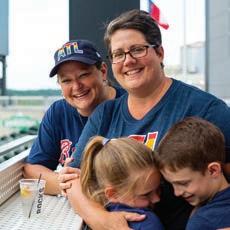

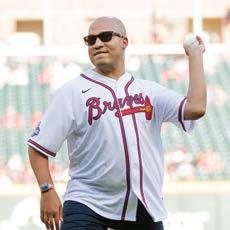
Where you’re always welcome
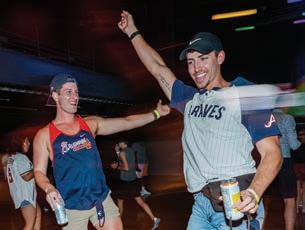

ATLANTA PRIDE GRAND MARSHAL PAD REDEFINES PUBLIC SAFETY
Community-based care and support are foundational in addressing the systemic issues in our country that lead to homelessness, poverty, and overall lack of access to basic needs. Instead of offering support to help an individual, police will often arrest individuals experiencing homelessness, substance use, or mental health issues.
Lack of access to basic needs and facilities forces people to commit “quality of life” offenses. These are offenses that can specifically target people experiencing homelessness, criminalizing vagrancy and loitering. Bathing in public or using the streets to go to the bathroom in a city like Atlanta that offers only two public restrooms are common offenses as well. Quality of life offenses are common, low-level, nonviolent offenses that call for an alternative to arrest known as pre-arrest diversion.
Pre-arrest diversion is another option to arresting individuals who could be charged with a low-level, nonviolent offense who show a clear need for assistance. If police have probable cause to arrest someone, they may be able to identify that the individual has a need for support. This can be support for people experiencing needs related to substance use, mental health, or extreme poverty.
Policing Alternatives & Diversion Initiative
(PAD) is an Atlanta-based organization that offers alternative policing and strives to mend a system to leads people to experience extreme poverty, substance use, and mental health crises. PAD, established in 2015 by Atlanta City Council, was founded by the Solutions Not Punishment Collaborative (SNaP Co), is led by trans and queer people of color, and is one of this year’s Atlanta Pride Grand Marshals.
SNaP Co and its affiliated organizations are leading Atlantans to reform the city’s criminal justice system and offer more reliable, effective options for public safety.
As an organization led by queer and trans people of color, the call for reforming the criminal justice system is deeply rooted in the fact that trans and queer people are disproportionately subjected to police brutality and violence in their communities.
When it comes to responding to calls, Moki Macias, Executive Director of PAD, said, “We have to recognize that officers are under a lot of pressure to, when they show up, make the problem go away, and in these types of situations [that often means] making that person go away.”
The problem, however, is not the individual. Individuals experiencing trauma, such as extreme poverty or living without shelter and/or food, are not always equipped to deal with these issues on their own.
In the state of Georgia, there are reportedly
10,000 people experiencing homelessness, a third of whom reside in Atlanta. According to Atlanta Mission, a Christian organization that seeks to empower Atlanta’s most in-need residents, 81 percent of that population have experienced physical or sexual abuse and a majority report symptoms of trauma and/or have a chronic medical condition.
According to Macias, criminal trespassing is the most common quality of life offense that police encounter. Criminal trespassing can describe someone seeking shelter or rest where their presence is considered unlawful, from private property to public parks.
At the responding officer’s discretion and consent from the person in need of aid, they can be referred to PAD in order to get the help they need.
With the individual’s consent, PAD will arrive to offer support in numerous ways. If someone is need of immediate shelter and basic needs, PAD offers emergency shelter, transportation, and food assistance.
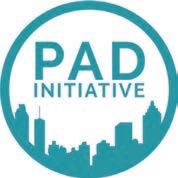
To provide long-term support, PAD offers care navigation, recovery support, employment, and service providers to help recover identification documents. Care navigation is essential to empowering those in the community who are in need of help. PAD reported in the month of August that 436 participants were enrolled in care navigation.
Participants who have been with PAD for longer than six months benefit from the support provided. In the month of August, 86 of the 89 active participants were not arrested or cited by Atlanta police. Macias believes that continued success and sustainability of programs like PAD rely on support from the community.
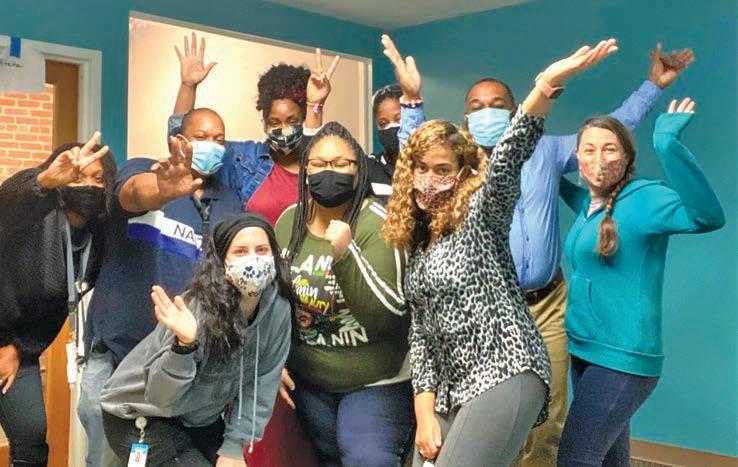
“The point is: what community members in the city of Atlanta want is to have options like PAD,” Macias said. “It’s up to the people to say, ‘This is what we want. This is where want our public dollars to go. This is where we want our policies to respond to. This is what our communities, as a whole, deserve to better meet our needs.’”
Working closely with the MARTA and Atlanta police departments, among other city institutions, to educate on how most effectively to address and identify situations where an individual is in need of care and support, PAD accepts pre-arrest diversion referrals from the Atlanta Police Department, MARTA, and Georgia Tech. As a community member, you can refer an individual by calling 311 for nonemergency assistance (police do not respond to 311 calls).
You can see the PAD team in this year’s Pride Parade on Sunday, October 9. If you want to learn more about supporting the mission of PAD, visit atlantapad.org. For community outreach, you can email the organization at info@atlantapad.org.
44 PRIDE OCTOBER 7, 2022 THEGEORGIAVOICE.COM
Adalei Stevens
The
staff of PAD PHOTOS COURTESY OF PAD VIA FACEBOOK PRIDE
SHOW Y UR PRIDE
us at the Atlanta Pride Parade on October 9, 2022 and at our Pride Night Game vs. the Phoenix Suns on February 9, 2023.


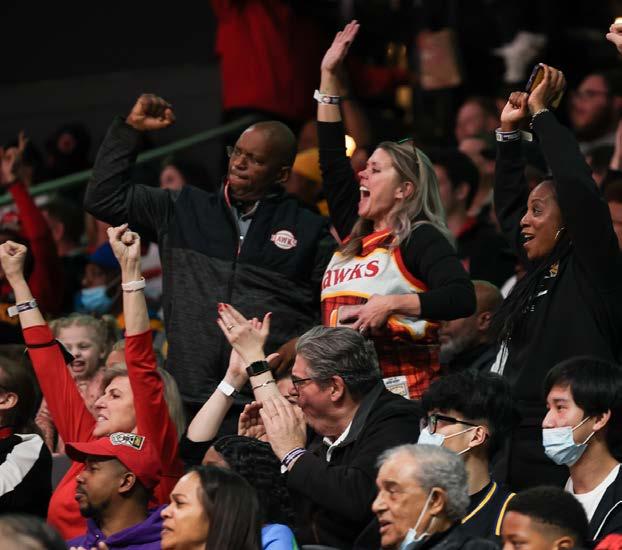
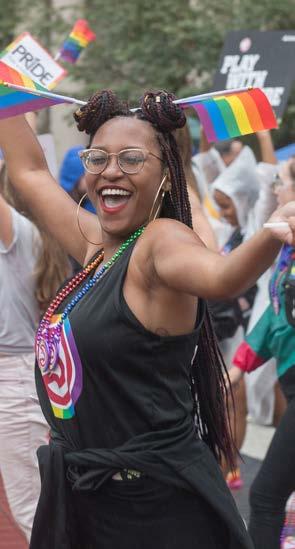

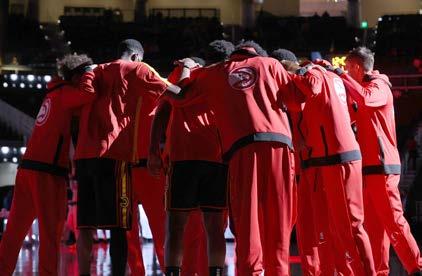

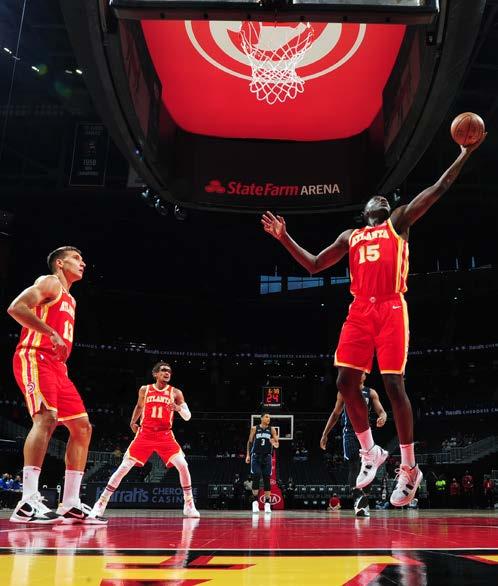
@ATLHAWKS | #TRUETOATLANTA | HAWKS.COM | STATEFARMARENA.COM
Join
Corporate Year-Round Allyship with Matt Keith at Bank of America
Katie Burkholder
Every year for more than 50 years, Atlanta Pride has attracted people from around the country to come together and celebrate LGBTQ history, survival, and joy. It’s only in more recent years, however, that the annual festival and parade have begun to attract corporations interested in showing their support to the LGBTQ community.
One such corporation is Bank of America. The national financial institution will have a presence at this year’s Pride celebration, but visibility is only one pillar of its LGBTQ allyship.
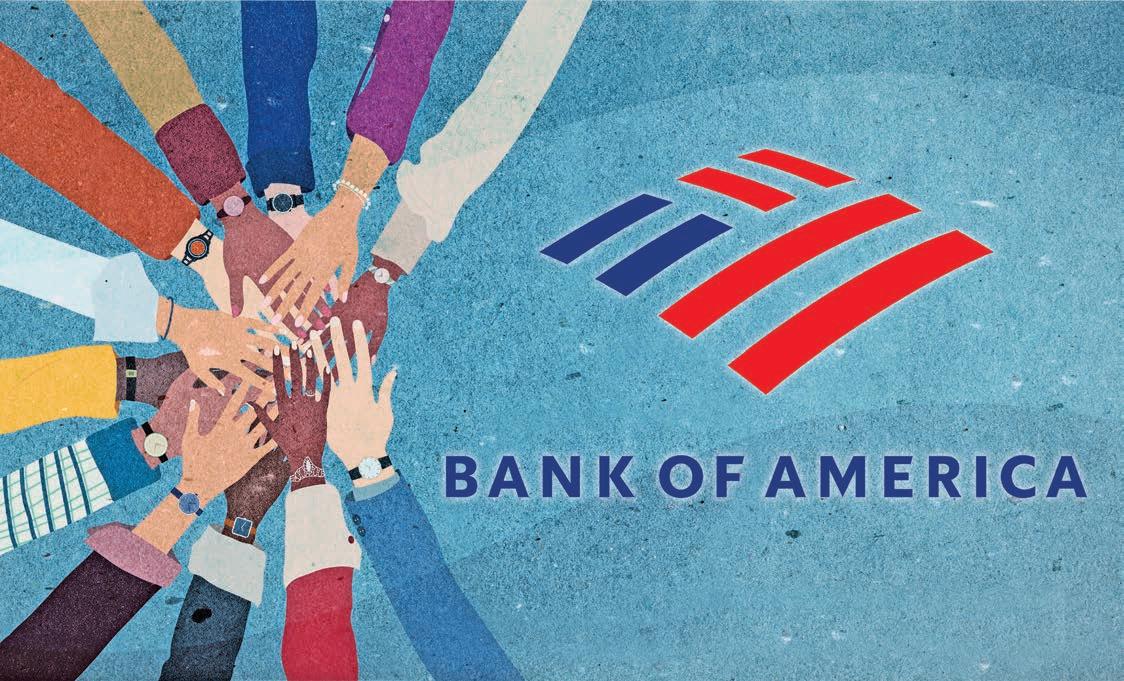
“Within Bank of America, we have — similar to a lot of other corporate organizations — employee network groups, also referred to as employee resource groups,” said Matt Keith, the Senior Vice President of Business Strategy and Initiatives / Market Integration Executive at Bank of America. “We have several different groups, and obviously LGBTQ is one of them. This network group is formalized across the enterprise; we have chapters globally. We’re focused on targeted strategy, awareness, and engagement across the organization. It’s really fantastic, and it really supports our focus in terms of diversity and inclusion within the organization.”
Keith is the Executive Sponsor of Georgia’s LGBTQ employee network at Bank of America as well as an active participant in Atlanta’s LGBTQ community, serving on the Board of Directors for OUT Georgia and as co-chair for the Mayor’s LGBTQ Advisory Board.
Keith told Georgia Voice that Bank of America’s allyship and LGBTQ support consist of “different pillars,” from visibility
and support to tangible benefits and services.
“A lot of the benefits our company has offered … show our advocacy,” he said. “We’ve got an ally program within our organization with over 30,000 members. We are one of the first financial institutions that have offered health insurance that covers medically necessary procedures for gender transitioning. We provide comprehensive domestic partner benefits and include sexual orientation nondiscrimination as part of our policy.”
“Within the communities we serve, we have a targeted approach with our clients,” he continued. “We have specific products and
services that are tied to the community. For investment planning, for financial planning, we have programs that are targeted to the LGBTQ community specifically.”
Keith says the company also values being “actively engaged and involved” in the community and local nonprofit organizations. While in-person Pride was canceled the past two years, Bank of America “tried to ensure we stayed connected.”
“We helped when it was virtual, we partnered with local TV stations and showed our support by being a sponsor of it being televised,” he said.
This year, Bank of America will participate in the annual Atlanta Pride Parade on Sunday, October 9. At the time of speaking, Keith said that 135 people had registered to walk.
“Everybody is super thrilled to get back to some normalcy,” he said. “I think our organization speaks for itself in terms of our engagement and involvement. I’m super thrilled that we’re going to be able to participate this year at Pride back in person, and we just want to continue to show our support.”
Learn more about Bank of America’s LGBTQ initiatives at about.bankofamerica. com/en/making-an-impact/lgbtq-equality.
46 PRIDE OCTOBER 7, 2022 THEGEORGIAVOICE.COM
IMAGES BY SHUTTERSTOCK.COM / MELITAS; BANK OF AMERICA
PRIDE


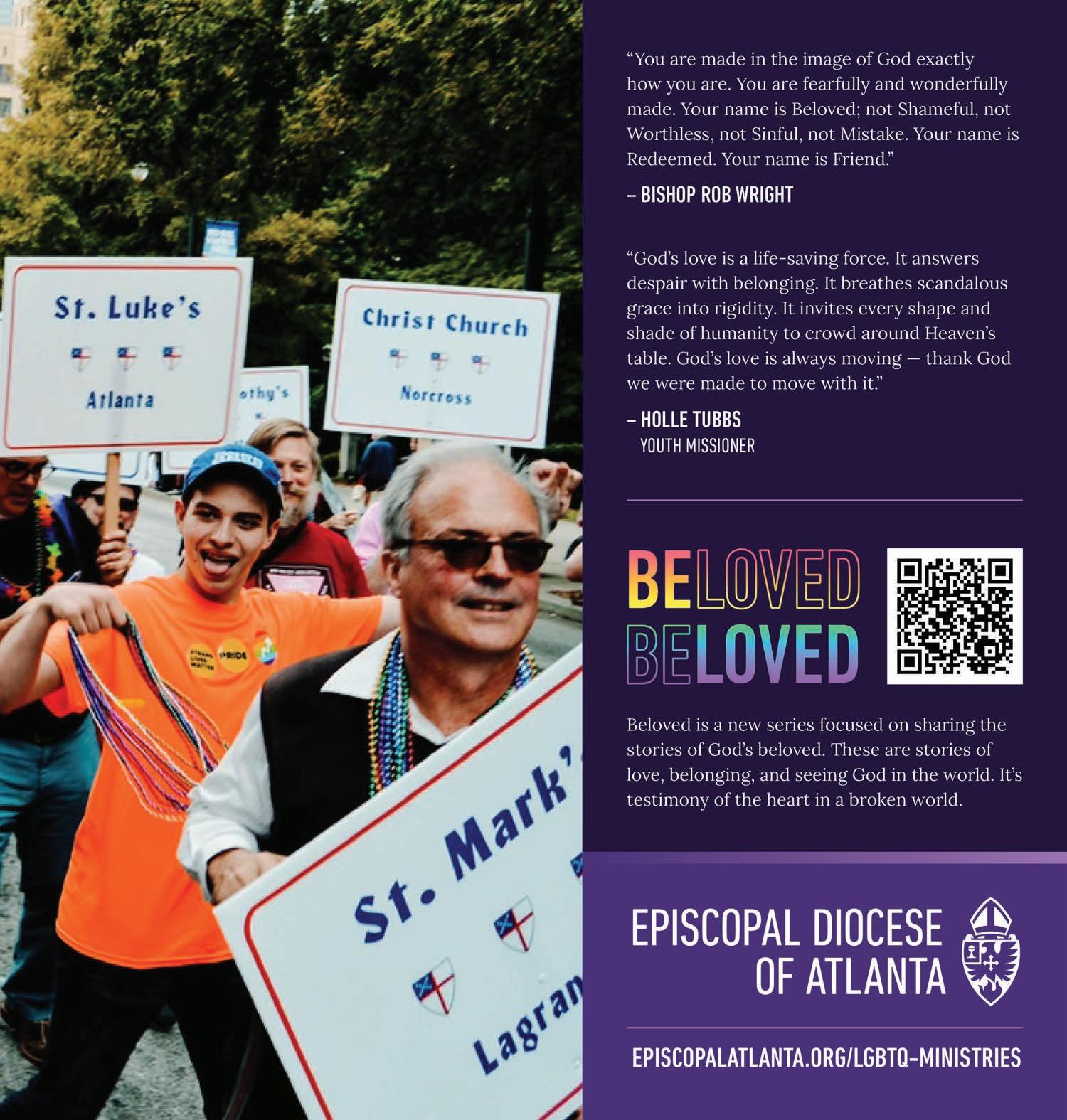
Latino LinQ: Seven Years of Growth & Leading Initiatives for the Queer Latinx Community
Cynthia Salinas-Cappellano
Latino LinQ set out in 2015 to identify the key needs of Latinos in the Atlanta metropolitan area. The nonprofit provides access to health care information for the Latino community. For seven years now Latino LinQ has been expanding HIV testing in the Atlanta area, primarily through community outreach events and popups. Latino LinQ expanded access to HIV prevention and care services: patients are served from diagnosis to treatment by Latino LinQ and its affiliates.
Eric Rangel spoke to Georgia Voice about his time onboarding as Latino LinQ’s new Board President.
“We’re not only going to focus on our HIV testing efforts, and HIV education prevention efforts, but rebuild our discussion support groups,” he said.
Latino LinQ conducts monthly HIV testing and education at the Mexican consulate. Now, the organization is expanding its outreach.
“[W]e’re providing free HIV testing at Walgreens 6pm to 8pm, hopefully on Mondays,” he said.
The nonprofit is looking to develop a relationship with Positive Impact Health Centers as their point of care, so they can holistically serve the community, or if queer Latinos are simply looking to receive other services like PrEP.
“With new energy comes new ideas,” said Rangel, who comes from a political background he hopes to use in Latino LinQ’s upcoming initiatives this year. “We’re going to go into voter registration, and voter education, and hopefully, next year during the legislative session, we’ll be at the state
Capitol advocating for health care bills, bills benefiting DACA recipients, and on the House side, in-state tuition.”
As a nonpartisan organization, Latino LinQ aims to politically empower Latino residents by informing them of their voting rights, as well as their rights to health care in the state of Georgia.
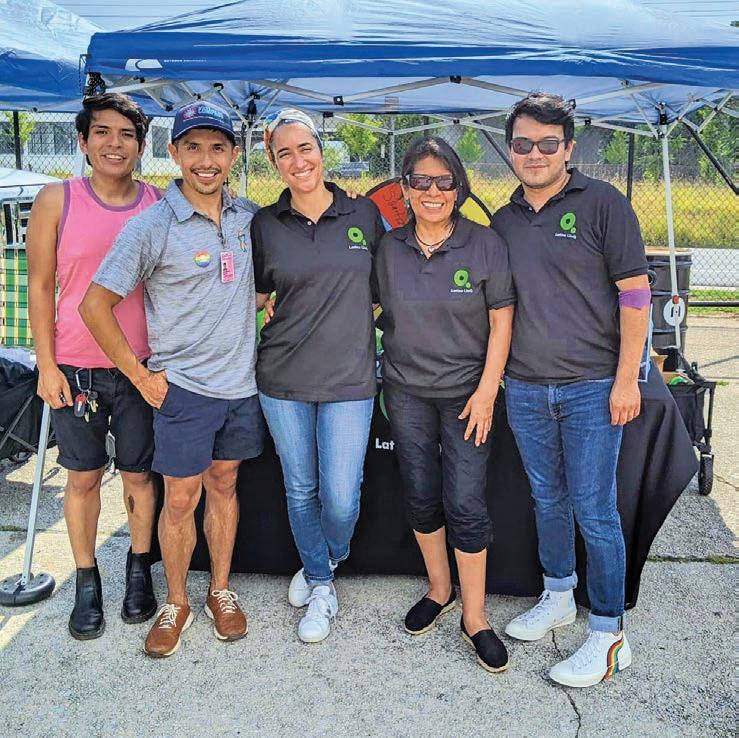
The nonprofit also conducts virtual town halls in Spanish to inform the community about preventing the spread of COVID-19, monkeypox, and STIs. This ensures that Spanish speakers do not have to drive long distances to receive the information they
need. In-person initiatives range from Norcross to Midtown.
“We go anywhere people need us to ensure they are aware of the services available to them,” Rangel said.
Rangel also honors the work of the previous board president, who continues to work as a volunteer within the organization while pursuing a degree at Emory.
“I thank my predecessor, Humberto Orozco, who began our work with Fulton County Health Department and some Emory physicians,” he said.
The organization continues to create a safe space where queer Latinos can access information and health care in the language residents need.
Latino LinQ currently works on several projects with Emory to assess demonstrated community needs such as mental health services, transportation, financial needs, HIV care, medication access, and HIVrelated counseling. They hope to receive more information on how to serve the community through surveys and interviews.
“We realize HIV is still endemic, so we have several projects with Emory,” Rangel said. “I’m working with students from Emory University to do a community assessment. We want to break down barriers so folks from the queer Latinx community can have access to care: mental health services, HIV care, medications, and HIV-related counseling. Our next project is to establish an HIV peer navigator to conduct testing and escort our patients to treatment.”
Looking toward the future, Latino LinQ is holding an annual, one-day summit this fall, sponsored by the Southern HIV Impact Fund. Topics will range from mental health counseling and HIV care to language justice.
Other projects in process include the Welcoming America mural, with folks coming together to represent their community creatively. The mural will be in one of the Latin American Association’s office locations in Brookhaven or Buford.
In the past seven years, Latino LinQ has established itself as an organization dedicated to the needs of queer Latinos. We can expect their continued response to the extensive health care needs in our community, and now, expanding Latino votership in the state of Georgia.
50 FEATURE OCTOBER 7, 2022 THEGEORGIAVOICE.COM
FEATURE
Latino LinQ PHOTO VIA FACEBOOK
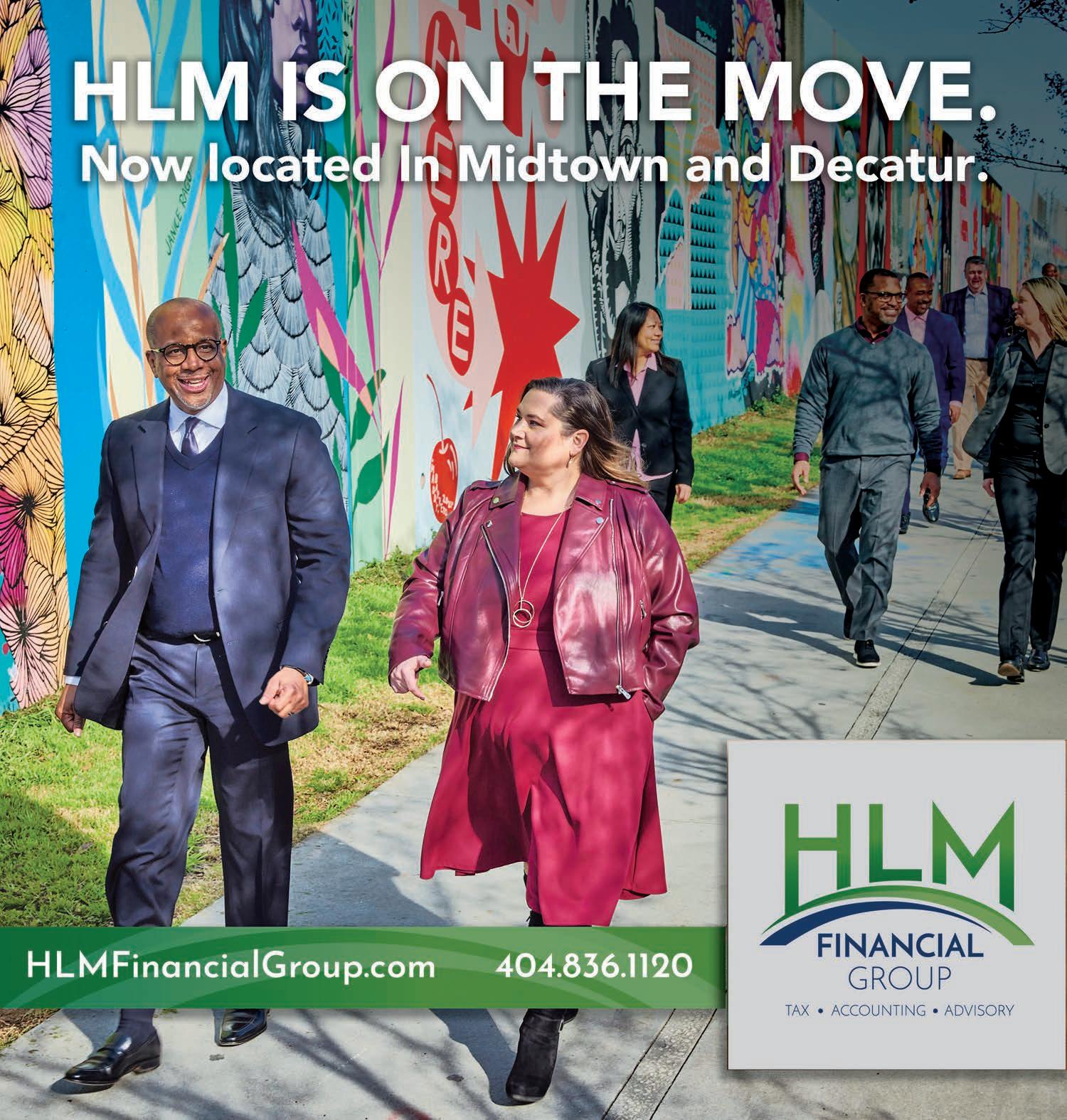
Life’s Intersections: An Examination into the Differing Identities of Queer College Students
Syd Clark
In honor of Atlanta Pride, it’s important to remember the importance of intersectionality and how society’s many forms of discrimination can affect their identity as someone who belongs to the LGBTQ community.
Intersectionality is how varying social identifiers like race, sex, class, gender identity, sexuality, and religion accumulate to form distinct experiences of oppression and discrimination. To explore how intersectionality informs people’s decisions and experiences, I’ve interviewed four LGBTQ individuals, each with a different cultural background.
I spoke with Carl, a South Asian bisexual man; Jake, a Haitian bisexual man; Marie, a Trinidadian bisexual woman; and Leona, an Afro-Latino lesbian and nonbinary individual.
All the interviewees requested that they remain anonymous, as most of them haven’t been able to talk with their parents about their sexuality. Therefore, all names used are pseudonyms.
GENDER EXPRESSION AND CLOTHING
A common theme throughout the interviews was that the strict binary of clothing or mannerisms associated with gender had impacted their LGBTQ identity. Both Carl and Marie spoke about how they felt freer in terms of gender expression via the avenue of dress; however, after pressure from their familial circles, their mindsets on expression began to evolve.
According to Carl, “As you get older … you become more aware of your social norms,” however, he says as a child, he’d “always play with his mom’s clothes, [but] I’d always play
with my dad’s clothes too” and as he aged, he “quickly came to realize I can’t [dress in women’s clothes] outwardly.”
Marie had a similar experience in how people perceived her style of dress. “My dad told me not to wear baggy clothes because I would look like a boy,” she said. “Being Caribbean, [there are] very strict gender roles, so they didn’t want me to look like a boy.”
Society expects men and women to behave in a particular manner and deviating from this norm could lead to negative perceptions. Carl emphasized this notion when speaking about his femininity, saying he was “much more outwardly feminine in public spaces,
and I cringe not because I hated ... being feminine, I hated the perception ... and thus [people would make] an assumption about me and … not see me in a certain way.”
RACE & ETHNICITY: BELONGING
Interviewees Marie, Jake, and Leona all spoke about their unique experiences with race and how it has impacted their lives.
Marie said that a common issue many Black women face is hypersexualization. She emphasized that this problem has created issues for her when in relationships: “People hypersexualize Black women already … it
makes it weirder to be more open about your relationships.”
Jake spoke about the Black community and whether they’d accept this side of himself. “From within the Black community ... I feel like an outsider sometimes,” he said.
Leona, who is Afro-Latino, echoed this sentiment, saying they “fear the consequences of being a lesbian in their family.” They emphasized how they fear a lack of acceptance because of how “Black and Latino people[‘s] feel[ings] about gay people, it’s … not positive at all, especially in older generation[s].”
They all mention fear of judgment and an inability to be open and honest about their LGBTQ identities because of their race.
STRATIFICATION OF IDENTITIES
A common thread throughout the interviews was that they’ve all had to place one identity in front of another to appease family, friends, or even themselves. They’ve all decided to not share an integral part of their identity with others to keep themselves safe from harm or discrimination.
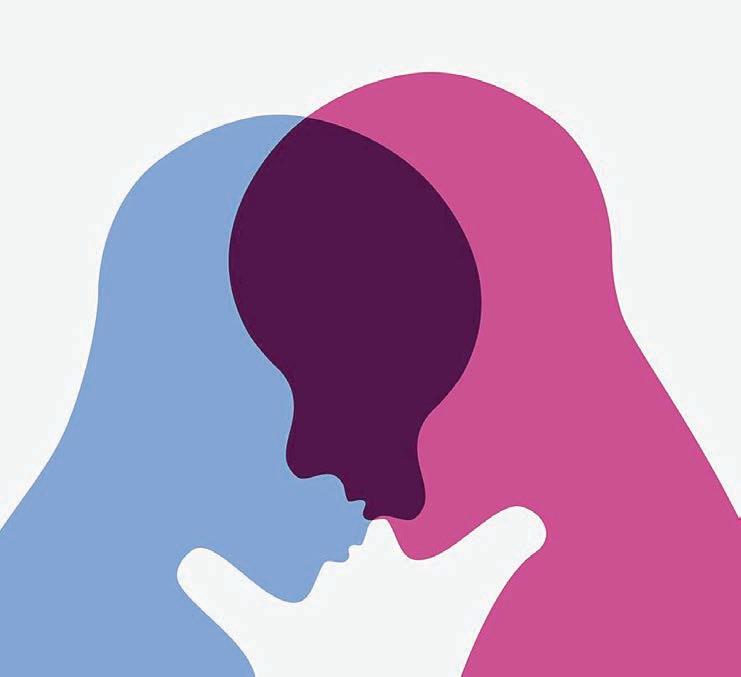
Leona said that with their Black and Latino family, they “always have to put queerness aside … queerness can never show up.” However, at school they feel more able to be unapologetically themselves.
A similar assertion was made by Marie. Marie said that “being Black comes first, ‘cause it’s the first thing people see.”
“I keep that I’m bisexual to myself,” she said. “It takes a back seat to me being a Black woman because people see me as a Black woman.”
52 YOUR VOICES OCTOBER 7, 2022 THEGEORGIAVOICE.COM
YOUR VOICES
IMAGE BY
SHUTTERSTOCK.COM

OUR DUTY OF SERVICE
Cathy Woolard

To whom much is given, much will be required, so the Bible verse goes. “Service is the rent you pay for your room here on Earth” is credited to Muhammad Ali. The phrase “Tikkun Olam” or “repair of the world” is understood by the Jewish community to refer to the responsibility to make the world more just and peaceful through acts of charity, kindness and political action. While each concept is a bit different, they all call upon individuals and communities to do more in service to others to make our world a better place.
Each year, Pride brings us together to celebrate our accomplishments, to provide a balm to our souls when facing setbacks and to inspire us to look to the future together. We’ve accomplished amazing transformations together in the last 35 years or so. So much so that most of us
can expect to thrive in ways that members of our community wouldn’t have believed just a generation ago. That would trigger, in my mind, the first phrase, as we have been given much in our lives — so much so that it’s time to look at what we do with the gifts we’ve been given and ensure that we are using the freedom to live our best lives and lift others still in struggle. Voting is one of the responsibilities we are all asked to fulfill that can have a huge impact on our communities, our country, and our world.
It takes so little to perform service to others. Sometimes it’s just a spontaneous act — helping someone open a door or quietly paying for the groceries of someone in need. Sometimes it’s organizing a bigger effort like a community cleanup or volunteering to work at the polls on Election Day. The beauty of this is that we are free to choose the service that gives us joy while helping others find joy too. The admonition to us is that the service should be as regular as paying rent. Developing a service-oriented mindset is not
hard — it’s more like exercising a muscle. The more you do it, the easier and more rewarding it becomes.
Repairing the world seems daunting, but we are certainly at a place where justice and peace are needed. Doing individual and group acts of kindness and charity can create ripples that extend far beyond where we stand today. Political action is an instrument we play well. Because our community is made of many diverse communities, our capacity for impactful political action is huge. Working collaboratively with others to mobilize people to vote for the change we want to see in this world is a timely opportunity.
While we still have much work to do to protect our hard-fought gains and to ensure everyone in our community has what they need to succeed, we have the capacity to look beyond ourselves and consider what we can do to help others achieve their goals.
I’d be remiss, as Chair of the Fulton County
Board of Elections, if I didn’t make a very explicit request that every single member of our community commit to voting in this (and every) election. It’s the easiest service to perform that truly can help heal the world. Voting doesn’t cost money; you don’t have to go to a meeting or do anything “extra” to participate. All you need to do is register and show up to cast your vote. The last day to register to vote in this election is October 11 (coincidentally falling on National Coming Out Day!).
Please make a plan to register and vote by going to mvp.sos.ga.gov/s to review your voting status, precinct location, advance voting locations and hours, and even to register to vote if you’ve not done so already.
The benefit of service falls as much to the one serving as to the person or people receiving the help. Consider making Pride season the time that we come together to see how we can use our collective and individual efforts to heal the world. We all know it needs it!
 PHOTO BY SHUTTERSTOCK.COM
PHOTO BY SHUTTERSTOCK.COM
54 YOUR VOICE OCTOBER 7, 2022 THEGEORGIAVOICE.COM
YOUR VOICE


THEGEORGIAVOICE.COM OCTOBER 7, 2022 ADS 55
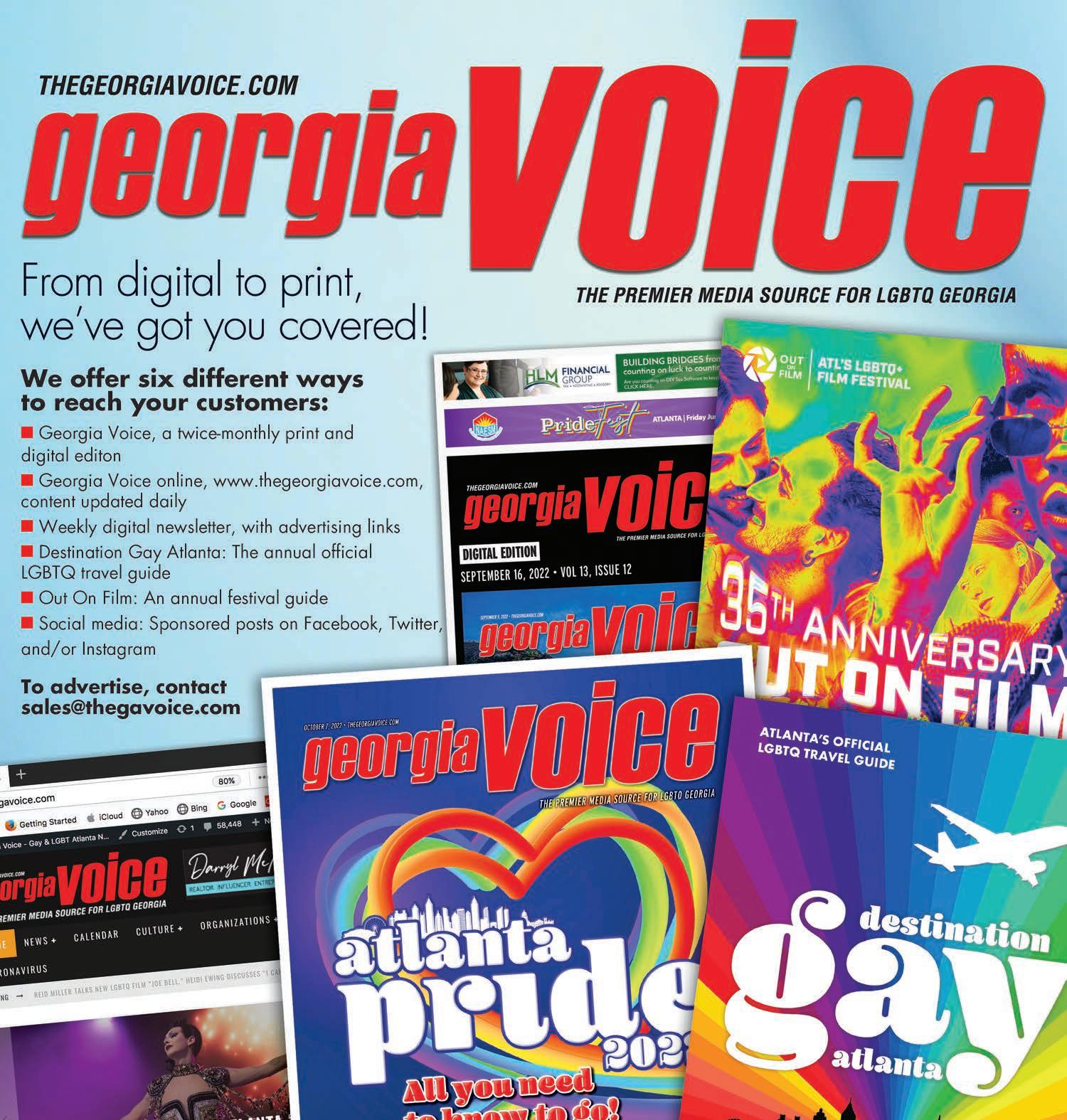

ON DR. JOHN PETERSON
Craig Washington
This is the fourth article from “Reclaiming Our Time: A History of Atlanta’s Black LGBTQIA Life”, a series of editorials that chronicles one of the city’s most definitive communities.
At a time when titles of distinction are too freely given or self-proclaimed, it should be soundly understood that Dr. John Peterson was a true legend. Dr. Peterson, a psychology researcher and professor emeritus at Georgia State University, was one of the first researchers to focus primarily on HIV transmission among Black gay men. He did not limit his inquiry to rates of condomless anal sex or numbers of sexual partners. John sought to uncover the real reasons driving stark HIV health disparities between Black and white gay and bisexual men. Through scores of studies and thousands of interviews, John and his colleagues asked the questions about Black gay men’s realities that white counterparts had neither the interest nor competence to consider. His evaluative work on HIV risk reduction highlighted the value of cultural affirmation as a component of Black gay men’s interventions. John believed that a heightened sense of community, belief in one’s own inherent worth (i.e, a deeper love), as supported by robust infrastructure (daytime spaces and activities beyond the club), could help reduce new infections and sustain the wellbeing of Black gay men of either HIV status.
The Deeper Love Project, an HIV prevention program I developed at AID Atlanta, was based upon a three-session intervention pilot John had co-created. I was one of several Black men who were taught and inspired by him. I never took his class at Georgia State University, but I was nonetheless one of his students. By the time I had started presenting Deeper Love in 1997, many of our “angelic troublemakers” Joseph Beam, Audre Lorde, Essex Hemphill, and Marlon Riggs (a dear
friend of John’s) had passed on. John was a surviving genius who outlived friends and contemporaries to guide successive generations in their endeavors to save the lives of Black gay men. Like a doting uncle, he could dole out praise or compassionate criticism about my work. He cared enough about me and the community to which we were both committed to not let me falter in deed or in spirit.

One of the palpable marks of greatness John bore was his fertile and fervent generosity. He gave far beyond the requirements of his field. He supported Neena Smith-Bankhead, the first Black woman to lead AID Atlanta’s HIV prevention department. His mid-
’90s collaboration with Smith-Bankhead secured major funding and heightened the agency’s investment to address the most heavily burdened population. Through the Y.A.M.S. (Young African American Men’s Study) Project, John convened key Black gay men’s organizations and programs (Second Sunday, Deeper Love Project, Brothers Back-To-Back, NAESM) to acquire critical knowledge about younger men’s social networks and norms. The forceful brilliance of John’s leadership opened his collaborators’ eyes to recognize the full measure of their obligations to community.
By 1997, Second Sunday had become Atlanta’s largest Black gay men’s organization.
“At a time when titles of distinction are too freely given or selfproclaimed, it should be soundly understood that Dr. John Peterson was a true legend. Dr. Peterson, a psychology researcher and professor emeritus at Georgia State University, was one of the first researchers to focus primarily on HIV transmission among Black gay men.”
John gave Second Sunday a kind of support they could not have gotten from any other individual. When Second Sunday organized its Freedom Retreat in the autumn of 1997, John volunteered time and labor to facilitate breakout sessions about HIV stigma for serosegregated groups. He authorized Adodi Muse, a gay Negro ensemble, to incorporate quotes from his research for “Burning From Your Touch,” a staged dramatization of Black gay men’s beliefs and practices performed for a Second Sunday audience.
The last time I worked with John was for the Tony Daniels Leadership Institute. Charles Stephens, Amistad Arromand, John, and I co-organized a forum for select Black queer
RECLAIMING OUR TIME: A HISTORY OF ATLANTA’S BLACK LGBTQIA LIFE CRAIG WASHINGTON
58 COLUMNIST OCTOBER 7, 2022 THEGEORGIAVOICE.COM CONTINUES ON PAGE 60
Dr. John Peterson COURTESY PHOTO

CONTINUED FROM PAGE 58
men to identify urgent needs, resources, and strategies. Our team ranged in age from mid-sixties to early thirties. Again, I was privileged to work shoulder-to-shoulder with brothers of different generations toward a common goal. My brother Maurice Cook joined me to tell participants about our late friend Tony and his contributions. And when I heard of John’s passing in June 2021, I first thought of this our last joint effort. This conjured a second memory, one of John and Tony Daniels at the 1997 Atlanta Black Pride (less than one year later, Tony would be killed in a car accident en route to the 1998 D.C. Black Pride). Second Sunday was holding its Pride event “Where The Boys Are” in downtown Atlanta. At the peak of festivities, that enduring ritual, the dance floor circle formed around the most spirited dancers. In the center were John and Tony strutting about without restraint. And longlegged John, who on occasion referred to himself as “Leontyne,” goose-stepped in full regal abandon. He looked utterly joyful, as if this was his moment. He looked as if he felt at home, as he was among his brothers, those to whom he had given so much of himself.
If you are an HIV prevention specialist working with Black gay men, your work has been influenced by the contributions of Dr. Peterson, as well as those he worked with and/or mentored. Dr. Peterson helped mold other illustrious Black men in HIV prevention and research (Dr.
David Malebranche, Gregorio Millet) who themselves have made history. If you are a Black gay man (or however else you may or may not identify), you should know that Dr. Peterson helped enable your individual survival and the survival of your tribe.
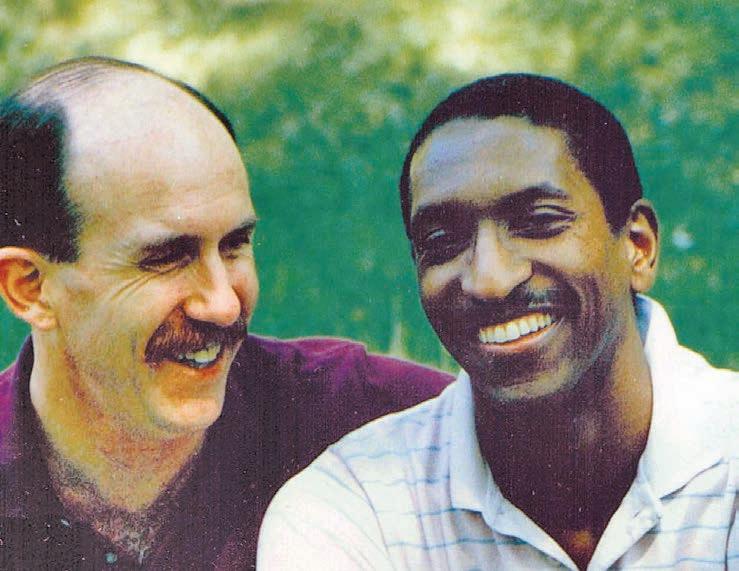
Two weeks before the 40th anniversary of that first public notice about AIDS, this titan who endured the worst of it and remained HIV-negative succumbed. Less than one month before Black gay men launched a 2021 remembrance of Second Sunday, an event at which he might have shared precious narratives, he was suddenly gone. As before in life, and now in death, John has very few peers, and virtually none within the area of HIV prevention research for Black gay men. It is imperative that we hold him in our highest esteem for he has certainly earned no less than the superlative. By the force of his unshakable faith in Black gay men and his good works, the most enduring manifestation of that faith, he ascends. He holds a reserved chair in the upper room of our history.
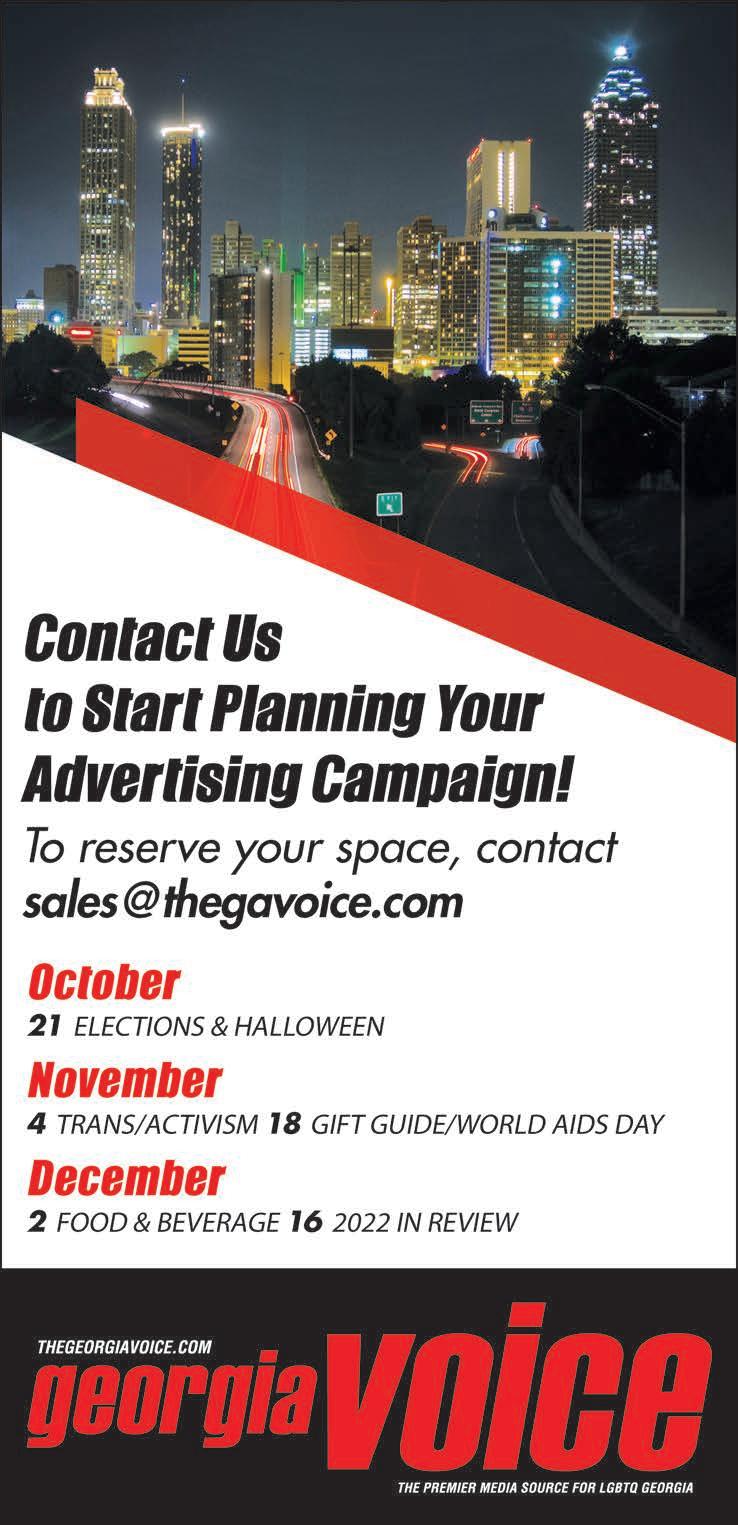 John Peterson (right), and his domestic partner, Lupin Loughborough.
PHOTO COURTESY OF GREGORIO MILLETT, MPH
John Peterson (right), and his domestic partner, Lupin Loughborough.
PHOTO COURTESY OF GREGORIO MILLETT, MPH
RECLAIMING OUR TIME
CRAIG
WASHINGTON
60 COLUMNIST OCTOBER 7, 2022 THEGEORGIAVOICE.COM
“If you are an HIV prevention specialist working with
Black gay men, your work has been influenced by the contributions of Dr. Peterson, as well as those he worked with and/or mentored.”
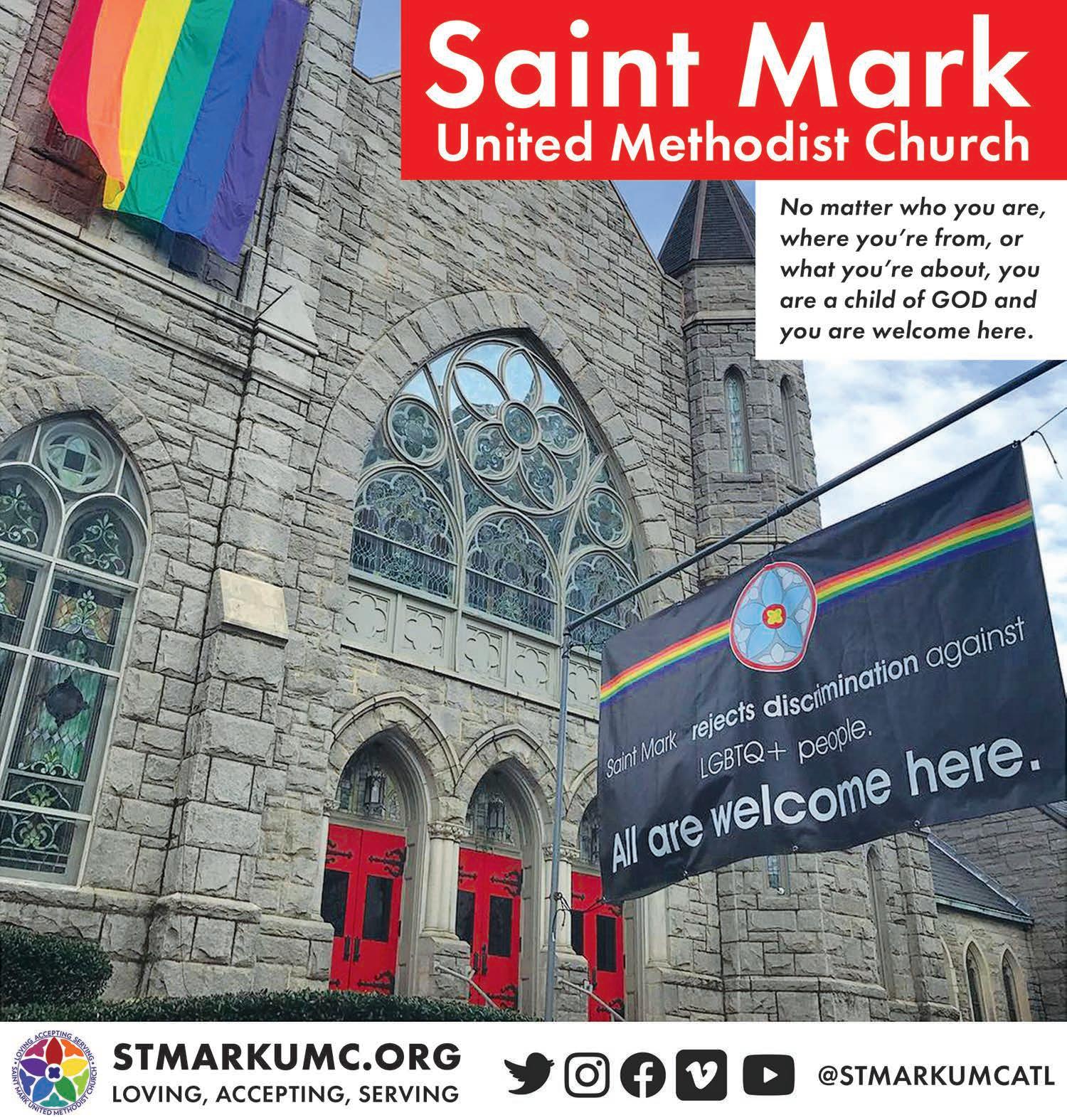



A VOICES OF NOTE Production Season Sponsor: Tickets and more at: AGMCHORUS.ORG FERST CENTER FOR THE PERFORMING ARTS 349 Ferst Dr NW, Atlanta, GA 30332 2021-2022 SEASON
‘MEMORY BOOK’ DETAILS HISTORY OF
1970S-ERA LGBTQ ATTORNEYS IN U.S.
Eric Burkett, Bay Area Reporter, courtesy of the National LGBTQ Media Association
Stephen Lachs remembers the 1970s as being a particularly wonderful era in the history of the LGBTQ liberation movement.
Lachs, 83, was the first out LGBTQ person appointed to a judgeship in the United States. Tapped by then-Governor Jerry Brown, the Los Angeles County Superior Court commissioner was appointed in 1979 to sit as a judge on the county’s Superior Court.
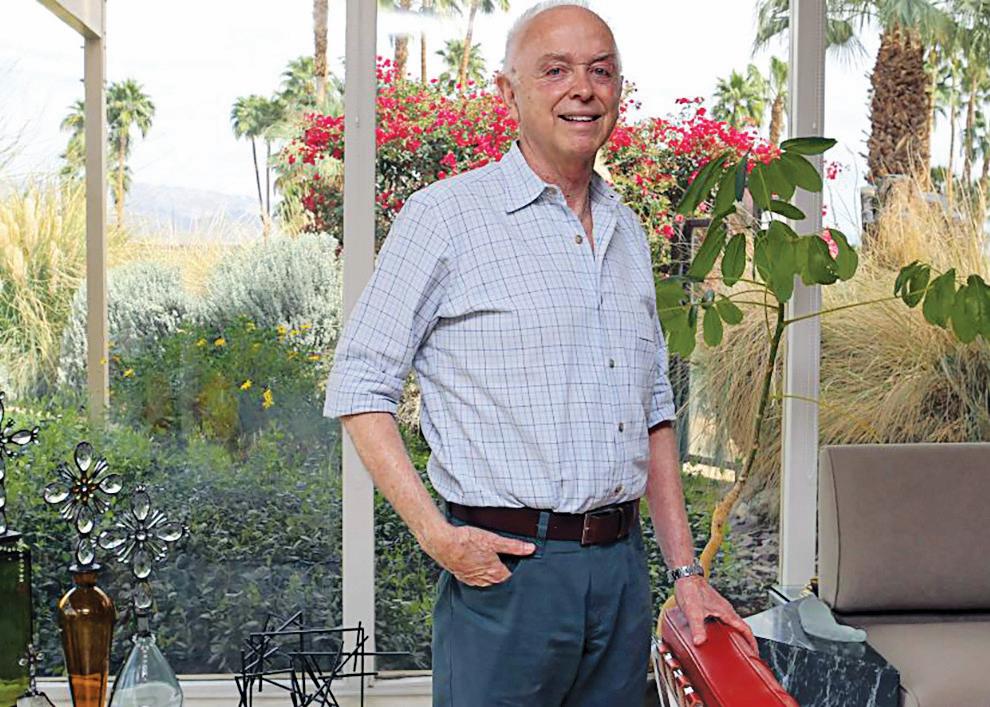
Commissioners, Lachs explained, did essentially the same work as judges, but unlike judges, who were appointed or elected to the bench, commissioners had to be agreed upon by both parties in a case.
“Governor Brown had received a lot of support from the gay and lesbian community,” said Lachs in a recent phone interview. “During those first two terms he served, he sought the nomination for president, and the gay and lesbian community was very supportive and helped him” (Brown had run for the Democratic presidential nomination in 1976 and 1980).
But there had also been grumbling by members of the community that, despite having served a full term already, Brown hadn’t appointed anyone from the gay and lesbian community to anything.
“A lot of people in the community were upset with that,” Lachs said.
So, after looking for the right person, Brown decided upon the Superior Court commissioner from L.A. With four and half years of experience at the court already, and well established within the community not only socially, but also
politically, Lachs got the nod.
It was a huge deal and was reported around the world, said Lachs, who still keeps a clipping from a Greek newspaper of the time covering the event. Wikipedia suggests he might have been the first openly gay judge serving anywhere in the world.
But despite the historic appointment, Lachs was really only one of hundreds of attorneys and, later, judges around the United States at the time who were fighting for change. The 1970s saw an explosion of political organization by nascent gay and lesbian groups, and the legal profession was very much at the center of much of that.
That period, to many of those who braved a society hostile to their kind, was “really a remarkable time,” as Lachs described it.
“You were doing exciting things, meaningful things and, I don’t know, it just seemed like
a wonderful, wonderful period.”
That era has been memorialized in “Memory Book,” a documentation of the people — men and women, gay, lesbian, bisexual, and trans — who fought for change in the 1970s. The book is part of a larger project titled Birds of a Feather, commemorating the 50th anniversary of the first forum on gay rights of the American Bar Association in 1972.
“The seventies saw the formation of the first gay law students associations,” writes “Memory Book” editor Thomas F. Coleman in the introduction. “The first few were formed in 1972 with others following as the decade progressed. The first forum on gay rights occurred in 1972 at an annual meeting of the American Bar Association, with positive position statements and committees on gay rights happening within the ABA in the next few years. Being an openly gay or lesbian law student or lawyer was not yet common at the
ABA, but it was no longer a rarity.”
Nor was it easy. Coleman’s book, which he said he spent almost a year researching and compiling, details the achievements and struggles of hundreds of individuals from all over the country — although, notably, many of those celebrated are from Northern California, where, he pointed out, there exists much more documentation of their work thanks to the archives of the Bay Area Reporter, which was founded in 1971.
Coleman, a gay man, undertook the project, he said, when he realized the 50th anniversaries of a number of events — the formation of the first gay law association and the ABA’s forum on gay rights — were coming up.
“I thought, 50th anniversaries only come once,” said Coleman, 74. “There needs to be something to commemorate the 50th anniversary.”
The bigger question, of course, was who was going to do it?
“I’ve got the memory, the interest, the ability,” he said. And then he decided to broaden the project’s scope beyond 1972 to encompass the whole decade. It was, he said, “a breakthrough decade.”
Many present-day lawyers, as well as the public and the LGBTQ community, take for granted many of the rights we have now, Coleman said, and many of those rights were advanced in the 1970s.
“I think it’s important our history is documented,” Coleman said. “Especially to a large extent, including people who were still alive, who were participants, but also to tell
64 LGBTQ HISTORY OCTOBER 7, 2022 THEGEORGIAVOICE.COM
Stephen Lachs PHOTO COURTESY OF AEPI.ORG
LGBTQ HISTORY CONTINUES ON PAGE 66

the story of people who weren’t grabbing the headlines but whose actions really contributed to advancing the moment during what I call ‘the breakthrough decade.’”
Many of those who didn’t grab the headlines were working in places like Minnesota.
Steven Block, who was a founder of the groundbreaking Bay Area Lawyers for Individual Freedom in San Francisco in 1980, eventually moved to Minnesota, where he died from AIDS-related complications in 1984 just shy of his 34th birthday. During his short career, he represented clients for Gay Rights Advocates and did pro bono work for the American Civil Liberties Union.
“As a person and as a professor, Steven made a lasting impression on his colleagues and students,” wrote Coleman in Block’s biography. The University of Minnesota Law School annually awards the Steven M. Block Award for the “[m]ost outstanding paper or article by a graduating student in the area of civil rights and/or civil liberties.”
In Florida, in 1974, attorney Robert Eimers was summoned shortly after passing the state bar “for a special hearing by the Florida Board of Bar Examiners where he was asked if he was a homosexual. Robert answered affirmatively,” the biography states.
Such a procedure was unusual, Coleman noted in Eimers’ bio, but Eimers explained that “someone had written to the Florida Bar as an act of revenge because Robert would not perjure himself in a lawsuit.”
The U.S. Supreme Court weighed in, ruling that “an applicant’s admission of having a homosexual orientation, in and of itself, would not preclude admission to the bar. However, the court said that it was not ruling on what would happen if the applicant admitted to engaging in criminal sexual acts. Homosexual conduct between consenting adults in private was criminal in Florida. During the two years he was waiting for a decision in Florida, Robert was practicing law in Philadelphia,” according to the biography.
The ruling proved relief to LGBTQ law
students in other parts of the country where the matter was still unsettled. Eimers died in 1999 in Florida.
Katharine English, a bisexual woman who was excommunicated from the Church of Jesus Christ of Latter-day Saints at age 18, attended Lewis & Clark College’s Northwestern School of Law in Portland. She graduated in 1978.
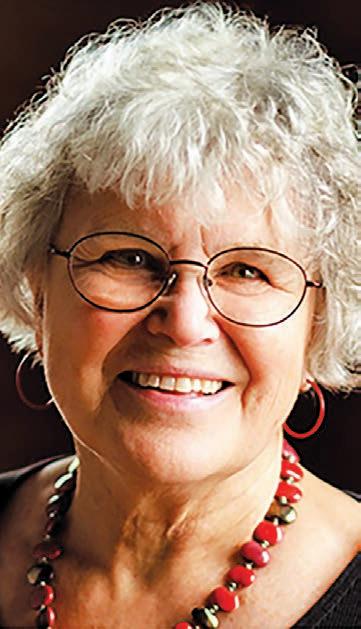
English “started her own law firm with her lover, Janet Metcalf, a well-respected lawyer who had clerked for the Oregon Supreme Court and the state Court of Appeals,” states her biography. “English and Metcalf are both distinguished lawyers who might have had their pick of work at downtown Portland’s large corporate law firms. Instead they opened their own office in a modest fivestory, brick building in an older district near the Willamette River. Because of their legal skill and dedication to equal rights for lesbians and gay men seeking child custody, English & Metcalf was a success from the beginning.”
English told Coleman “that being a lesbian was partly responsible for the development of her interest in the law. She is the mother of two boys and her own child custody dispute
prompted her involvement in gay rights and family law.”
As Coleman was working on “Memory Book,” he said he realized that the book needed one more element: everyone he was writing about from that era was white. As he researched, he said he was unable to find people of color who were doing similar work at the time. He asked a present-day law student, Maria Reyes Olmedo, to write a chapter (Olmedo was unavailable for comment for this story). The result is in the postscript: “The Emergence of Nonbinary, Transgender, and Students of Color as LGBT Activists.”
Thomas Horn, the publisher of the B.A.R. from 2004 to 2013, also has a chapter. A lawyer himself, Horn spent much of his practice in the 1970s representing gay clients.
“He defended men who were being separated from the military due to their sexual orientation,” Coleman wrote. “He also engaged in criminal defense, representing men who had been arrested for lewd conduct by undercover vice officers.”
“I represented a lot of gay service people, back in the day when they were still busting men for having indiscretions in the park, or entrapping people in public restrooms,” Horn told the B.A.R.
Horn did much more than that, however, both in his native New Mexico, where — still closeted — he advocated for gay rights and sexual civil liberties as legal director of that state’s ACLU. In that capacity, he challenged New Mexico’s sodomy law, and while the court declined to address the matter because it determined Horn’s client lacked standing to raise the issue, the dissent written in that case “was later cited favorably in judicial opinions in other states,” noted Coleman.
Horn, who moved to San Francisco in 1976, would eventually go on to become active in local politics, working with the likes of slain gay supervisor Harvey Milk, and was eventually one of the founders of BALIF. He also served as the attorney for the B.A.R. for many years. AIDS, too, raised even more work to be done, Horn, 76, said.
“We learned early on we had to take care of ourselves,” he said. “Because the government wasn’t going to look out after us.”
But Horn looks back on that era with a great deal of pride.
“We were at the forefront of the gay movement,” he said. “The legal community came to the forefront of the gay liberation movement very early on.”
CELEBRATORY EVENTS
“Memory Book” is just one of several events and projects to commemorate the 50th anniversary of the year the American Bar Association held its first forum on gay rights at an annual conference, in addition to the formation of the nation’s first gay legal organization, the Gay Legal Caucus of the Gay Activists Alliance, an association of New York lawyers, law students, and legal workers; and the founding of Lambda Legal Defense and Education Fund. For more information about the observation, go to lgbtlegalhistory.com.
On October 11, which is National Coming Out Day, a webinar produced by Spectrum Institute and hosted by the Williams Institute, an LGBTQ think tank at UCLA School of Law, will discuss the emergence of gay law student organizations in the 1970s. Several trailblazers from that era will make video presentations and be present for the Q&A session. A law student will make a presentation on how and when out transgender, nonbinary, and law students of color eventually emerged as advocates for LGBTQ rights. Those who attend the webinar will receive a complimentary .pdf copy of the “Memory Book.” To register for the free webinar, which starts at noon Pacific time, click here.
In addition, numerous videos of interviews with some of the living trailblazers will be released on YouTube and through social media during LGBTQ History Month beginning October 12. For more about those videos, go to lgbtlegalhistory.com/ videos.html.
Eric Burkett is an assistant editor at the Bay Area Reporter.
66 LGBTQ HISTORY OCTOBER 7, 2022 THEGEORGIAVOICE.COM
LGBTQ HISTORY CONTINUED FROM PAGE 64
Katharine English PHOTO COURTESY OF GLAPN

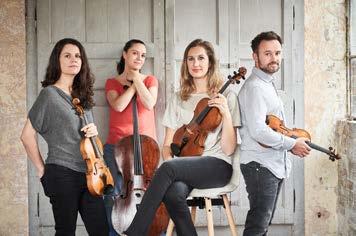
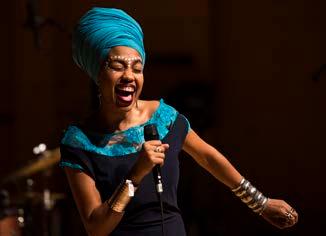
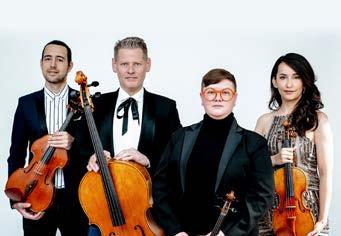



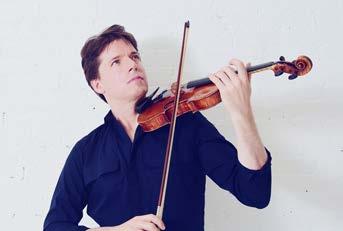
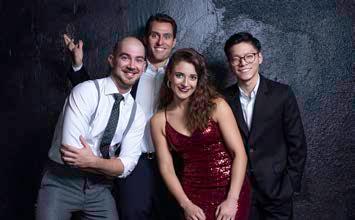
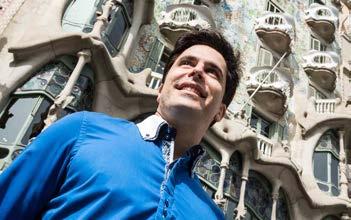








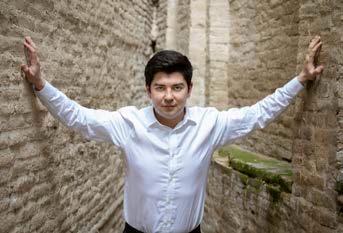
SEASON 32 ON SALE NOW! SPIVEYHALL.org Student and Educator Discounts Available JOSHUA BELL LUCILLE CHUNG LEIF OVE ANDSNES CATALYST QUARTET SONS OF SERENDIP WYCLIFFE GORDON & THE INTERNATIONAL ALL STARS CURTIS ON TOUR DOVER QUARTET JAZZMEIA HORN & HER NOBLE FORCE FLEUR BARRON BEN BLISS STEPHEN HOUGH BEHZOD ABDURAIMOV BORIS GILTBURG MERZ TRIO ...and many more! Order tickets and subscriptions online at SPIVEYHALL.org or call us at (678) 466-4200 MATTHEW WHITAKER QUINTET ELIAS STRING QUARTET EUROPA GALANTE & FABIO BIONDI, VIOLIN RAÚL PRIETO RAMÍREZ
DOSE
MY CONTROVERSIAL FEELINGS ABOUT PRIDE
Jake Jonez, Co-host of The Gayly Dose
As a tiny new gay coming into the city at 18, I really thought Pride was gonna be my girl.
The excitement of knowing I was going to be surrounded by like-minded people made me so hyped and so much more gay. I was always a social guy, so it came as a surprise to me how segmented the entire enterprise felt. From demographics, even down to the socioeconomic signifiers, Pride at my age in the 2010s felt like a status march.
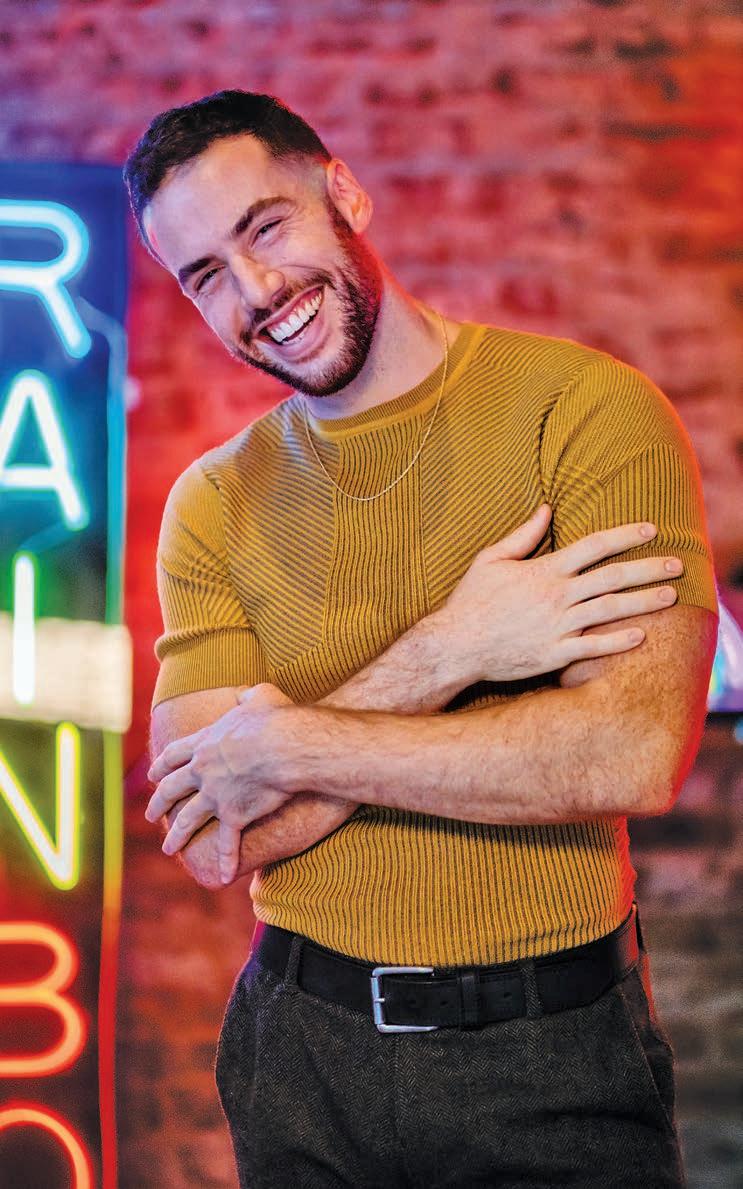
My first Pride was my first year of college. I played it chill and just explored the land, especially the bright side of being in the park where all groups in the community came together. But by the time the night fell, it seemed like that was when everything became segregated. In many ways that makes sense; there is the draw of sexual attraction when the night falls, so why not be with the ones you want to fuck? The insane concentration of the community getting together in such a sexualized way made me, in many ways, feel as if I wasn’t as far along or up to date in my gay experience.
Pride became an anxious weekend for me, and there was little for me to be hyped about. I don’t drink, I don’t take drugs, and anonymous sex is very rarely my forte. I want to fully acknowledge that there is a world of Pride far outside those three things, but they seem to get much of the spotlight over the weekend.
It became evident that there is an essence of exclusivity about Pride that is unfortunate. If you are any of the muscle gays who flood the city, you know exactly what parties to hit and who to talk to. If you are anything else, you are left to find parties that are still there but not nearly as supported by big budgets
“Pride became an anxious weekend for me, and there was little for me to be hyped about. I don’t drink, I don’t take drugs, and anonymous sex is very rarely my forte. I want to fully acknowledge that there is a world of Pride far outside those three things, but they seem to get much of the spotlight over the weekend.”
or marketing dollars. The concentration on white gays being a lucrative class to target made the party promotion scenes around the weekend focus highly on them as an audience.
Many of my friends who are not white gay males have for years not even known they were included in many of the festivities that Pride entails.
Here are some quotes from my closest queer friends when asked, “What are your feelings on pride?”
“It’s the Labor Day of queer holidays: the sentiment is valuable, but the execution isn’t up to par with the needs of the community.”
—Skylar
“For me, Pride isn’t actually about keeping the movement alive, it is a fun social situation! It was important and great when I was younger. I think it’s more useful for people in more rural areas.”
“For me at this point, it’s just a paycheck. For
the gays with money, it’s a great time. There is no sense of radical nature in Pride anymore; we are following the rules now, and it loses the qualities of Pride that were so important once before.”
—Kenneth
“There is a divide in Pride, between the organizations that continue to fight for the movement itself, [and] then corporate pride; [it’s] a social grab for cash from a very wealthy demographic.”
—Zachary
While I sit and feel very nonchalant about the experience of Pride (as someone who feels like they give a lot to many different aspects of the gay community publicly), I still hope the pillars of Pride are respected in the highest regard. While right now it can feel like a breeding ground for partying and anonymous sex, I hope the reminder of our history is apparent. We have every right to celebrate where we are: our freedoms, our sex, our identity. Hopefully in that sentiment, we remember the ones who fought through hell for us to be face down, ass up — whenever we want to be.
PHOTO COURTESY OF THE GAYLY DOSE
JAKE JONEZ THE GAYLY
68 COLUMNIST OCTOBER 7, 2022 THEGEORGIAVOICE.COM

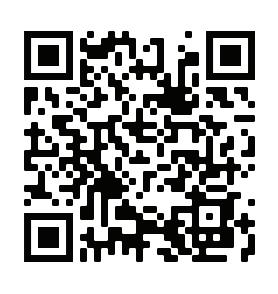


THEGEORGIAVOICE.COM OCTOBER 7, 2022 ADS 69 GEORGIA’S Southern Manhattan • 1 oz. Rivulet Artisan Pecan Liqueur • 2 oz. Kentucky Straight Bourbon Whiskey • 3 dashes Orange Bitters • Combine ingredients over ice and stir • Serve straight up or on the rocks • Garnish with orange peel and cherry Watch our Video

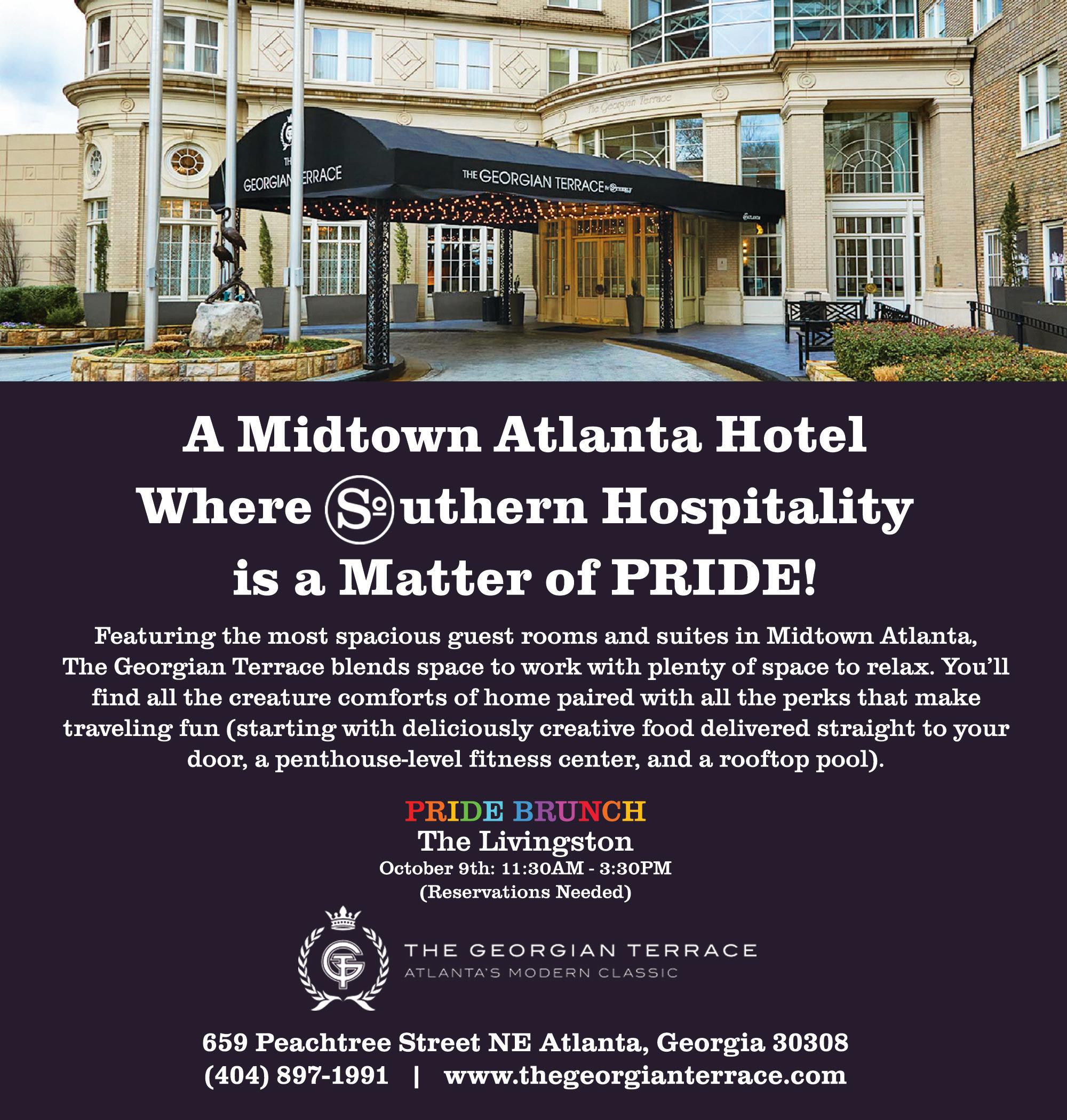
THE BARON WHO WAS MARS PERSONIFIED
María Helena Dolan

If grammar school coverage of the Revolutionary War was dull to you, clearly no one mentioned Baron Friedrich Wilhelm August Heinrich Ferdinand von Steuben, the dashing and openly gay Prussian general who whipped a ragged gaggle of disheartened and defeated colonial men into soldiers with the cohesion and discipline needed to win.
Born in Magdeburg, Prussia, Holy Roman Empire on September 17, 1730, von Steuben attended military schools and then saw military action, as this was a period when Europeans were killing each other. This included the Seven Years War (1756–63), where Steuben was wounded and taken prisoner by the Russians.
Returning to Prussia in 1762, he became an aide-de-camp to the heroic and openly gay Frederick the Great. He was then admitted to the King’s personal class on warfare, the world’s most elite institution for learning methods of war and the complicated art of leadership.
But an unknown rival poisoned the waters, charging he had “taken familiarities” with young boys. While untrue, Steuben was released from the army. And with Europe now officially at peace, he was unable to secure employment for his exceptional skill set.
On September 26, 1777, the Baron, his large and well-loved Italian greyhound Azor, his military secretary, and his aide-decamp boarded a ship to America to serve in the Revolution.
Ambassador Benjamin Franklin had met with Steuben in Paris and written a lustrous letter of introduction, which the Prussian presented to the Continental Congress.
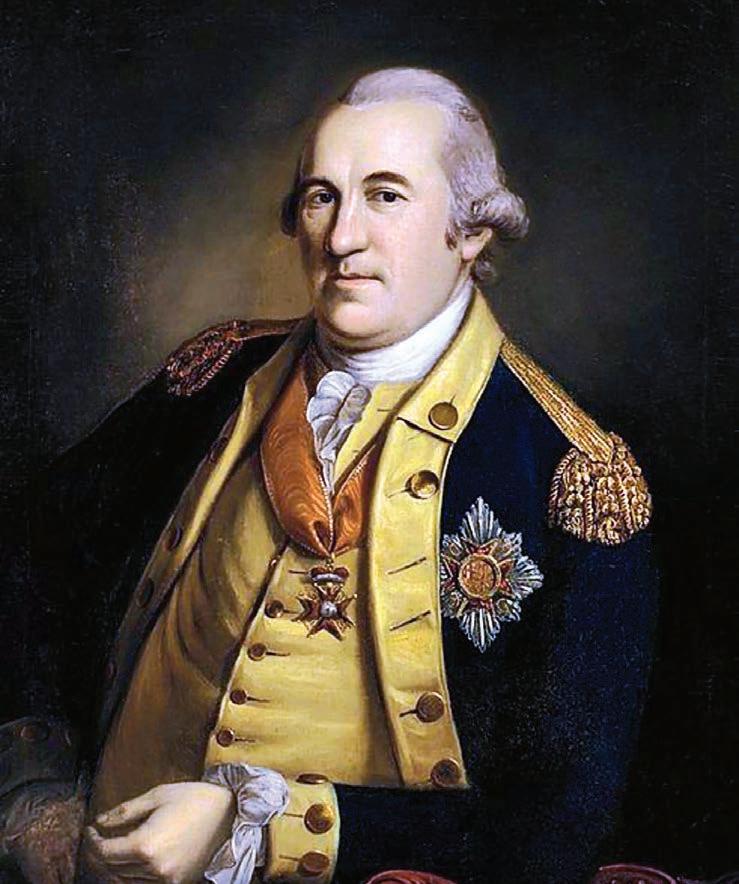
Congress had wearied of the stream of Europeans who’d presented themselves with demands for ranks and monies well beyond those accorded homegrown officers, so Steuben volunteered to work for free until the war was successfully prosecuted.
A soldier famously wrote that Steuben’s arrival was like witnessing “the ancient fabled God of War … [this] perfect personification of Mars [with] the trappings of his horse, the enormous holsters of his pistols, his large size, and his strikingly martial aspect.”
At Valley Forge, Washington appointed Steuben temporary Inspector General. The Baron was horrified by everything he saw. The men didn’t even know how to use their bayonets, and they were so illprovisioned that graft, war profiteering and incompetence were obvious. Steuben changed all that.
There would be no unit cohesion without proper drills, so Steuben wrote in French, and his secretary translated into English, with help from Alexander Hamilton. Captain Pierre Charles L’Enfant illustrated.
The text became the Blue Book, the Army’s training manual for many years. Some portions remain in place even today.
Steuben was a strict drillmaster who raged and cursed in three languages, but he advocated for the men and also socialized with them. (He famously hosted a “no
breeches’ dinner party.)
While all seemed acceptable for the dashing Steuben, a charge of sodomy was laid against Lt. Frederick Gotthold Enslin with his commanding officer Lt. Col. Aaron Burr. Enslin was dismissed and drummed out of the camp.
“Drumming a soldier out of the Army was a dramatic event,” Randy Shilts writes in “Conduct Unbecoming: Gays and Lesbians in the U.S. Military.”
“According to custom, an officer’s sword was broken in half over his head, while drummers played a very slow tattoo. So did Lt. Enslin leave the Continental Army on that cold morning in March ... not far from where Major General von Steuben was shouting orders in broken English.”
Upon the peace, Steuben was granted land by the states of New York, Pennsylvania, and Virginia, and became an American citizen.
With aides William North and Benjamin Walker, he moved to New York.
According to History.com, von Steuben legally adopted North and Walker, “a common practice among gay men in an age before same-sex marriage.” They lived together, and the two managed his finances and inherited his estate when he died in 1794. John Mulligan, von Steuben’s secretary, also inherited the baron’s library and some money. Mulligan was also gay, and the two were thought to have a relationship.
In his will, von Steuben also stipulated that “If the Negro Man Nathan is living with me at the time of my Decease, he shall be then be set at Liberty” and “my Dog called Azore I desire may be delivered to Mrs. Washington.”
Many have erected statues to von Steuben as well as named things for him, including ships, cadet barracks, counties, and even the city of Steubenville, Ohio.
Baron Friedrich Wilhelm August Heinrich Ferdinand von Steuben IMAGE VIA WIKICOMMONS
REELING IN THE YEARS MARÍA HELENA DOLAN 72 COLUMNIST OCTOBER 7, 2022 THEGEORGIAVOICE.COM



THEGEORGIAVOICE.COM OCTOBER 7, 2022 ADS 73



 By CHARLES DICKENS
By CHARLES DICKENS
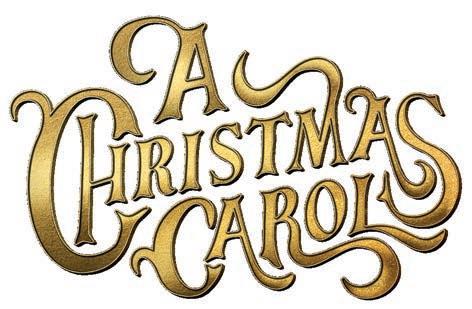
 by DAVID H. BELL
LEORA MORRIS
By BRANDEN JACOBS-JENKINS
by DAVID H. BELL
LEORA MORRIS
By BRANDEN JACOBS-JENKINS







 by SUSAN V. BOOTH & TINASHE KAJESE-BOLDEN
by SUSAN V. BOOTH & TINASHE KAJESE-BOLDEN

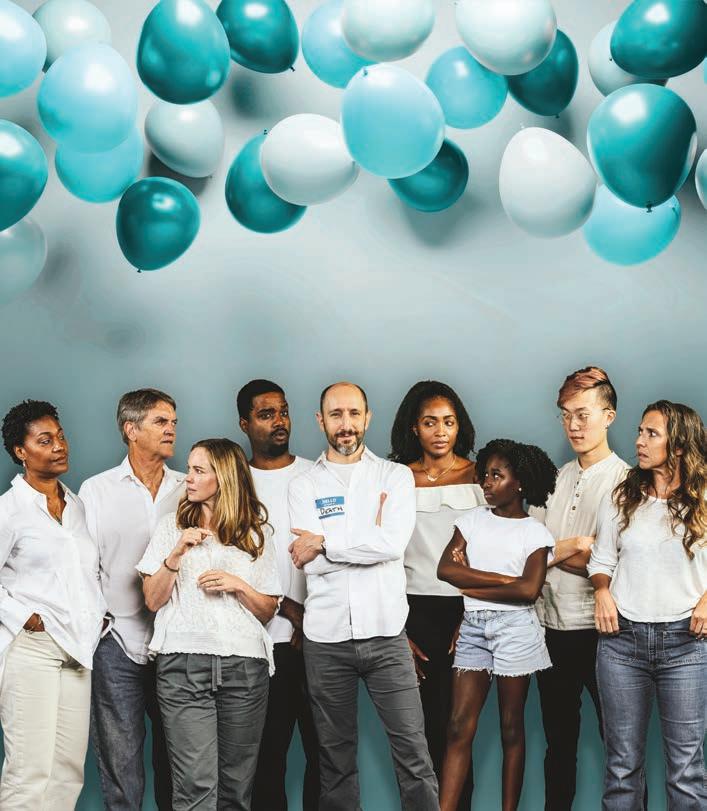
From the award-winning playwright of An Octoroon comes an irreverent new play that has captivated audiences with its wit, hardhitting questions, and unique storytelling.
Co-Directed
NOW–OCT 2 GET YOUR TICKETS NOW for Alliance Theatre’s 2022/23 SEASON One of Atlanta’s most treasured holiday traditions.
Adapted
Directed by
PRESENTED BY NOV 12–DEC 24 1280 PEACHTREE ST NE // ATLANTA, GA 30309 Tickets and memberships available at alliancetheatre.org Winner of the 2021 Pulitzer Prize for Drama From the creator of P-Valley comes a fierce new comedy about the risks and rewards of celebrating who you are. Written & Directed by KATORI HALL FEB 10–MAR 5 2023 Pulitzer Prize finalist
TAKING STOCK OF YOUR PRIDE
Buck Jones
Of course, there is an element of empowerment, or rather a positive assertion that “I exist,” with our annual Gay Pride commemoration. Celebrating our collective LGBTQ history with a weekend of partying and marching is all well and good, but I’m reminded of an observation made recently during an online chat. “Someone” (ahem) commented that they must be proud of the size of their … um … “eggplant,” to which “someone” responded that they have their parents to thank for that. The implication being that they were just born this way, blessed with good genetics, and that it was not necessarily anything to be proud of since they had no hand in making it (okay, maybe in fact there was a hand involved, but I digress).
The larger point is that pride (and Pride) should be assigned when one has created something. It isn’t enough to just glide through one’s existence and be proud of a life of mediocrity with no purpose or direction. Nobody likes a scold, and I’m not going to go down that route because #glasshouses and all. However, let’s take a moment and reflect on things to take pride in.
Bettering yourself, whether by becoming sober or seeing a therapist to figure things out, is something to be proud of. The adage that happiness comes from within also implies that pride should emanate from our own self-worth.
Taking time to develop personally is
important. Too often our lives consist of a rush to and from work, long days working for someone else (i.e. our corporate overlords), and what little time we have left after paying the bills, grabbing something to eat, and collapsing in front of our favorite series on Netflix (have you seen “Dahmer” yet, by the way?) is quickly dissipated in the effervescence of the immediate. I’m guilty of this, too. But I’m getting better at carving out a half hour each morning to jot down some personal goals I want to accomplish today and this week, and then rewarding myself with a “treat” once I accomplish them. Celebrate, and yes, take pride in doing something, in crossing things off your list.
Here are some ideas: doing yoga (or Pilates or going to the gym) today (or this week); buying the ingredients for a healthy, homemade meal and making it to share with a friend;
reading a book either from the public library or bought at a local independent bookstore; going a day (or longer) without engaging in any social media and using that time to do something in real life.
During Pride, perhaps nothing is more important than making sure that you are not only registered to vote (no small feat in Georgia) but actually figuring out when you are going to vote.
Billy Eichner recently said that going to see his new movie “Bros” is a political act. That is setting the bar awfully low, but I get his point. Going out and supporting LGBTQ culture, spending your money within the community, is wonderful. Given that the money reaped from viewers of his film is going to a Hollywood studio, I’m not sure it is really trickling down to fund other gay projects, but by showing that an overtly
gay film can do well in the box office is progress, of sorts. It qualifies as one step above mashing “like” or “heart” on a post.
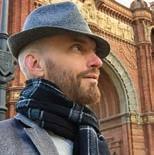
There is still plenty of activism needed to push equality and freedom further in both Georgia and the United States. Trans rights and dignity are a daily struggle, abortion rights are under siege, and neighboring Florida is trying to push us all back into the closet with its “Don’t Say Gay” agenda.
Maybe going to see “Bros” or having a raucous weekend with friends in Piedmont Park during Pride can be counted as political, but the world needs more from us. I’m skeptical that we’re going to be pushing the needle toward a brighter future by only thinking small and focusing on one weekend a year. Self-pride and community Pride should be a verb, not a noun, requiring action on a constant basis.
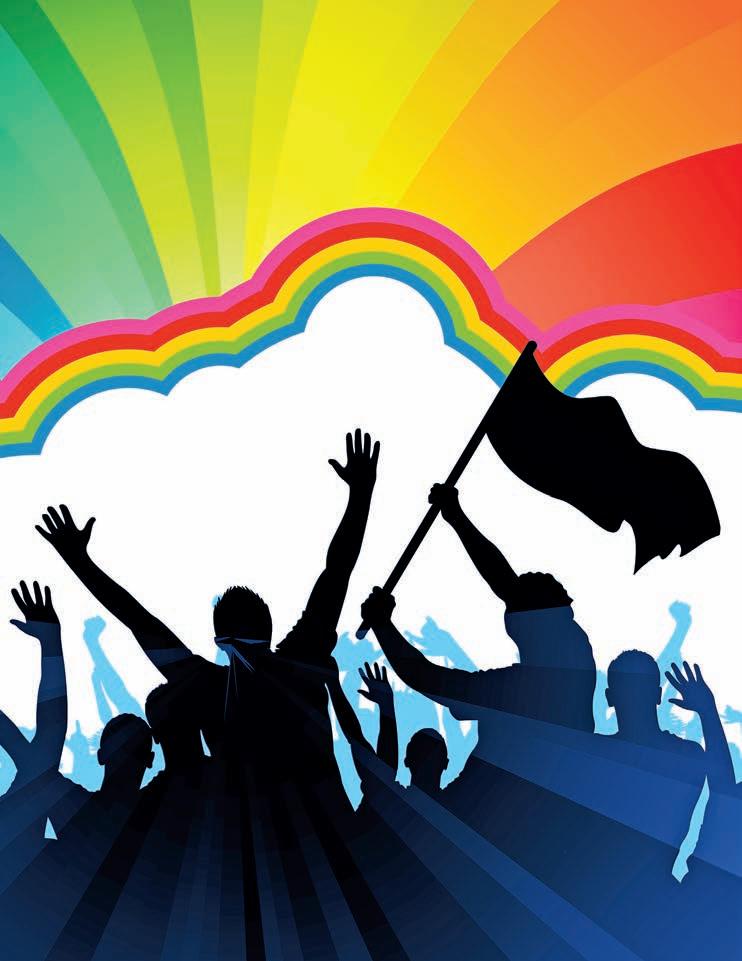 PHOTO BY ISTOCK.COM
PHOTO BY ISTOCK.COM
THE FRENCH CONNECTION BUCK JONES
76 COLUMNIST OCTOBER 7, 2022 THEGEORGIAVOICE.COM
“Bettering yourself, whether by becoming sober or seeing a therapist to figure things out, is something to be proud of. The adage that happiness comes from within also implies that pride should emanate from our own self-worth.”


THEGEORGIAVOICE.COM OCTOBER 7, 2022 ADS 77
‘SISSY’ IS A SLY HORROR FILM LOOKING AT BULLYING AND SOCIAL MEDIA
Jim Farmer
A favorite at film festivals this summer and fall, the new horror movie, “Sissy,” is now playing on Shudder. Directed and written by Hannah Barlow and Kane Senes, it’s one of the most original motion pictures you’ll see this year.
A character-driven project, its lead character is Cecilia (Aisha Dee), a successful media influencer with more than 200,000 followers. She and Emma (Barlow) were tween-age BFFs who made wishes that they are going to grow old together and never let anyone or anything interrupt their friendship. That changes, though, when Alex (Emily De Margheriti) enters the picture and an incident occurs.

Twelve years after their childhood years, Cecilia runs into Emma, who invites Cecilia to her bachelorette weekend before she marries her girlfriend. Said weekend is in a cabin in the mountains, where the weekend does not go as planned. What neither Alex nor Cecilia realizes is that the other will be there. Another of the weekend guests is a disabled gay man played by Daniel Monks.
“Sissy” may not have the hype of the recent queer thriller, “Bodies Bodies Bodies,” but it’s every bit as good. It’s also blessed with a wicked sense of humor.
The idea arrived at the director-writers in many ways.
“On a personal level, [I’m] still dealing with the mental health effects of being bullied as a child and also looking at how children are being bullied online today and the mental health associated with living online and how that is
affecting our dopamine receptors and changing the way our brains work and being fascinated by all that,” Barlow told Georgia Voice
The obsession with social media is one of the film’s themes.
“Living behind a façade on social media is like a Band-Aid,” Senes said. “It stops you from having to go back and fix or address those traumas, because you are able to project this perfect vision of yourself for the world to see. It’s a clashing of issues we thought.”
The film came together as Senes and Barlow were living in Los Angeles in 2018 and Trump had been inaugurated.
“There was a feeling in the air that you can get away with anything you want these days as long as you paint the right picture of yourself online,” Senes said. “We were having a lot of discussions about the concept of selfaccountability and being able to recognize what you’ve done to others and where you’ve gone wrong in your life instead of blaming everyone else.”
A social media influencer in Australia somewhat inspired the project.
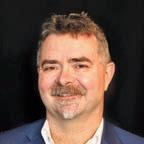
“Belle Gibson wrote a book called ‘The Whole Pantry’ and she took advantage of the cancer community in Australia by faking cancer, and she eventually got called out,” Barlow said. “She made a lot of money doing that, and we based Cecilia on her and tried to get in her shoes as we were writing.” De Margheriti was eager to join the project after reading the script.
“I thought it captures the era we live in with social media and the whole dopamine hit we get when we are on, specifically Instagram,” she said. “I thought it was a lot of fun, which is kind of messed up of me to say, and it was very nostalgic in a way, especially with all the elements of the best friend necklaces. It took me back to when I was a teenager.”
When Alex realizes that Cecilia has joined the weekend, she has to make a tough decision.
“I think my love for Emma and my loyalty is so big I enable Cecilia to be there,” De Margheriti
said. “My friends and loyalty to them and my quest for popularity in that moment is more important than sending her away.”
Barlow strongly identified with the character of Emma.
“I think a lot of women do, with the peoplepleasing aspect of our personalities,” she said. “We are demanded by society to be people pleasers and that can permeate in toxic ways, especially in relationships with other women. We are taught to lie from a very young age. She presents as a good listener and friend and mediator, but if she was actually honest with herself and Cecilia it would be a different film.”
Senes said that the filmmaking pair set out to take many of the films they loved growing up, like “Mean Girls” and “Bridesmaids” and infused that with horror films such as “Carrie” and “Halloween.” He likes movies that are technically horror, but are fun, where the audience might be rooting for the character they shouldn’t be.
“Sissy” is now streaming on Shudder.
JIM FARMERACTING OUT
“Sissy” PUBLICITY PHOTO
78 COLUMNIST OCTOBER 7, 2022 THEGEORGIAVOICE.COM

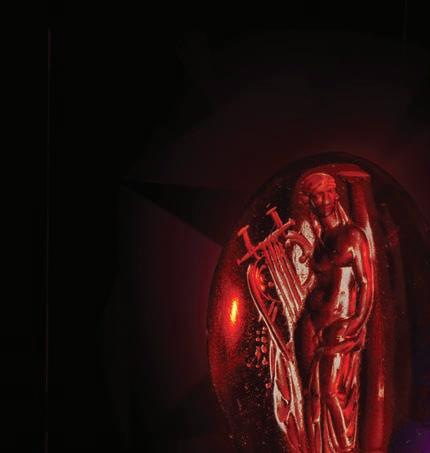
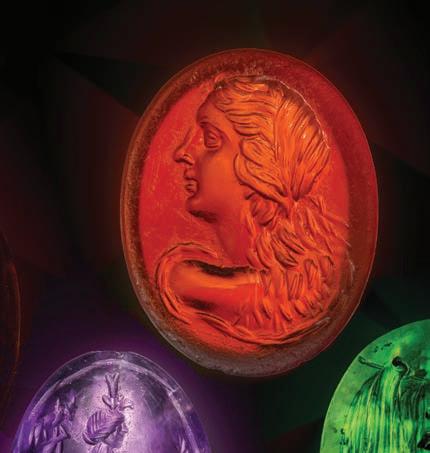


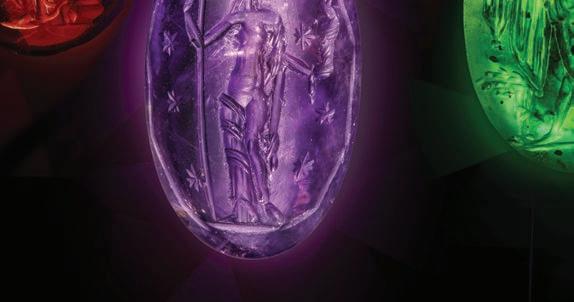
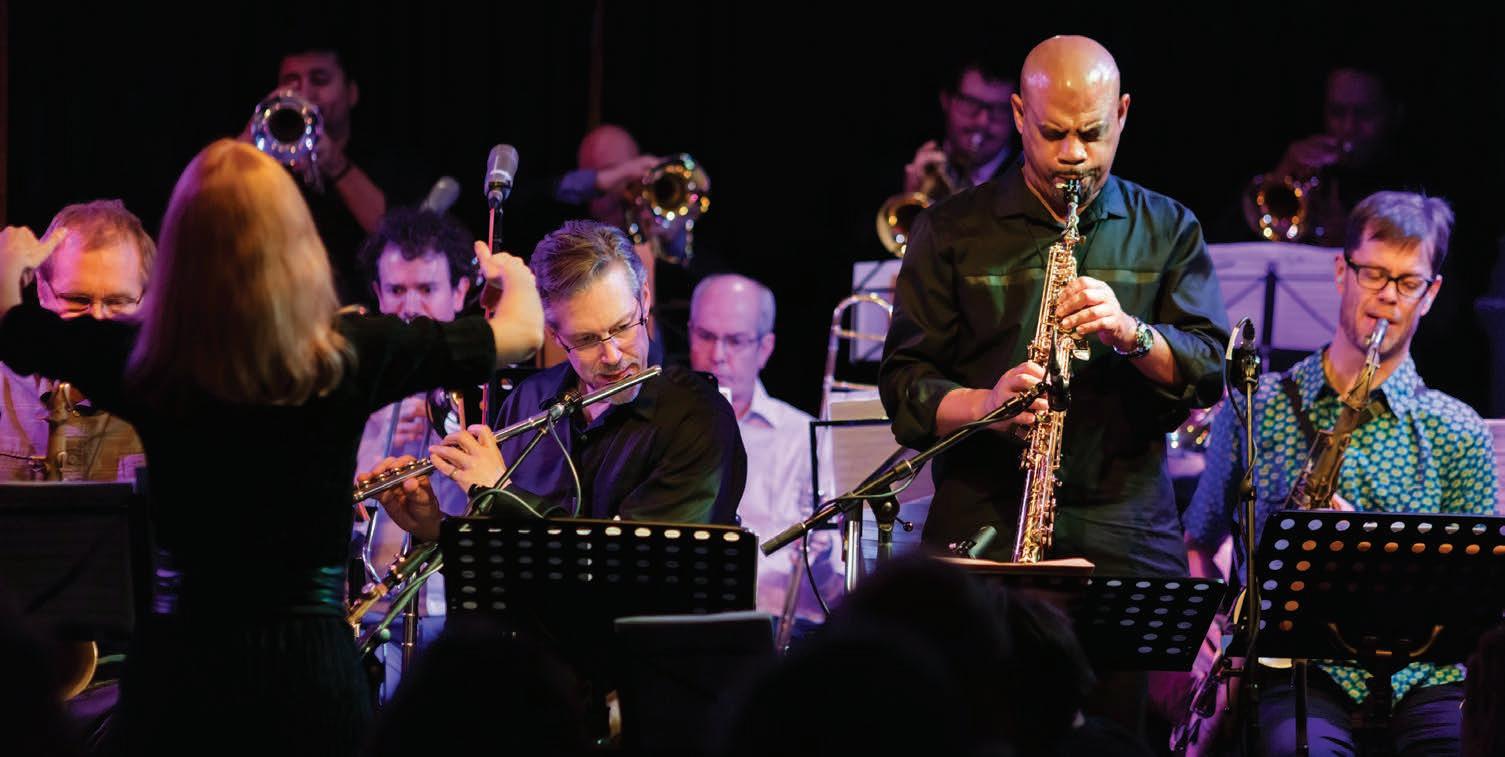


THE MICHAEL C. CARLOS MUSEUM PRESENTS CARLOS.EMORY.EDU NOW ON VIEW The Art and Craft of Ancient Engraved Gemstones THEGEORGIAVOICE.COM OCTOBER 7, 2022 ADS 79 Maria Schneider Orchestra © Gustav Eckart UPCOMING CONCERTS HÉLÈNE GRIMAUD, piano Thursday, October 27 | 8 pm MARIA SCHNEIDER ORCHESTRA featuring a World Premiere Big Band Commission Thursday, November 17 | 8 pm SpECIAL CANDLER DANCE EVENT URBAN BUSH WOMEN Legacy + Lineage + Liberation October 20–23 | 7:30 pm TICKETS ON SALE NOW schwartz.emory.edu/voice 404.727.5050

 Farmer
Farmer
FRIDAY, OCTOBER 7
When Black Liberation activist Kenyatta Shakur comes back to the world after prison, he finds himself widowed and alone. His fraught reunion with his daughter Nina only intensifies when she refuses to release to him letters from his late wife that are both personally and historically significant. In the familial tug-of-war that ensues, Kenyatta and Nina must find a way to confront their shared history. “Sunset Baby” is a crackling play from MacArthur Genius Grant recipient Dominique Morisseau, one of the most acclaimed playwrights in America. Today, 8pm through October 16, Actor’s Express
SATURDAY, OCTOBER 8
“KURIOS™ – Cabinet of Curiosities” is Cirque du Soleil’s 35th production since 1984. Cabinets of curiosities are the ancestors of museums, also known as cabinet of wonder in the Renaissance Europe. Aristocrats, members of the merchant class and early practitioners of science formed collections of historical relics, works of art or mysterious travel souvenirs or artefacts. “KURIOS™ –Cabinet of Curiosities” has a cast of 46 artists from 16 different countries. Running through December 24 under the iconic Big Top at Atlantic Station, with 4:30 and 8:30pm performances today.
Today is the last day to catch streaming films online as part of this year’s Out On Film
SUNDAY, OCTOBER 9
“Misery” follows successful romance novelist Paul Sheldon, who is rescued from a car crash by his “number one fan,” Annie Wilkes, and wakes up captive in her secluded home. While Paul is convalescing, Annie reads his latest book and becomes enraged when she discovers the author has killed off her favorite character, Misery Chastain. Annie forces Paul to write a new Misery novel, and he quickly realizes Annie has no intention of letting him go anywhere. 3pm, running through October 23, Onstage Atlanta
EVENT SPOTLIGHT
FRIDAY, OCTOBER 14
TUESDAY, OCTOBER 11
PALS Atlanta hosts Drag Queen
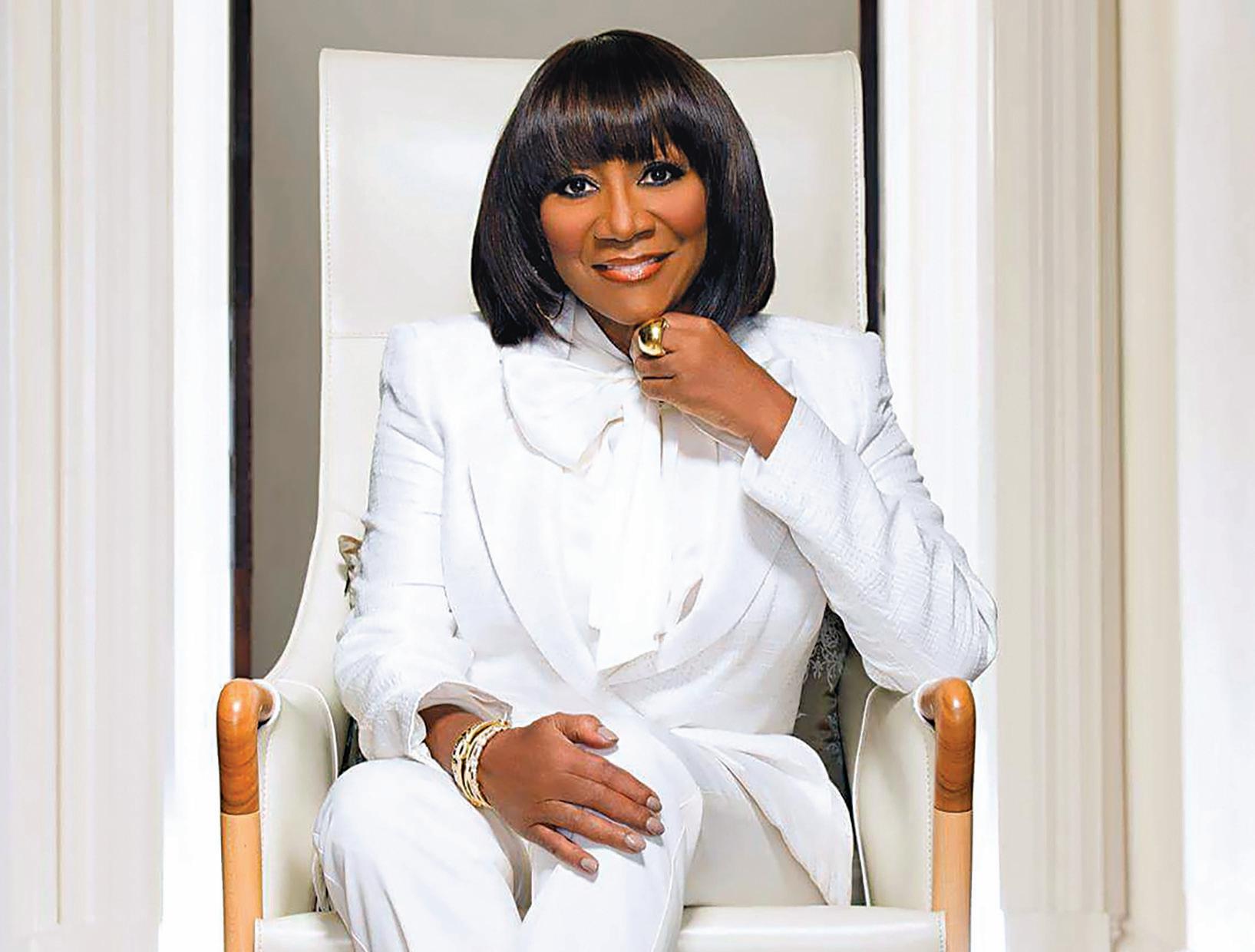
Bingo – Pride Night 7:30pm, Lips Atlanta
FRIDAY, OCTOBER 14
Come dressed up as your favorite
Superhero for the Heretic Harness Party: Heroes & Villains edition
Break out those harnesses to complete your look. 10pm, Heretic Atlanta
FRIDAY, OCTOBER 14
Fashionable and fierce, the ladies of the smash-hit comedy series “Designing Women” are now live onstage in this hilarious and timely new comedy set in Atlanta in fall 2020, “Designing Women – 2020: The Big Split.” Presidents and pandemics are the hot conversation points, and Julia and her partners at Sugarbaker’s interior design firm are now tackling 21st century challenges with wit, pluck, and style. The house of Sugarbaker may be divided this election season, but
these Southern, smart, and sassy designing women prove that nothing truly unites us like laughter. 8pm, with an open-ended run, Horizon Theatre
SATURDAY, OCTOBER 15
Southern Fried Queer Pride presents Cinequeer Film Night. The lineup of films will be posted soon. 8 – 10pm, eyedrum art & music gallery
Jim
BEST BETS THE BEST LGBTQ EVENTS HAPPENING IN OCTOBER
Actress and singer Patti LaBelle, the queen of rock and soul music, is coming to town tonight with a very special guest, Stephanie Mills. Don’t miss two amazing talents on one stage. 8pm, Fox Theatre (Photo via Facebook)
82 BEST BETS CALENDAR OCTOBER 7, 2022 THEGEORGIAVOICE.COM CONTINUES ON PAGE 84


THEGEORGIAVOICE.COM OCTOBER 7, 2022 ADS 83
LGBTQ EVENTS
IN OCTOBER
SUNDAY, OCTOBER 16
The PFLAG support group for parents and families of LGBTQ children meets in person today. 2:30 – 4pm, Spiritual Living Center
MONDAY, OCTOBER 17
Trans and Friends is a youth-focused group for trans people, people questioning their own gender, and aspiring allies, providing a facilitated space to discuss gender, relevant resources, and activism around social issues. 7 – 8pm for youth and 8 – 9pm for adults, Charis Books and More
TUESDAY, OCTOBER 18
Tonight is Latino Tuesday at Blake’s Atlanta.
THURSDAY, OCTOBER 20
Out Front Theatre Company presents the musical “Kinky Boots,” with music and lyrics by Cyndi Lauper and book by Harvey Fierstein. Charlie Price has reluctantly inherited his father’s shoe factory, which is on the verge of bankruptcy. Trying to live up to his father’s legacy and save his family business, Charlie finds inspiration in the form of Lola, a fabulous entertainer in need of some sturdy stilettos. As they work to turn the factory around, this unlikely pair find that they have more in common than they realized… and discover that when you change your mind, you can change your whole world. 8pm, through November 5, Out Front Theatre Company

Enjoy R&B Thursdays at My Sister’s Room

SATURDAY, OCTOBER 22
The LGBTQ+ Book Club is a group for LGBTQ+ folks and allies to read queer-themed books and books by queer authors. The goal is to have diverse thought-provoking discussions about queer identity, history, and topical issues. This month’s book
EVENT SPOTLIGHT
MONDAY, OCTOBER 24
Front Theatre Company and Out On Film present Stage to Screen – the 2005 movie
Boots.” 7pm, Out Front Theatre Company (Publicity photo)
Thirty Names of Night: A Novel by
Joukhada.” Register
THURSDAY, OCTOBER 27
WEDNESDAY OCTOBER 26
WUSSY is back with its annual spooky season screening of “Hocus Pocus” at the Plaza Atlanta theater tonight. Attendees are encouraged to dress up for the costume contest. Prizes will be awarded for the best Sanderson Sisters couture, corseted yabbos, & 1990’s Salem fashions. The event is hosted by Dotte Com, Hera Kane, & Molly Rimswell. Doors open at 6pm. Arrive early, grab a cocktail, grab a snack & take some photos before the look contest starts at 7pm.
The Black Feminist Book Club reads books by amazing Black women writers, centers the discussion from Black feminist perspectives, and celebrates classic and contemporary Black women authors across genres and styles, all in the comfort of an awesome gem of a feminist bookstore. Charis Circle board chair Susana Morris is the facilitator of this group. All community members are invited to participate with the acknowledgment that this is a space that centers Black women’s thoughts, creativity, and lived experiences. This month’s book is “Mama Day” by Gloria Naylor Register in advance for this meeting: https://us02web.zoom.us/ meeting/register/tZIkcOuhrj4rGNOVtI9THkFrYLOhME_IbdJ, 7 – 8pm
is “The
Zeyn
in advance for this meeting at https:// us02web.zoom.us/meeting/register/ tZEkcO2rpzojGdANXXiqdPgA0TsjdZcs_ rYe,10 – 11:30am
BEST BETS THE BEST
HAPPENING
CONTINUED FROM PAGE 82 84 BEST BETS CALENDAR OCTOBER 7, 2022 THEGEORGIAVOICE.COM
Out
“Kinky
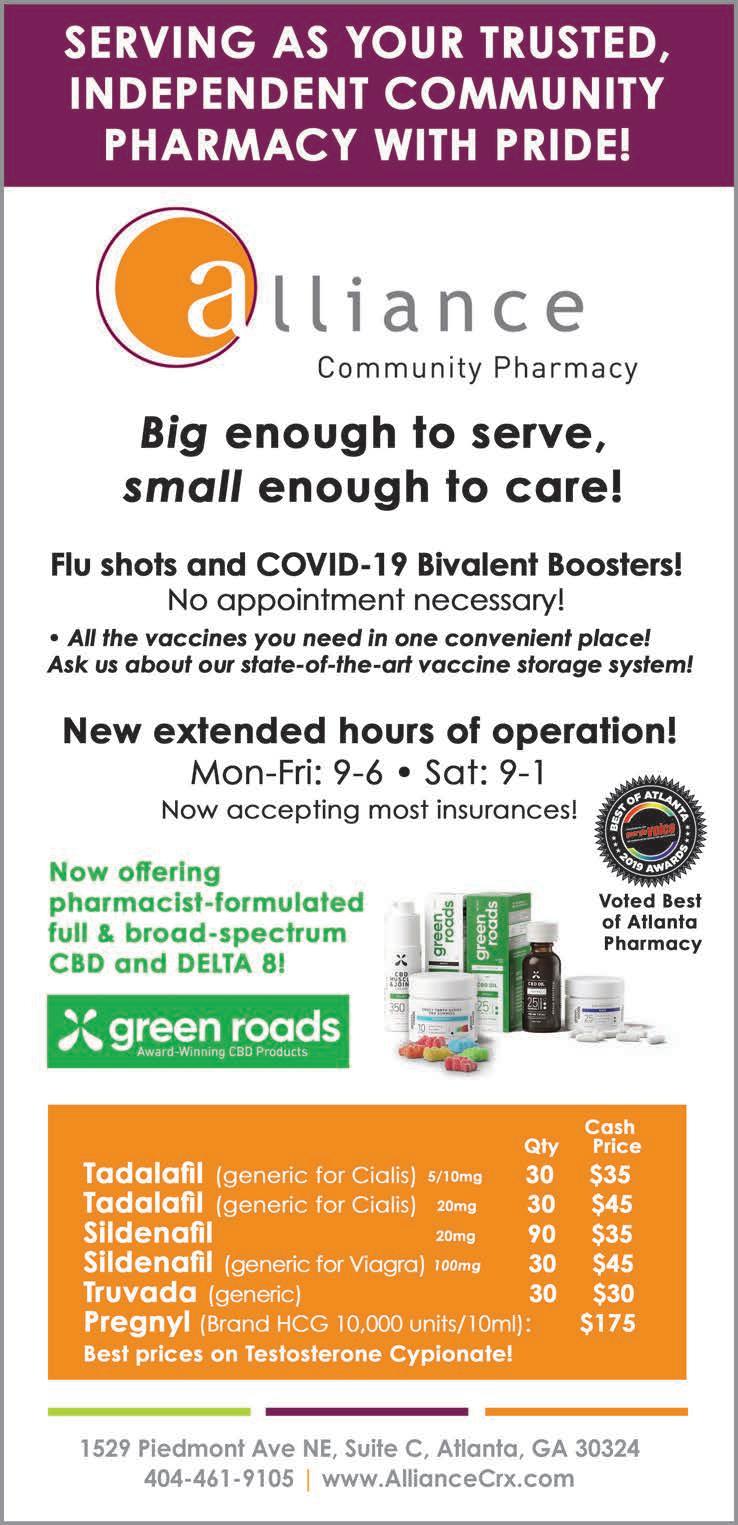
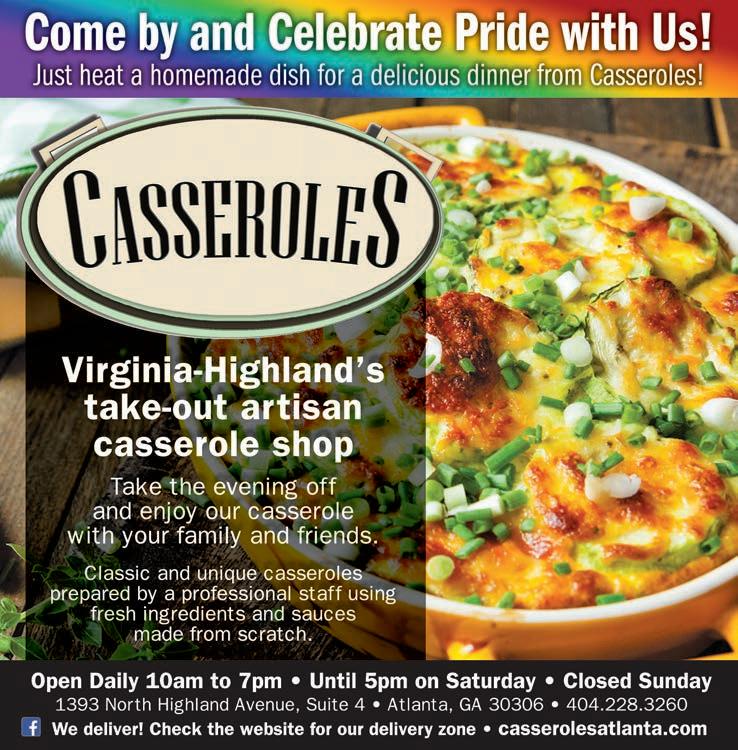

THEGEORGIAVOICE.COM OCTOBER 7, 2022 ADS 85

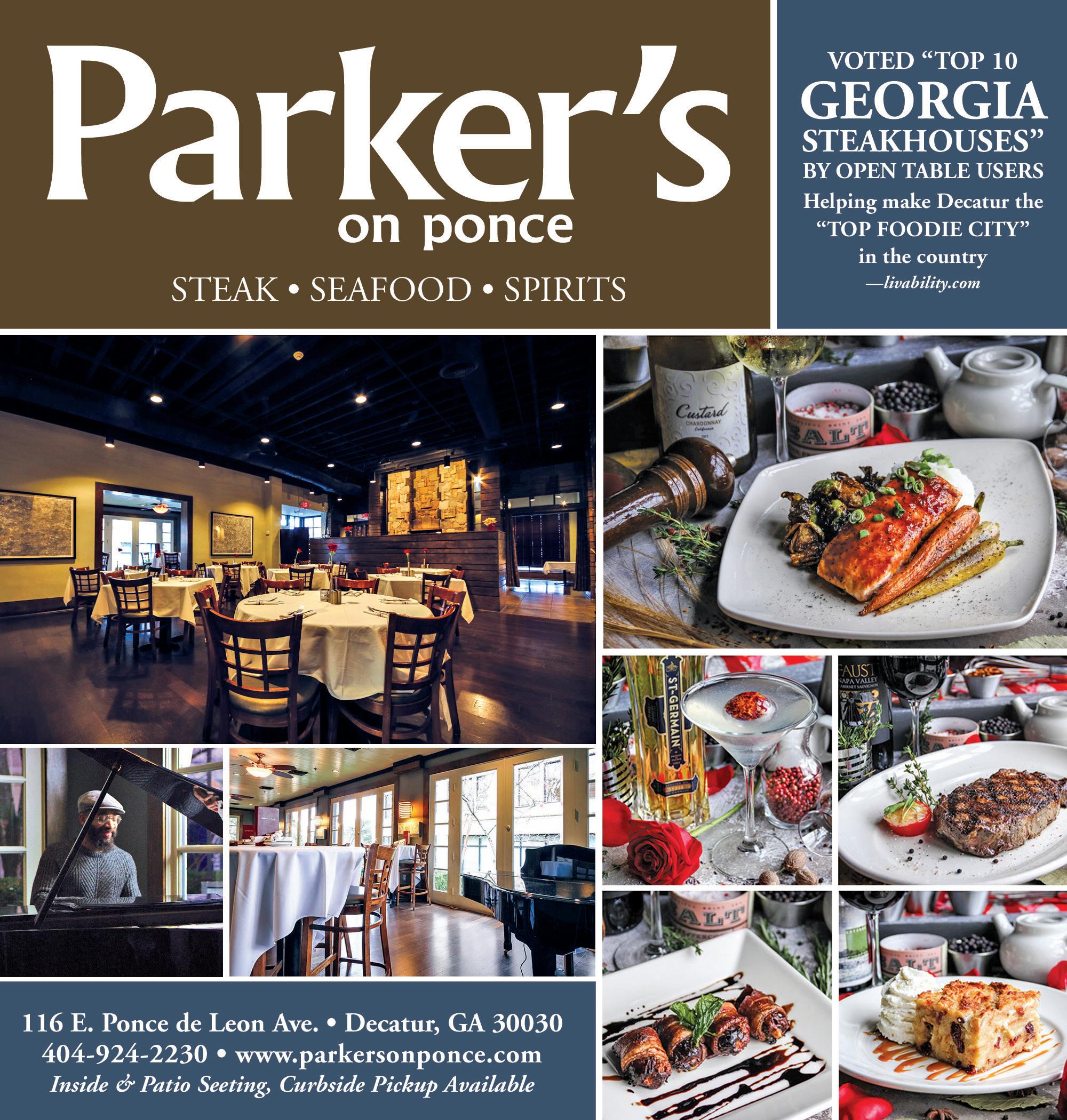
MY SON’S PRIDE
Melissa Carter

A staff member at my son’s school emailed me shortly after classes returned in August. She listened to me on the radio back in the day, and we’ve gotten to know each other in recent years, so the email was more personal than professional. “I thought you’d appreciate this,” she began.
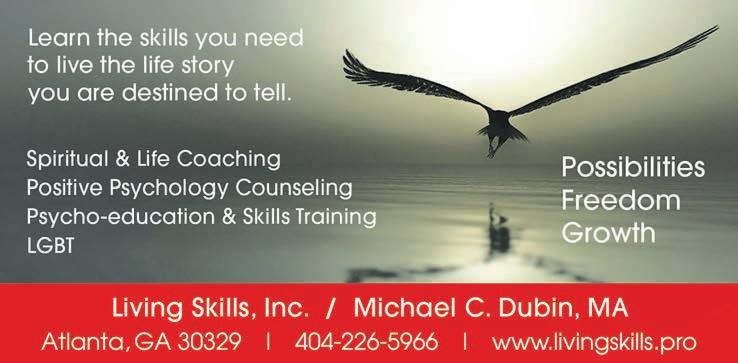
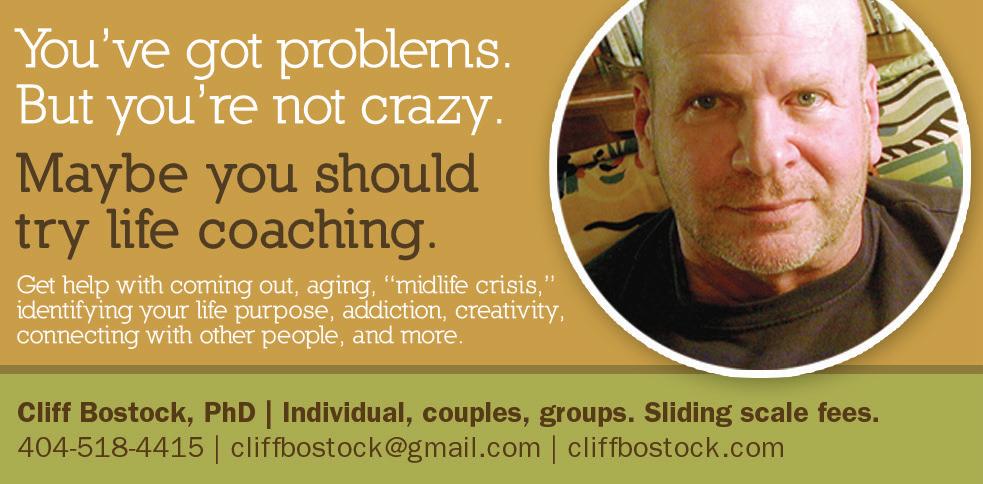
She was visiting Mr. Carter’s second grade classroom and didn’t want to interrupt the lesson, so she stood to the side until it was over. A few of the students were telling something about themselves to start the new year. When it was my son’s turn, he announced he had two moms.
“You’re so lucky,” said one of his classmates. “I know,” was his reply.
That staff member knew what it would mean to me when she described the scene in her message and relayed that she herself was touched by the experience. And she was right in her assumption; I cried. I cried not because it was the first time he
had said that in public, since he tends to let everyone know who his parents are. He tells everyone from the grocery store clerk to the hairstylist. I cried not because he hasn’t received a positive response to this declaration, since most I’ve witnessed also say he’s lucky to have that kind of family.
I cried because I don’t take those moments for granted. It is my belief that if you experience something harsh or offensive, you should recognize the good that eventually comes from it because it shows your inner wish has come true. The fact that a straight women was sharing how wonderful she thought the moment was also wasn’t lost on me.
If you had told the 22-year-old Melissa who had just moved to Atlanta this story in 1992, she wouldn’t have believed you. She was too busy wrapping her mind around the mass of people gathered at her first Atlanta Pride. I can still remember my reaction to the vast number of friendly faces, all adorned in rainbow colors and cheering the supportive businesses and politicians that passed by on the street. That Melissa would often reflect on the times in high school when she thought she was the only lesbian in the world. And when the crowds followed the end of the parade back to Piedmont Park,
young Melissa was right there with them. A baptism of sorts, it was the first time I felt a part of a larger LGBTQ group and knew a new chapter in my life started that very day.
As we return to a more normal way of life and gather again for Pride, let’s not forget the importance of the occasion. Without Pride,
so many of us would never have had the confidence to come out. Without Pride, many straight allies would never have understood the need for their support. And without Pride, we wouldn’t be in a place where a seven-yearold boy would have the confidence to stand tall in his claim of who his parents are and be envied by other children.
 PHOTO BY ISTOCK.COM / NEW AFRICA
PHOTO BY ISTOCK.COM / NEW AFRICA
THAT’S WHAT SHE SAID MELISSA CARTER 88 COLUMNIST OCTOBER 7, 2022 THEGEORGIAVOICE.COM


THEGEORGIAVOICE.COM OCTOBER 7, 2022 ADS 89

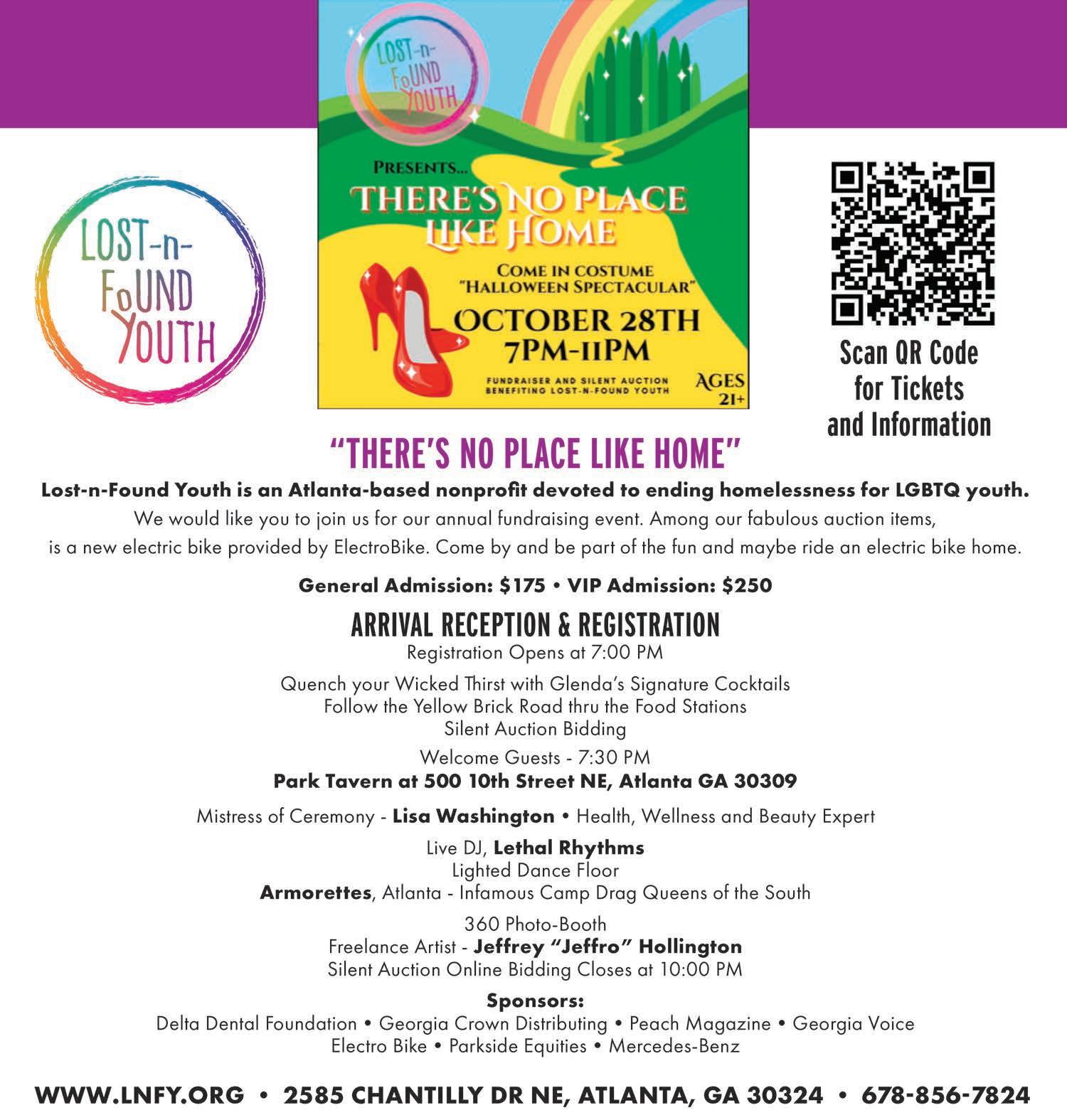
Atlanta Pride Entertainment Edition
Atlanta Pride makes its return, which means entertainers will once again take the stage. Check out what some of this year’s featured musicians have to say about LGBTQ identity and Pride!


“With my homies in New Orleans who I kick it with, who I grew up with, the hood boys, I’m they bro. To my girls, I’m they sista. To my kids, straight and gay, I’m they mom. My sista — my blood sista — I’m her brother. When she wants to call me her sista, I’m her sista. It really doesn’t matter to me, because I know who I am.” —Big Freedia on pronouns and gender fluidity (College Hill: Celebrity Edition)

“I want to be on stage and be proud of who I am and show [that to] other young women – I think young queer people [are] really the people I want to speak to, but also especially young women.”
“[J]ust anything Pride related, I always want to be part of it… Just an opportunity to be representing the LGBTQ community in Nashville and abroad, it was just so cool.” — Brooke Eden on her participation in the first LGBTQ songwriters round at the Island Hopper Songwriter Fest (CMT)
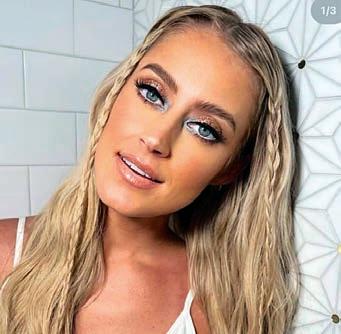
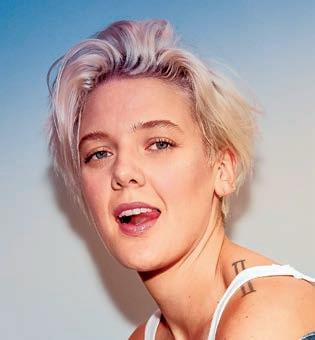
“Humble reminder — [though] our callings and gifts are unique, that doesn’t mean they’re better, it simply means they’re different. That’s what makes everyone so beautiful… being different, not better.”
—Nouri (Twitter)
“It’s so nice out today I need to kiss a girl and carve a pumpkin and kiss a girl and make banana bread and kiss a girl.”
— Chrissy Chlapecka (Twitter)
Big Freedia, Betty Who, and Nouri photos courtesy of Atlanta Pride; Brooke Eden and Chrissy Chlapecka photos via Instagram.
CELEBRITY BRIEFS
—Betty Who (Unfiltered: The JBL Podcast)
92 CELEBRITY BRIEFS OCTOBER 7, 2022 THEGEORGIAVOICE.COM


THEGEORGIAVOICE.COM OCTOBER 7, 2022 ADS 93


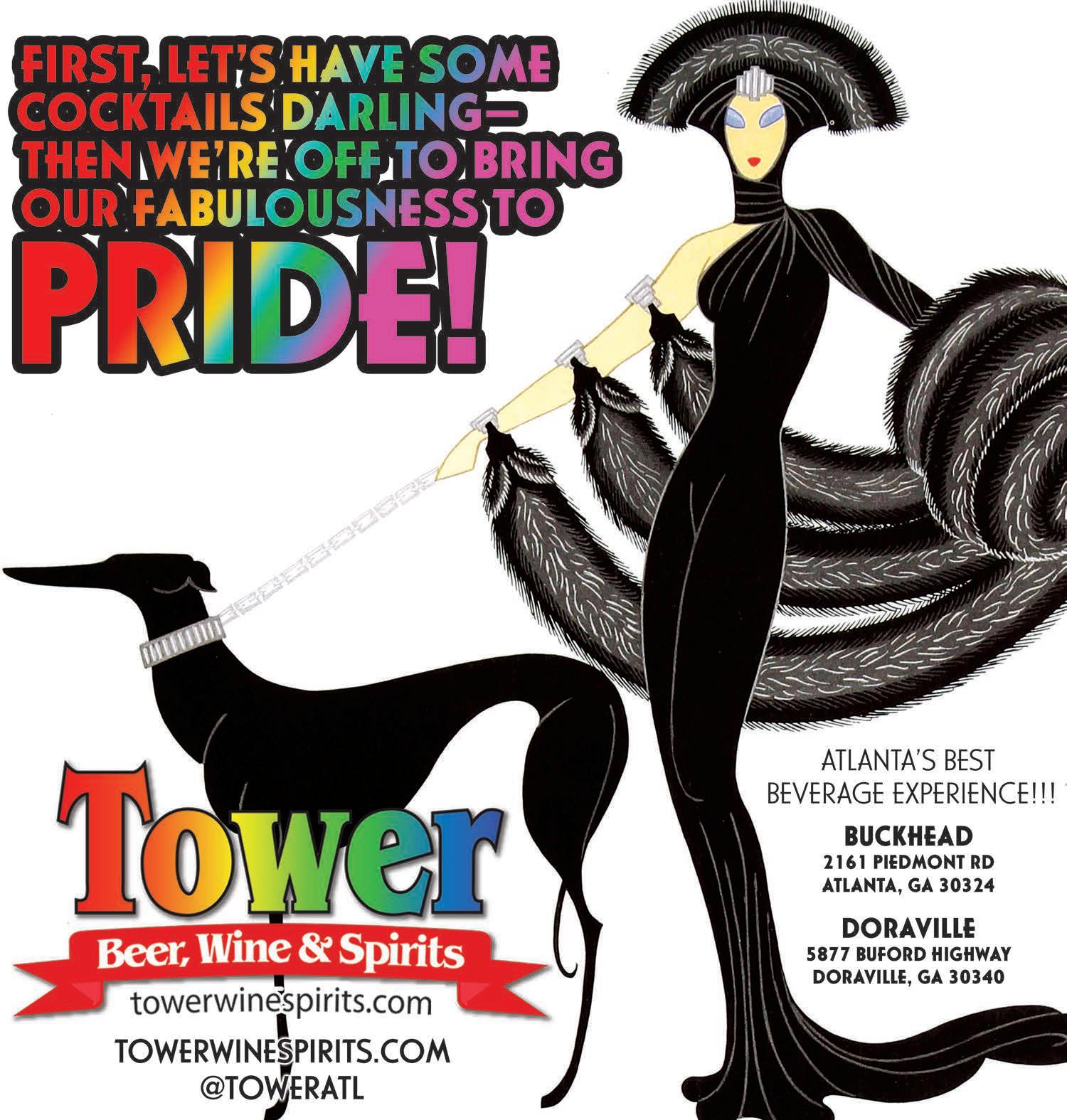

































































































































































 PHOTO BY SHUTTERSTOCK.COM
PHOTO BY SHUTTERSTOCK.COM







 John Peterson (right), and his domestic partner, Lupin Loughborough.
PHOTO COURTESY OF GREGORIO MILLETT, MPH
John Peterson (right), and his domestic partner, Lupin Loughborough.
PHOTO COURTESY OF GREGORIO MILLETT, MPH









































 By CHARLES DICKENS
By CHARLES DICKENS

 by DAVID H. BELL
LEORA MORRIS
By BRANDEN JACOBS-JENKINS
by DAVID H. BELL
LEORA MORRIS
By BRANDEN JACOBS-JENKINS




 by SUSAN V. BOOTH & TINASHE KAJESE-BOLDEN
by SUSAN V. BOOTH & TINASHE KAJESE-BOLDEN



 PHOTO BY ISTOCK.COM
PHOTO BY ISTOCK.COM














 Farmer
Farmer













 PHOTO BY ISTOCK.COM / NEW AFRICA
PHOTO BY ISTOCK.COM / NEW AFRICA













